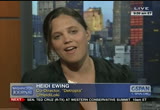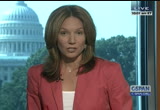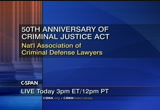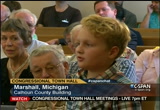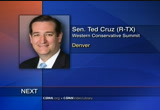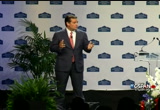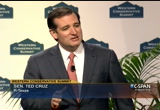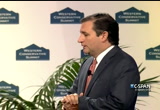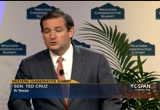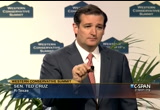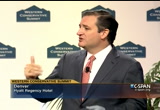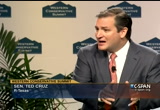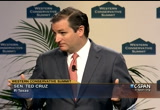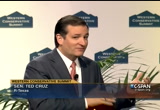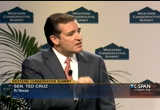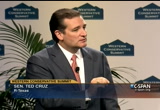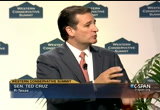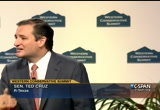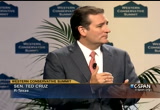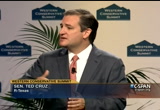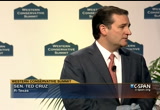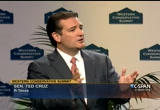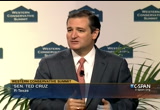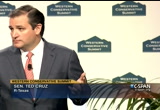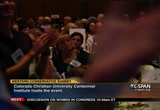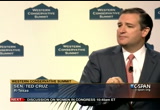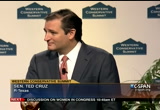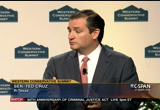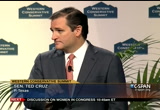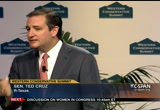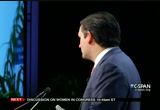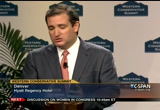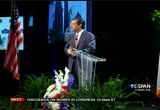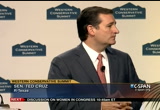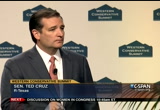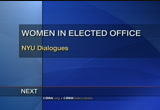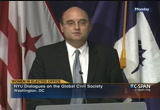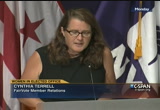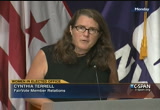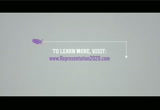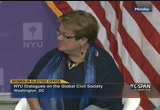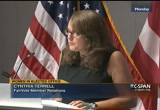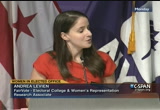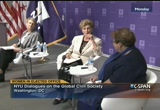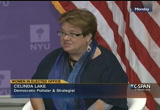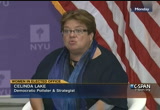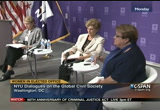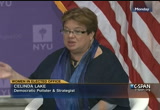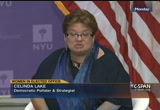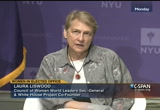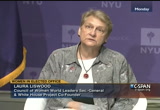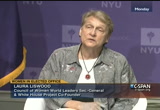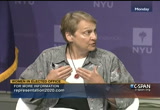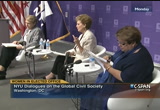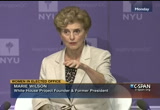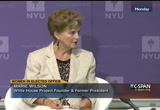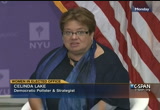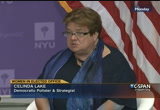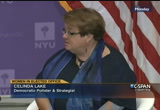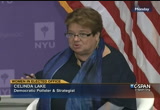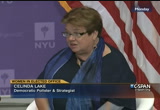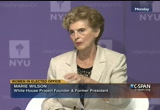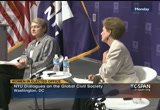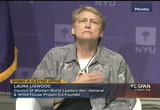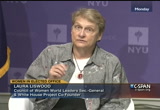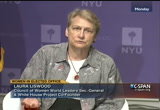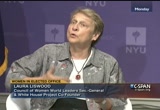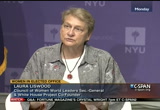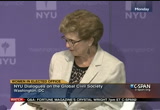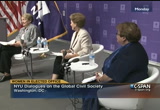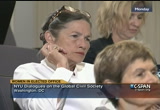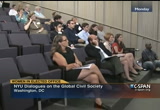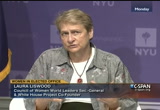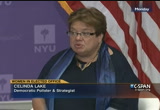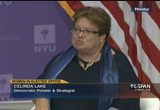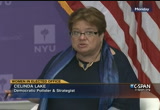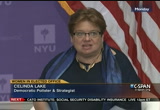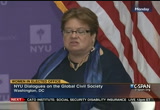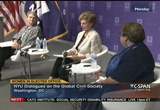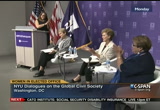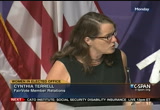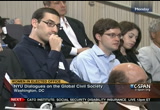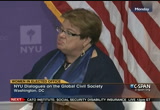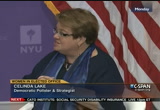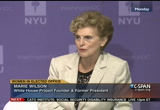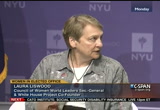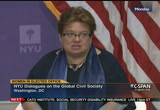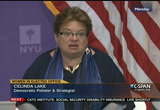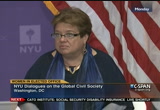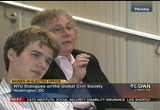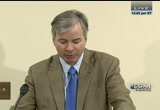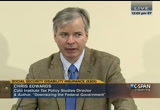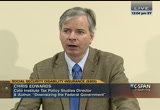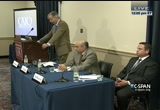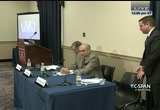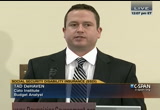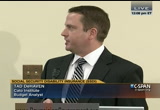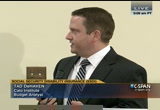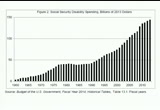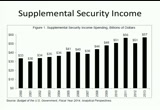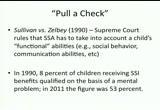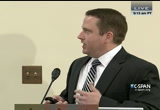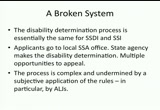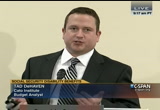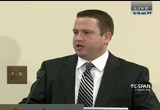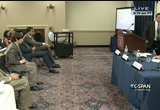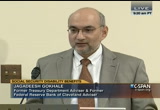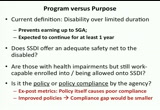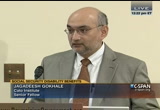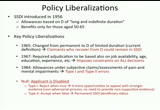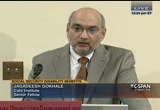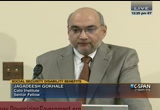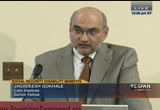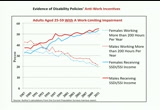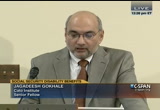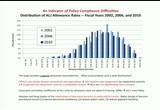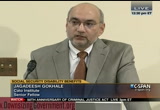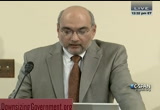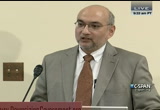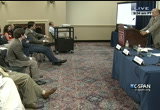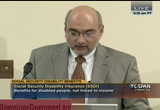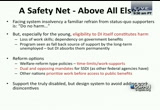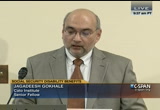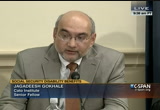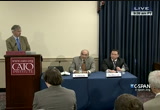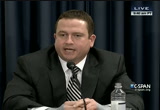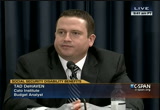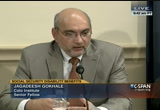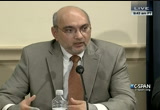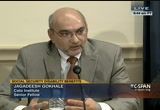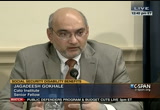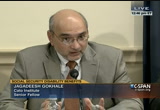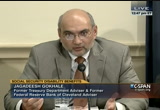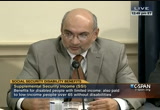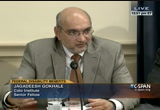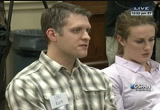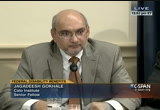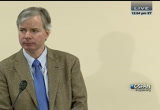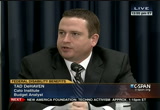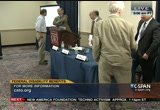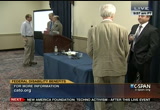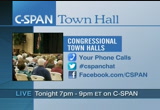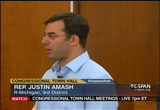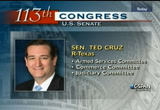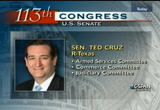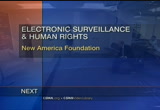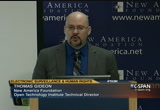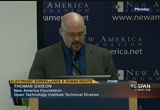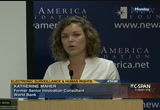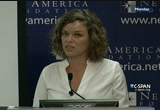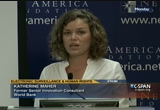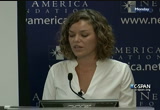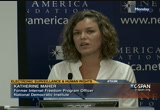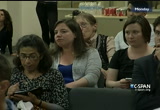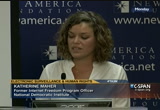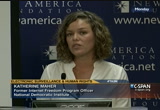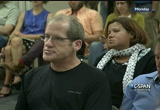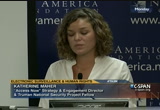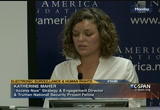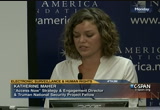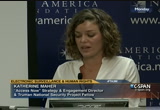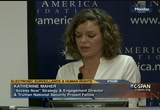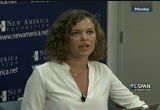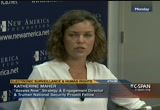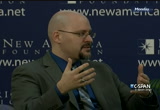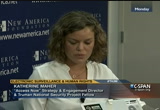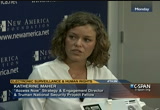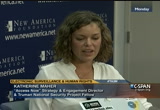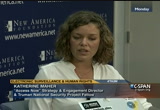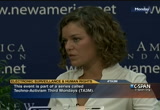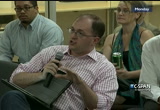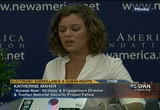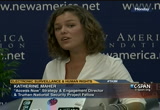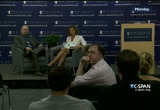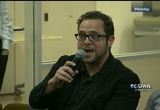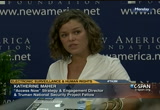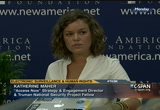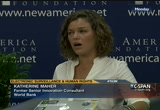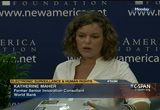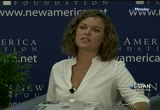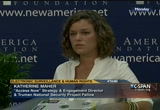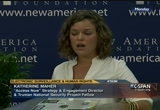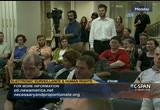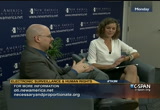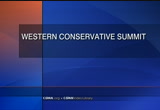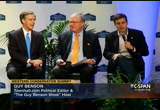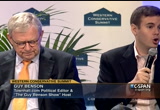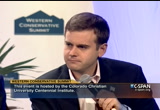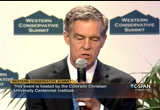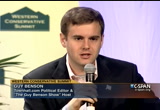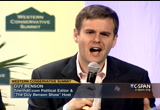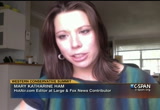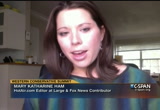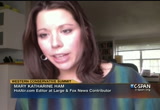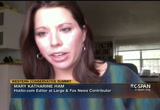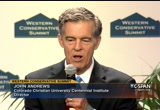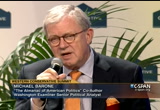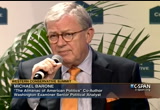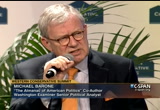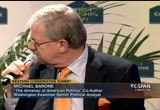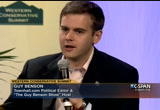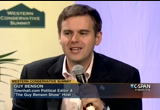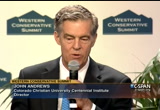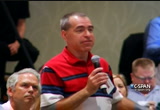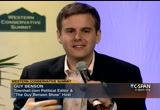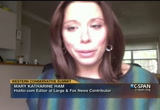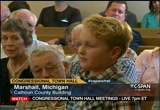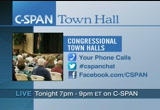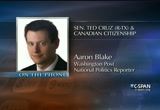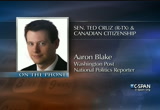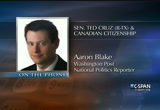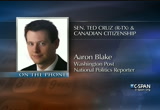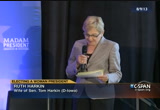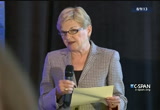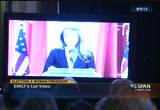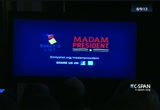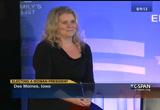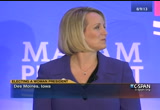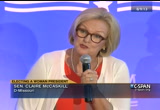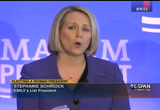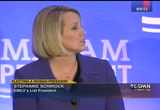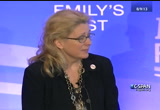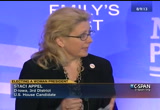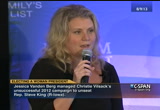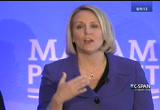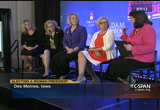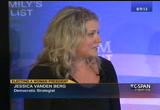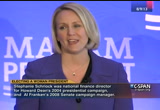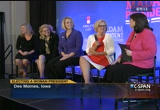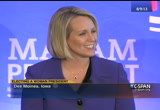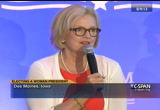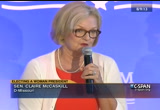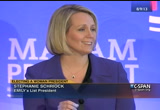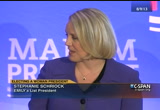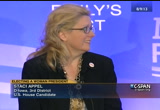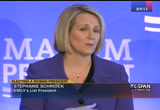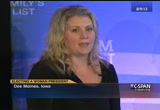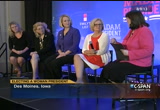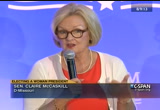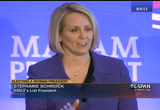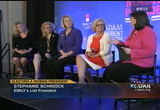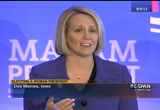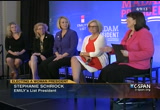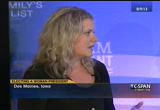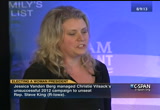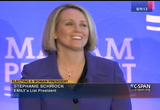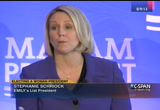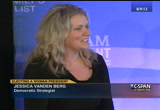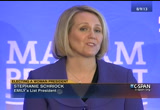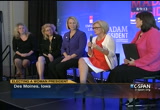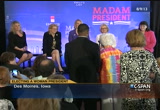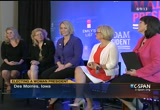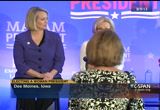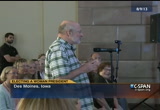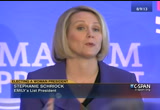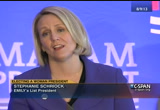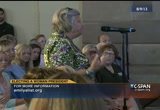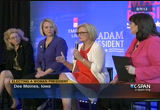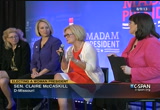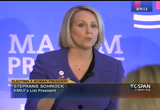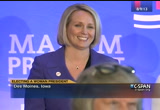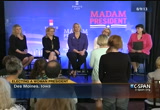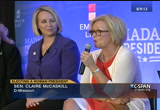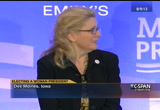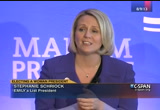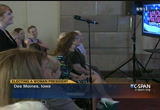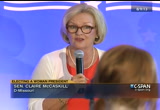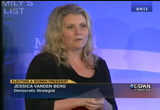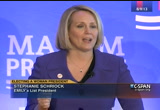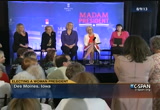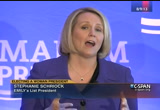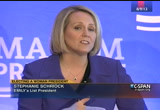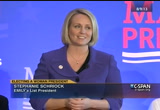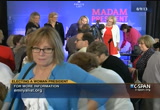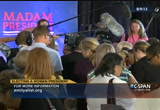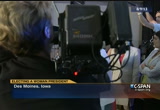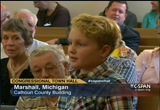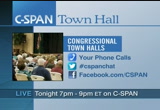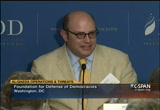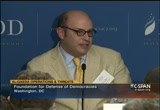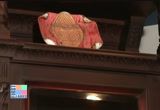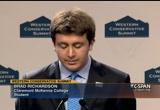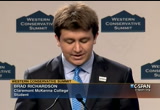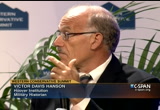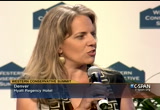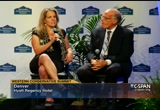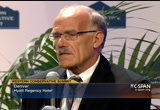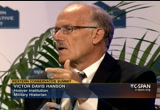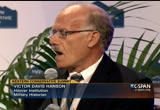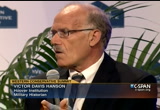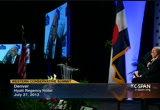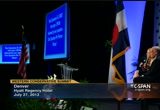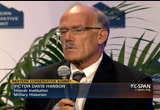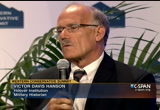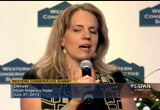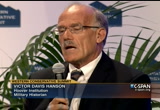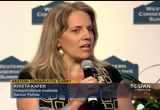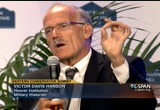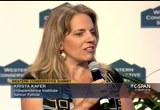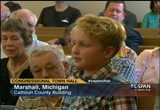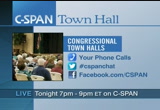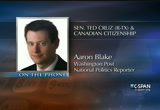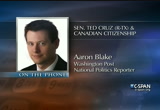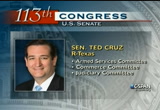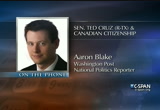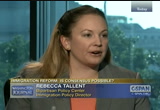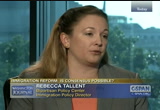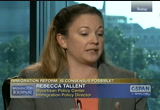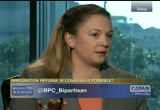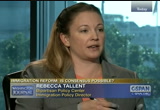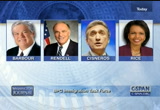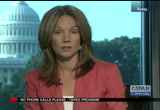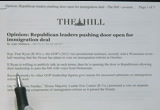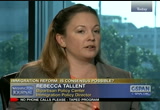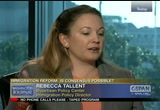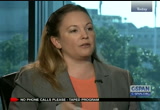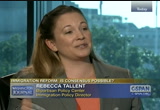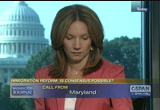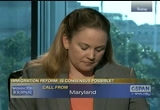tv U.S. House of Representatives CSPAN August 20, 2013 10:00am-5:01pm EDT
10:00 am
that there are opportunities, there is opportunity where there is chaos, where there is despair, and americans have surprises in the past with what they can do with a place that has been left for dead. it will be interesting to see what starts anew in detroit, because when something dies, something new does start. i do hope that there is some sort of slow rebirth that comes out of this absolute devastation. host: rachel grady? guest: i would say the answer to that is unclear. however, we keep hearing people say detroit has since appeared. there are 700,000 people living there. it seems like they are there to stay.
10:01 am
these people are going to stay , reinvention. it i hope it is a blue print in terms of how to be adjustable, how to be flexible. hopefully it is not a cautionary tale. we will find out over the next 10 years. thank you very much for your time this morning. we appreciate it. >> thank you. we will be back tomorrow 7:00 a.m. eastern time. inks for watching. [captioning performed by national captioning institute] [captions copyright national cable satellite corp. 2013]
10:02 am
>> we have some live programming to tell you about today. we will have this live on c- span starting at noon eastern. later, the focus will be the 50th anniversary of the criminal justice act. you'll be able to see that live at three clock the in eastern also here on c-span. our town hall series will continue later with of the town hall meetings held by members of congress. we will look at what
10:03 am
constituents are asking them. we'll ask see what interaction you have with your members of congress. this is also on twitter. justin recently held a town not in his district. he was asked about the data collection. he also got a question about same-sex marriage. i am also worried about all i'mgay rate stuff, like, feigning it could be another racism thing. it is the same thing but gays and non-gays and a big fight. who really cares? does it really matter? [applause] that is a great point.
10:04 am
i do not believe the government should the involved in deciding who should get married. that is not an appropriate role for the federal government or governments. marriage is a private institution between people and their personal lives. i'm an orthodox christian. my wife and i do not need the government telling as we need to get married. i agree with you. part of hisief recent town hall meeting. we will show you that entire event starting at 5:45 p.m. eastern. of egyptt the map here this morning, the situation remains fluid. the hills reporting the white house is denying reports that it had quietly suspended some military aid to egypt the mid-
10:05 am
mounting evidence as incorrect. tohave suspended assistance egypt. that is incorrect. the statement followed a story in the daily these yesterday that reported the u.s. government had decided to move ahead and halt some military assistance form -- from cairo. >> tonight. >> people at the time did not feel like this was appropriate formal china. some are scathing articles. they said art was absurd.
10:06 am
another said he was going to want to be eating this lovely meal and finish up their meet and see a deck or a giant frog? uck or a giant frog? we fell like this was a way to educate visiting dignitaries from foreign countries who may be were not familiar. >> the encore presentation of our series continues tonight at 9:00 eastern on c-span. join the conversation with the head of the rutherford b. hayes center. >> up next, senator ted cruz called for the abolishment of the irs and the repeal of the federal health care law. he has been looked at as a potential 2016 republican presidential candidate.
10:07 am
the annual summit hosted by colorado christian university. this is just over half an hour. ♪ >> thank you so very much. it is terrific to be back with so many friends and so many strong conservatives in the great state of colorado. i want to thank you for your leadership. i have to start with some somber news.
10:08 am
i am sorry to tell you that as a result of your being here, each of you tomorrow morning is going to be audited by the irs. i appreciate the courage of your convictions. i will say that this gathering is inspirational. what a tremendous slate of speakers you have had from scott walker, mike huckabee, allen west. i reminded of the time i was on an airplane. i was paged over the loudspeaker asking for tom cruise.
10:09 am
and somewhat sheepishly, i came to the front of the plane, and i said, maybe you might be looking for me. you have never seen so many disappointed flight attendants. i am humbled to be in the gathering of the terrific leaders here. like my friend jenny beth martin, and i am even more humbled to be in a gathering in this room, via satellite, online, and across the country with people standing up to take this country back. i want to talk briefly about the past, present, and the future. we are seeing a paradigm shift for how we are going to take this country back. i will cut to the quick. the answer is empowering the grassroots. men and women standing up to bring us back to our founding principles. talking about the past, i will tell you about my campaign for the u.s. senate in texas.
10:10 am
it started in january of 2011. i was at 2% in the polls. the margin of error was 3%. those were the real poll numbers. and we were thrilled. we went through a $50 million primary. the most expensive primary in the country. $35 million in nasty attack ads. after watching all of those ads, she turned to me and said, goodness gracious. i did not realize what a rotten guy you were. we saw something incredible happened. we saw thousands of men and women across texas come together. getting on facebook or twitter, enough already. we can't keep painting in pale pastels, we need to stand up and take this country back. what we saw was incredible.
10:11 am
starting from 2%, despite being outspent 3 to 1. we won the primary by 14 points and won the general by 16. [applause] what a tremendous testament to the power of the grassroots. throughout the campaign, the pundits all said in the senate race there was no way i could win. i traveled the state of texas saying they are absolutely right. it is beyond my capacity. but you can. the only way we will win is if conservatives come together and
10:12 am
demand something new. how do we turn things around? that paradigm shift is playing out right now in the u.s. senate and i believe it will play out in the future for how we turn this country around. there are two things that we need to do to restore this nation. stand for principle. champion growth and opportunity. [applause] let's talk about standing for principle. one of the first things i was privileged to do serving in the u.s. senate was stand side-by- side with my friend rand paul participating in a 13-our filibuster on drones. [applause] when that started, he went to the senate floor. many of my colleagues viewed what he was doing as strange, curious, if not quixotic. the first two to show up to support him were mike lee and i. what happened over the next
10:13 am
several hours was incredible. the american people became fixated by c-span. a phrase that does not occur naturally in the english language. my apologies to our friends from c-span who are with us today. thousands of americans began going online, standing up and saying, we need to protect our liberties. and it was incredible. as the american people got motivated, you saw one senator after another. the staff were running in saying that the tweeting things as you have to go out there. -- things says that you have to go out there. i did not know they knew where the senate floor was.
10:14 am
and because the american people got engaged, we saw something incredible. in 24 hours, public opinion polls on drones moved 15 points. and because the american people stood up and demanded action, president obama was forced to do what he refused to do for three consecutive weeks, to admit that the constitution limits his ability to target u.s. citizens. that was a tremendous victory for the grassroots. and it was a harbinger of things
10:15 am
to come. the next big fight in washington was over guns. i am confident no one in here is concerned about the second amendment right to keep and bear arms. on this issue, vice president joe biden -- the nice thing is that you don't need a punchline. [applause] you simply say his name and people naturally laugh. but vice president joe biden had some advice for all of us. if somebody is attacking your home, just go outside with a double barrel shotgun and fire both arrows into the air. which is very good advice. if it happens you're being attacked by a flock of geese. on guns, following the horrific tragedy in newtown, president obama came out saying, not
10:16 am
let's go come down on the violent criminals like a ton of bricks. but instead, the president said, we will use this as an excuse to go after the constitutional rights of law- abiding citizens. in washington, the momentum was entirely with the president on this. conventional wisdom was that this was unstoppable. and i will tell you that three senators signed a very simple
10:17 am
and short note to hear he read that said we will -- harry reid that said we will filibuster anything that prohibits our right to bear arms. [applause] the important thing was not the letter or the filibuster. it was that doing so slowed things down and focused attention on those who were going along with this agenda to strip our constitutional rights herein and what happened in the next several weeks is that the american people engaged. you got on the phone and call your senators. these guys are fighting for the second amendment, what's wrong with you? it is powerful when an elected representative starts getting thousands of calls from his or her constituents saying to stand up and defend our constitutional rights. the american people lit up the phones, and stood together.
10:18 am
one after another came back and when he came to the floor of the senate repaired to gavel in his story gun control legislation, every single proposal that would have undermined the second amendment was voted down on the floor of the senate. [applause] that was your victory. it was the power of the grassroots. it is how we win, i forcing the elected officials to be accountable and do the right thing. going forward in the future, what do we need to do? we need to champion growth and opportunity. my very top priority is restoring economic growth. it is the foundation of every other challenge we've got. whether it is unemployment, the national debt, maintaining the strongest military in the world.
10:19 am
without growth, we can't accomplish anything. and with growth, each of those will be accomplished. the last four years, our economy has grown 0.9% a year. the last time of four consecutive years was 1979 to 1982. coming out of the jimmy carter administration, the same failed economic policy of taxes and regulations that produced the exact same stagnation. in my view, restoring growth should be the top priority for
10:20 am
every elected official, republican or democrat. and how do we do that. there are three priorities that are critical to restoring growth. raining in the out-of-control spending and unsustainable debt in washington. last fall, i had the privilege of speaking at the republican national convention in tampa and i talked about the national debt and i talked about our little girls. i went back to my hotel room that night and pulled out my phone again to look at twitter. it turned out that paula poundstone, the comedian, had been watching the convention that right rejig -- that night. she sent a tweet and said that ted cruz just said when his daughter was born, the national debt was $10 trillion. now it is $16 trillion. what did she do?
10:21 am
we laughed so hard, she almost fell out of bed. our daughter is five. in her short life, our national debt has grown over 60%. what we are doing right now i think is fundamentally immoral. [applause] our parents did not do that to us. their parents did not do that to them. we are giving our kids and grandkids a debt burden that they will work their entire life not to meet the challenges of
10:22 am
the future, but to pay off the debt that the parents and grandparents were too irresponsible to live within our means. that is just wrong. the second critical element is fundamental tax reform. [applause] every year, we spend roughly $500 billion. all of that is dead weight loss. it does not produce a single truck or tortilla. we need to dramatically simplify the tax code. we have seen in recent months the perils of too much power in washington as the irs has targeted citizens. targeting those perceived to be enemies of the obama administration. when richard nixon tried to use the irs, it was wrong.
10:23 am
and it was rightfully decried in a bipartisan manner. when the obama administration did the same thing, it was every bit as wrong. we have heard reports of the irs asking citizen groups, tell us the content, tell us what books you are reading. another group was asked to tell us the content of your prayers. the u.s. government has no business whatsoever asking any american the content of our prayers. [applause] that was an abuse of power and
10:24 am
we need to investigate it and get to the bottom of it. the simplest and best solution to this problem, we need to abolish the irs. [applause] listen, that is not going to be easy. in washington, there have been an army of that make their living getting exemptions from the irs tax code. there are more words in the tax code than there are in the bible. and not one of them is as good. how many of you all know the shortest scripture in the bible? there has been a whole lot of weeping because of the irs.
10:25 am
the only way that we will succeed abolishing the irs is if we follow the same model we were talking about before. if americans come together in overwhelming numbers and demand of our elected officials, enough already. stop listening to the established powers in both parties, start listening to the american people. the third critical step to restoring economic growth is fundamental regulatory reform. in the last five years, regulators from washington have descended on small businesses and entrepreneurs like locusts. the only problem is, you can't use pesticide against the regulators.
10:26 am
we need to unleash small businesses, entrepreneurs, free americans to achieve the american dream. [applause] and there is no regulatory reform that is more important than we need to repeal every single word of obama care. [applause] i am going to be honest with you. i am here asking for your help a cousin we have a moment in time. i think our last and best moment
10:27 am
in time to actually beat obama care. the house of representatives voted 39, 40, 41 times. every one of those was symbolic that had no chance of ever passing. we have 60 days to, in fact, defund obamacare. let me explain why. the continuing resolution that funds the federal government expires. i have publicly pledged along with mike lee, marco rubio, rand paul, and others that i will not vote for any continuing resolution that funds one penny of obama care. [applause] now this is a fight that i believe we can win. we need to either get 41 republicans in the senate or 200 and 18 republicans in the house
10:28 am
to stand strong. the house of representatives would pass a continuing resolution that funds the entire federal government except for obama care and would explicitly prohibit spending federal dollars. we know what would happen next. harry reid and barack obama would scream that the evil and nasty republicans are trying to shut down the federal government. and that is where we need to come back and say, we have funded the federal government.
10:29 am
why is barack obama threatening to shut down the entire government in order to force obama care on the american people? the lead author of obama care, senator max baucus has described it as a huge train wreck. the president of the teamsters, james hoffa, said it is destroying the 40 hour workweek that is the foundation of the american middle class. just a few weeks ago, president obama unilaterally delay the employer mandate for big companies until after the next election. there are two important concessions president obama made in doing that. if it were a good thing, if it were working and the wheels were not coming off, wouldn't he wanted to kick in before the next election? what does that say when they are so scared of electoral accountability because of the disaster this bill is that they want to move it until after the american people have a chance to vote. but secondly, why is he wanting to give an exemption for big corporations?
10:30 am
and not give the same exemption for hard-working american families? the reason that we need your help, right now we don't have the votes. we are not even close. a lot of republicans are terrified of doing this. they are terrified of the media criticizing them, the democrats criticizing them, and being blamed for threatening a shut down. on january 1, the exchanges kick in and the subsidies kick in. it will prove almost impossible to undo obama care. the administration's plans are very simple.
10:31 am
get everyone addicted to the sugar so that it remains a permanent teacher of our society. there is only one way we are going to get 41 republicans in the senate or 200 and 18 republicans to do this. if they hear from the american people in overwhelming numbers. a national petition was launched and i will ask each of you to write this down. don't find it dot com. dontfundit.com. there are people attending this seminar in person and in arizona. go to the website and sign that petition. and i will ask you to do more than that. i will ask each of you to find nine other people to do the same. if we do that, 2000 becomes 20,000. and if each of those 20,000 people pick up the phone and call your member of congress and say, stand for principle, do not vote to fund obama care.
10:32 am
that is how we win this fight. no politician in washington can win this fight. only you can win this fight. [applause] why does growth matter so much? it is the foundation to opportunity. for a long time, i have argued for opportunity conservatives, that every principle we articulate we advocate should focus on a laser on opportunity and easing the means of ascent up the economic ladder. to impact the least well-off among us. the dirty secret the media will never tell you is that the people who have been hurt the
10:33 am
most by the obama economy are the most vulnerable among us. they are hispanics, african- americans, single moms. unemployment climbed to nearly 10%. young people aged 16 to 19, over 25%. when you hammer small business with 1.7 trillion dollars in new taxes with massive regulations, the ceos don't get hurt. if you were flying in a private jet, you still are today. the people that get hurt by the obama economy are those just starting to climb the economic ladder. they are the ones that get laid off and have their hours forcibly reduced. i read on the floor a newspaper article out of oklahoma. not a single mom had their hours forcibly reduced to 29 hours a
10:34 am
week. and with the single mom said, i have little kids at home. i can't feed my kids on 29 hours a week and neither can the other single moms working here. obama care is doing this to us and it is not working. we need to be championing the people because the greatest engine for prosperity and opportunity the country has ever seen is the free-market system in the united states of america. [applause] i am working every day to try to help carry that free-market message and try to help when the argument. how many of you have phones on you? take out your phones and text the word growth to 33733. text "growth" to 33733. we are working to try to build a
10:35 am
conservative army across this country that will stand up and fight to bring us back to our free-market principles, bring us back to our constitutional liberties, and the only way we can do it is to bring together millions of conservatives across the country. freedom is not some abstract academic concept. it is something we know in our own lives. in my life, my dad was born in cuba. he was imprisoned and tortured, almost beaten to death. he fled in 1957, fleeing the batista regime. he was 18 and could not speak a word of english.
10:36 am
nothing but $100 in his underwear. i don't advise carrying money in your underwear. he washed dishes to pay his way to the university of texas. he went on to start a small business, to work words the american dream. my dad used to say to me over and over again, and we faced depression in cuba, i had a place to sleep. if we lose our freedom here, where do we go? there is no place to go. that is why you are here and you are not with your families relaxing. you are standing up to say that we will not let go of this mighty nation. my dad has been my hero my whole life. everyone of us has a story just like that. we are all the children of those
10:37 am
that risk everything for freedom. i will tell you in closing, i am so inspired to be with you today because we are fighting to hold on to that incredible legacy. the legacy they gave to us. not a single man or woman is content to see the world ronald reagan talked about where if we don't stand up and preserve our liberty, we may have to answer our grandchildren who ask, what was it like? when america was free? that is why we are here. we are not willing to answer that question or go quietly into
10:38 am
the night. i am honored to stand shoulder to shoulder with each of you as we fight to restore and preserve the shining city on a hill. thank you and god bless you. [applause] coming up live at noon eastern, we will examine social security disability insurance costs. that is happening on capitol hill. it will be live here on c-span starting at noon houston. later the focus will be the 50th anniversary of the criminal justice act. be able to see a life starting at 3:00 p.m. eastern here on c-span. that theis reporting u.s. has temporarily suspended much of its aid to egypt. the center's office confirmed that. coup,e then calling it a to
10:39 am
cutting offama is most direct military aid. we spoke earlier today with the reporter who broke the story. arehe administration disputing the term "suspended." they're saying it is under review and no final decisions have been made. that is true. none have been made. while that time, review was going on, it has been suspended. out of one point $3 billion in military aid to the egyptian government,-to 85 billion. -- 585 lien dollars has not been delivered. that is financing money that is
10:40 am
not slowing. most people see that as a suspension. will say weration are not giving it out. we are also talking about delivery of some military items including some apache helicopters. then we are talking about economic support. the ones that will directly benefit the government are not being dispersed. they are being suspended. a couple of items are flowing. support funds. there are not not really that many american ngos doing this.
10:41 am
>> since that interview this morning, caitlin hayden responded in a statement saying the report is incorrect. the president has said that we are reviewing all of our assistance to egypt. no policy decisions have been made. we will keep our eyes on the story. we will bring you updates as we get them. on c-span's encore presentation of "first ladies." >> one of our most controversial collections is the white house china. it was controversial at the time and remained controversial because of the pattern. people did not feel like this was appropriate formal china. even some of the journalists wrote scathing articles about this china. one said the art was absurd. another was written that said who is owing to want to be eating this lovely meal and started understood their meet and see a duck or a giant
10:42 am
frog? people at the time did not think this was appropriate china to have at a presidential dinner. we fell like this was a way to help the foreign dignitaries. >> the encore presentation of our original series continues tonight at 9:00 eastern. >> join the conversation with the head of the residential center. >> the u.s. reigned 92nd internationally for the percentage of women in congress. nyu dialogues posted this release last monday.
10:43 am
>> i think we are going to begin. all right. can everyone hear me ok? ofm the executive director fair vote. this is our fourth in the democracy next four and we have been pleased to do with in way -- with nyu dialogue. newest global site. may know, this is the fourth event in our series. we are posting all of the previous forms at democracy
10:44 am
next.com. this is being live streamed. we are also being joined by c- span today. you can see every form that has taken place and those that will keep going in the feature. time soeen an exciting far. today is a particularly poor topic or a spirit it is about something at the heart of our democracy, their representation. topic. it is something at the heart of our democracy and representation. cap he is the chair of representation 2020 -- cathy is the chair of representation 2020. >> thank you for coming. my name is cynthia.
10:45 am
i am on the board and also on the staff. i am also the new chair of our representation 2020 project that seeks to broaden measures to increase the number of women in elected office by acknowledging the fabulous work that is being done by groups and individuals and highlight the areas of structural changes that weeping demand more attention. the first is encouraging political parties to recruit more women to office. third is for advocating for electoral systems that allow more women to win in the first place. before joining the team, i worked for many years on campaigns or state and local offices. i learned firsthand the challenges that particularly s face.andidate
10:46 am
securing the proper nomination papers and so forth. these stemarned that not only from societal norms and stereotypes but also from the basic structure of our voting system itself. we will talk more about that in a minute. it did not take long for us to realize that the best way to honor the decades long struggle for suffrage was an energized push for representation. our motto was born. , we sought funding, created a website, formed a leadership circle, fashioned a six-point representation 2020 pledge in decided to re-released every report.
10:47 am
we are going to release that reports on the anniversary of the ratification and passes of the amendment. we are at a great time. sunday was the anniversary of 93rd ratification when tennessee became the final state to be ay for suffrage legitimate reality for women. on monday we support women's equality which acknowledges the transformation were half the population was able to join the .orld as suffering citizens reports to on this highlight the best practices and how to get more women elected in this country. we are also doing a little fun media work. we have a video that will show
10:48 am
this. [video clip] >> in america there is a big gap. more women in office. men hold 82% of the seats in the house of representatives. a decade ago our nation right behind it the seven nations for the or send it of women in congress. today we are 92nd. after 50 governors, just i are women. the same percentage of number of women mayors and our largest cities. out of more than 700,000 legislatures, fewer than one in four is women. that is barely higher than it was two decades ago. women will be under represented for another 500 years at this rate. a century ago there was a struggle and the common native
10:49 am
in the 19 amendment to the constitution. inspired by that struggle, representation 2020 takes on this challenge. we must have parity for women in office. that will happen when a woman is just as likely to win as a man and in any given the station will be just as likely to hold the seats. it is not enough. it is time for a vision and new approaches. our vision is simple. let's not settle for anything less than parity. support the full spectrum of activity. representation 2020 advocates for structural solutions to the problem. parties should pass rules that institutionalize the commitment
10:50 am
to recruiting and nominating more women. should have more policies. our elections need to be more inclusive. we should change the rules so we have more than one representative. multimember districts elect more women. more than half of their voters today are represented i a woman. we see fair representation voting rules that will get everyone a chance to elect their favorite candidate. that is democracy and what america is all about. but let our values. join us in celebrating a series of suffrage. 2020.com andentation help make history. [applause] i think marie just did a
10:51 am
terrific job. thank you so much. you should stand up. give her a standing ovation. bravo. ofkeeping with our goal deepening the conversation, we have a terrific panel. we're are so grateful that all of you are here. we are going to be talking about this reports in three sections. patricia and andrea are going to be presenting each part of the report and our panelists will have a chance to respond to the specifics of that section. let me introduce our panel. moderated by the famous marie wilson. she's also the former president and founder of the white house project that advocates for women's leadership positions and ultimately for the presidency. in addition to conducting significant research, she is
10:52 am
the cocreator of takes our daughters and sons to work day which started in 1993. she treated the marie c wilson leadership fund in honor of her achievements. she has the distinction of being the first woman elected to the des moines city council as a member of large in 1983. joining her is one of the democratic party's leading political strategist and one of the nation's foremost experts on electing women candidate and framing issues to women voters. been called a super strategist, the godfather. working woman says she is arguably the most influential women in her field. she is renowned for her round
10:53 am
breaking research on single women voters. mangini --ped elect numerous female candidates. she also worked for nancy pelosi, the first female speaker of the house. in 2005 she published what women really want. i am pleased to say that we invited kelly to join us. i think she might have been here but a scheduling conflict prevented her for attending. we are glad for her interest in this topic as well. the secretary-general of the women world leaders, the work expands leadership, establishes women leaders and provides a to shape the international issues.
10:54 am
in 1997, she cofounded the white house project. for the the inspiration project that changed the cultural message in the united states and leaders. as rector of the leadership project, she identified global leadership hundred fusion's from women heads of states. she interviewed many that is documented in her book. her latest book "the loudest duck" uses antidotes to examine the challenges to traditional workplace diversity efforts and provides strategies to provide truly effective workplaces for all. joining us for the important work of training and candidates, we
10:55 am
are very glad that she is with us today. now it is my pleasure to ion who isandrea levy an the chief coordinator extraordinary. thank you for being here. [applause] >> hi. i am a research associate at fair votes. we wanted to look at this in two ways. he first was what is the state of women's representation in the united states and how far away we are from parity and let at improvehat could help the representation of women in government. i'm going to tell you how far away we are from parity. we currently ring 92nd in the world.
10:56 am
right now there are only five women governors out of our 50 state route 24 states have never elected a woman governor. 22% of state elected executive officials were women. we are now 1% higher. right after the year of the woman about 20% of state legislatures were women. now we are at 24%. right now we only have 20% women senators and 18% women congressman. would clearly have a long way to go. i think what i would like to start is why do you think we are at this stagnating level of women's representation over the last 20 or so years? what do you think are the main things we need to do to improve? >> i'm so delighted that you started this.
10:57 am
>> why do we think that? we have worked together on this issue. se have heard these fact unfortunately for many years. it is very hard for all three of us to try to explain to people what is holding the united states back and why do we rank are we still in this place. ? the year of the women became the year of our downfall. they're not increased number the number of women in state legislatures since then. i think i will start with you. you have been doing research on this for so many years and know all of what is behind the stagnation of democracy. >> it is a really interesting question.
10:58 am
there are so many things we could just do an hour on. andreport is excellent answering questions in terms of structural features, recruitment problems. three basic barrier to women. one is there's not enough room. we have very interesting data on party recruitment. some of the most vivid data we did a study wants of men and women in the pipeline, heads of organizations, people who'll or chamber of commerce members, ivy league graduates. 73% said someone has always saying you should run for office. no one haswomen said ever said to me that you should run for office. out of that came a lot of effort in terms of really getting in to the effort in
10:59 am
terms of women. even with the efforts there is still a lot in our society that reinforces the impression of every delegate to look in the mirror and see a u.s. senator and a president. they see themselves run a nonprofit. they're doing something that would be more valuable than politics. the second thing i think we have is some of the structural features. women can raise money. the problem is they do not want to. they do not want to spend their time doing this. they want to raise money for the safe house in the neighborhood or the girls club. they do not want to raise money to run for office.
11:00 am
we now dominate the purchase of everything. we are even 51% of technology purposes -- purchases. we are the vast majority of charitable contributions. ofare less than half political contributions. women do not by politics. even when women write a check they usually write it at the half of the size of men. women candidates did not have the money networks. women cabinets do not have the money. the committee of man is always high finance lawyers. women have the head of the united way and their high school reunion. they do not have money networks.
11:01 am
a new study said that the number one thing they need is not just training, but networking even more than training. they know how to raise money. they just do not have the rolodexes to raise it from. there is a third factor. that is the combination of family and running. the data that is reported reveals some really astounding data, in terms of men with young children running, women with young children not running. we marked the history of a woman running in new york city and delivering a baby while she is running. good of her, but brave of her. when voters see a man with young children, they never have any question about whether he will be able to take care of the job and the kid. with a woman, they go, who is going to take care of the kid? what is the kids have a crisis? who is going to take care of the
11:02 am
state? more questions asked by women, how would i manage this with my family, and asked i voters -- how would i manage this with a family. voters have a great appetite for women. i have an appetite for change. it is a smart point that you made. also the beginning of our decline, because women do not represent the same amount of change they used to represent. even though we are still in paltry numbers, voters go, we have sarah palin and hillary clinton. i am not going to vote for a woman just because she is a woman. for everyoneckel one who has said in a poll -- people in survey gropes go, i will vote for a woman if she is qualified. nobody ever says, i will vote for a man if he is qualified.
11:03 am
the man have done such a bang up job, you can understand why nobody questions their qualifications. what are voters putting in that package, "qualified"? how do women overcome the double bind of being the change agent, but qualified enough for the job? >> that about covers it will stop -- covers it. [laughter] >> what she said. clearly, some of the things linda is talking about our actors in this, what i call the headwinds and the tailwinds. the fact is that this double- blind issue you are talking aret, which is how women perceived as leaders versus how men are perceived as leaders -- the whole issue of likability versus leadership. for a man, if he shows a search of leadership, he can be
11:04 am
considered likable. if a woman shows assertive leadership, she will not be considered likable. if she is likable, she is not a leader. assertive man invades small countries. assertive women put you on hold on the telephone. we have this double bind. what is being looked at extensively. some of the issues the report looks at in gender stereotypes does that. as you look around the world, structural issues are critical. that is why this project is so important. it invariably, the systems you look at in other countries, where there are more women heads of state and government, are the structural issues. clearly, we have a high hurdle on that, to change these into multi-member district. unthinkablefrom the
11:05 am
to the inevitable. we are just trying to push this along a little bit all stop what is interesting for me, dealing with the corporate world -- five percent women governors. of fortune 500 companies. the terra low between what happens with women in business and in the political sphere. family issues and work life balance issues -- that is a big point of it. another big point of why women do not become ceo's and governors is the networking. men have broad and shallow networks, and women have narrow and deep networks. if you are trying to raise money, you need a broad network of people to raise money. in addition, the size of family- friendly issues and the networking are the opportunities to have leadership roles. in the case of the prophet world, the prophet and operational roles.
11:06 am
often, women do not get to those types of operational roles. there are gender stereotypes that exist about who should be doing these kinds of things. you were referencing those. my new book is called the seed and the soil. the soil is the institutional elements of this thing. the seed is the individual elements of it. both are at play in these issues. can we -- i think they good effort is -- can we get to structural issues? can we get people to understand that changing the structures are going to help change, for the better, our democracies and the outcomes of our democracies? as he reflected, our outcomes do not look so good right now.
11:07 am
can we make that argument? -- people these change for three reasons only. fear, self-interest, or vision. how we play these three elements -- if we keep going down this road, we are going to have some disasters. gain there a way we can from these changes that are needed, so we are closer to parity? i do want to say that which happens to women in this these dynamics have happened to other historically underrepresented groups. it is important to understand these dynamics are not just hitting women. they are hitting other underrepresented books -- underrepresented groups also. that is hurting our democracy. >> all of that is true. the numbers -- it is so important. people in this country believe we are in power, by the way. you cannot say these numbers
11:08 am
often enough. you cannot say enough of them. just getting a report out again and saying, guess what, we have not made it, in terms of these numbers. for the white house project, we used to go into states and say, we want to train your women. how many are you training? 12 a year. we need programs training thousands of women. i want to say that any audience you have, this is what you can do. i have been doing this a while and have magic power. if you have heard this presentation today, and in the next 24 hours, you do not call a woman who you think might be -- think about this. you know people who should do this. if you do not do it, i can promise you i am magic and something awful will happen to you. that is the threat.
11:09 am
moving from the threat on to the wet thread, i think probably should get pamela to come up here. patricia. excuse me. it is good when you know the names. patricia has also done an amazing job for this project. >> my name is patricia. [laughter] patricia hart. i just want to say that in the last several decades, women have made great strides entering political office, but there is still a long way to go. littleto tell you all a bit about my personal first political experience. grade school. i was sitting on the carpet in my power ranger sneakers. the president of the united states was on television. it was bill clinton at the time. i saw a man. he had white hair. he seemed very important. but i was not fixated on that
11:10 am
person. i was interested in the woman standing to his left and a little bit hind him. she looked like my mother and my teacher. she looked more like me. over a decade later, when i was in college, she was running for the presidency herself. that was hillary clinton. delegates thatt any other woman candidate has gotten for a presidential nomination. and that is progress. but we still have a lot of progress to make. organizations are doing incredible work. training, recruiting, and funding women candidates. they are leveling the playing field, as far as funding goes. they are making women feel that they can run for office. right now, women and men with the same credentials -- women are actually half as likely as they arelieve that very qualified to run for office.
11:11 am
as women are twice as likely men to see themselves as very unqualified to run for office. these are people who come from the same pool. they have the same credentials. that is something we really need to change. i want to introduce somebody who is doing great work on this topic, beth mcintosh. she worked for emily's list, and she is the communications director. she will give us a little more information on this, and then we will turn it over to our panel, which is done lots of work on training and recruiting women. >> thank you guys for having me here today. it is always so exciting to be in a room full of smart and strong women who are working on promoting women at large. my name is jess mcintosh. i am a proud nyu grad. i am the communications director at emily's list, the largest resource for women in politics. we recruit and train and support pro-choice democratic women, up
11:12 am
and down the ballot. but i am going to take off my bipartisan hat and talk about the need to be better represented at every level of government in both parties. ifwill never reach parity just one party is pulling their weight. i am hoping we can have a great conversation about moving forward. one of the great things about working at emily's list is the way we have approached structural problems throughout our organization history. tohave identified what seems be the biggest obstacle in the way of having more women in office, and we have attacked that one. we started 28 years ago. in 1985, there was not a single democratic woman elected to the senate in her own right all stop not one. a had mtv before we had democratic senator elected in her own right. i want that to sink in a little bit. we are talking about recent, recent history. hardars ago, it was really for a woman to get taken seriously as a candidate.
11:13 am
that meant no consultants, no party support, no money. vicious circles work. without money, one cannot be considered a viable candidate. and one cannot be considered a viable candidate without money. a number of women brought their rolodexes. they talked to their friends. they asked their friends to contribute to the cause of putting more women in office. they figured out a solution, which was, they wrote the checks themselves. a yearirst success was later, with the election of senator barbara mikulski, on of the most prominent voices in making sure women are following her backup that letter, it is exactly what we need. we have a lot of good women in office doing that now. we identified that women needed strong campaigns. men have been networking since the dawn of time, but at least since the dawn of the republic. abouthave really only had
11:14 am
50 years, 40, 30, to talk to each other about how to get ahead professionally. what are best practices? what are best practices for women? what does that look like? we can talk about mentorship programs, and that is being discussed here, which is fabulous. but we needed to be able to tell women considering a run for office what they needed to do first. how can they assess their particular race? figure out what advice we can give in terms of hiring a strong staff, eldon a plan. there is actually a playbook, and we wanted to make sure we could share it with the ladies. thisnk the third piece -- is representative of a lot of progress. we saw sad statistics up there, but there are things to be optimistic about. the initial problems i identified in 1985 do not exist anymore. m accredit women are considered viable candidates. hardee's and consultants are happy to work with them.
11:15 am
-- parties and consultants are happy to work for them. voters will turn out for them. the problem now is, not enough women are running. we have to talk about recruitment. women are less likely to identify as qualified. allows me to talk about my favorite statistic. lawless asked a group of men and women to self identify as unqualified to run for office. among the man, more than -- men, more than half of them self identified as unqualified would still consider a run. women's brains do not work that way. we are typically qualified and do a good job. the downside is, a lot of us do not take the first step. we developed a political opportunity program which goes into communities and recruits fabulous women who ought to have been asked seven and eight and nine times to run for office,
11:16 am
and simply have not. we will find women who are partners at their law firm. they are on the pta. they raised all the money for the expansion of the children's hospital wing. they teach sunday school. have you considered running for office? why, no. if this was a man, everyone would have been telling him to run. particularly focuses on communities of color, which is important. we are talking about training thousands, not 12. it is a burly operation, because this is a burly job. we target open seats, which is specifically important. run fore more likely to a seat when it is open and they are not challenging an incumbent. look's list takes a hard at what seats are coming up. where are people term limited?
11:17 am
where are people retired? we want to make sure that everywhere there is an open seat, there are women stepping up to run. we will not ever have more governors unless we have more mayors. we have to build that pipeline, moving all the way up all stop the final piece is women voters. we have a program where we target women voters. we researched them. we find out what they want, what they are doing, what is motivating them this year. they our best to make sure make it to the polls. when women vote, women win. in 2012, we saw a historic gender gap favoring democrats. women voted on the half of women and families. when they turned out to vote, they voted a lot of women into office. i want to make sure we are capitalizing on that enthusiasm, that we are continuing this conversation, talking about what it means. towardt even be hinting
11:18 am
2016, the need for a first woman president. inre is a lot out there, terms of people who want to see more women in office. i am thrilled that so many people are having that conversation. things you for allowing me to be part of it today. >> it is really hard to have been one of those first women. i feel older than i know i am. but there is a lot of history here. of what we are talking about in this report has to do with how we fuel women's political ambition, how we look at how the media treats women, the kind of stuff that still goes on, which punches that ambition down. nobody knows more about that menu. if anybody were to run for office, they would say, give me three inches today. >> that is very generous.
11:19 am
thank you very much. beenpresentation has fabulous, and the study as well. pieces -- and icd niece, who is the head of the women's vote project, which is a real passion of mine. i think you laid it out very well. i would say, because kelly and is not here -- one thing i would add to the often -- just was careful in her language, saying it was a good year for us. it was a good year for democrats. it was not a good year for republican women. one of the challenges we face is, when you have someone of the stature of olympia snowe deciding not to run because of what she will face in her primary as a woman and as a moderate, i think we all lose. one of the things we have really seen is that thanks to emily's list and a number of other forces, we have a lot of
11:20 am
recruitment going on on the democratic side. enough, but a lot of strategic recruitment on the democratic side in terms of recruiting women. we do not have enough going on on the republican side. where the average democratic woman will still tend to win her between and somewhere 56% and 59% of voters in primaries on the democratic side are female, the same is not true for the republican women. talk about moderate or pro-choice republican women, republican women who would have a women's agenda as well, you are talking about people who have a very, very difficult time getting out of the republican of the born-use again christian faction and the tea party faction. neither of these factions has been that positive about women on the republican side. could not bend
11:21 am
here, we have to think about -- there are seats that are going to be won by republicans, seats democrats are not going to win. we need to be sure we work to get women nominated and successful in those republican seats as well, to make sure the full range of women are represented, and their voices are represented, and that when we get our democratic women in, they have someone to work with across the aisle. as we know, women do tend to work together more. there is a fascinating chapter of the decline of women's leadership and the decline of women's caucuses in the report all stop i think it is a very important factor that you all pointed out all stop we need to give our women someone to work with on the other side. olympia snowe was someone that did cross the aisle, and you could make those differences with. that said, i think as you come down -- i think just said some
11:22 am
very important things. think, the third part of this report -- maria was smiling. when she founded the white house project, it had a voter part and a cultural part. and it had a structural part. lesse to say that i was enthusiastic about the structural part. a presidentialre system, single-member districts. isave come around, and there no way we can make the progress we need to make without structural changes. as hard as it was when we started to think about them -- when you have 98% of incumbents returning and you do not have proportional representation, you do not have quotas within parties -- of course, quota is a bad word in our country, even though it is accepted everywhere else, particularly places women have made success -- we really have a problem.
11:23 am
i think probably the most important chapter in the book, because it is a place we least understand where to get started, is the structural chapter. if emily's list identifies the problems, maybe now we announce a panel on proportional representation. it is hard to imagine how we make the kind of progress we need to make without making some structural changes. the decline of parties, which we thought might open up the system, has not been good for us. it has been harder to get the women nominated. i am totally against term limits. we thought term limits might help with women. they have helped with young people and latino candidates. they have not helped women or african-american candidates. they have taken what it takes 25 years to build up and decimated after -- decimated it after six years.
11:24 am
can explain the stagnation of state legislatures. now, every six years, we have to rebuild from scratch. i think the next the disc problem is the structural issue, and it is a hard one. i have some voter data when we come to that discussion, but i will turn it over to my colleagues. >> one of the things that happens in any issue like this -- i want to remind you that we have tried for 300 years to fix women. has been fixing women. if we get women to run right, to dress right. the structural issues we took on -- you have to have numbers of women, because only numbers do away with gender and push people to look at agendas. on this work,am because i think we are dealing with structural issues. i want to remind you of working across party.
11:25 am
i see that as a structural issue. i love it when gail collins being about paddy byrne able to pass a budget, because women work across parties. that is the issue we are not addressing, but we have to address in terms of republicans. i hope you saw the picture of arbor mikulski -- i am sorry. i am a new yorker. mccain,saying to john please go home and read this thing so you can vote intelligently. person who only could tell john mccain to go home. i mean, this is the reason we have to have this done. laura has so much experience of this in other countries. she is the expert. echodefinitely want to this issue around the structure, even though it is probably the highest hurdle to deal with. for example, there is research from the kennedy school that has
11:26 am
identified that no country has gotten to critical mass in a parliament, a national body, without some affirmative mechanism in place. over 100 countries have some affirmative mechanism. that is not necessarily a quota. that may be what they call the zipper, which is every other position -- every other nominee has to be male or female. i was fascinated by the swedish parliament. the swedish parliament, for example, would go until 10:00 at night, 11:00 at night, midnight. they got to a critical mass of women in the swedish parliament, and the women said, we are leaving at 6:00. there was critical mass, so they had enough women to do that. of course, most of the men were thrilled. but it was not the archetype for men to be able to say, we want to leave at 6:00. but they were thrilled when that happened.
11:27 am
there are data points showing what happens when you get to a critical mass of women. what fascinates me on the corporate side of things is that norway now mandates that 40% of corporate board seats must be of the opposite gender, which is how the law reads. because there were so few women, it means 40% women. if a corporation does not get to 40% women on its corporate order, it is delisted from the stock exchange. they could not find any women before the law. it is amazing how quickly they found women after the law. what is interesting to me, whether you agree with that mechanism or not -- the research that is now coming out of this, now that there is a critical mass -- a couple of things have happened. first, they have observed that women read the board materials. [laughter] what can i tell you. more board decisions are being
11:28 am
made within the board room, not night club. transparency levels are going up. questions, which is a social dynamic that women often do, but an interesting one. they have observed that men will have a tendency to look at short-term impacts for board decisions. women have a tendency to look at the long-term impact. of course, diversity will tell you the best words will be short-term and long-term, which is why you need that balance. they have also observed that men will have a tendency to look at shareholder impact. women will have a tendency to look at stakeholder impact. are employees, environment, communities, etc.. the best boards look at shareholder and stakeholder. it is an interesting example of what happens when you get to the controlled experiment of critical mass. i think these are valuable for
11:29 am
us to look at, not just going down the road with alternative mechanisms -- but what does happen when we do these things? in terms of what selena was are.ng about -- there you you decided to hide up there. a terrific presentation around the issue of ambition, how women perceive themselves versus how men perceive themselves. in fact, men and women have the same level of ambition. what is hard for women is to express that ambition. in other words, if women write- is, itat their ambition is different than what they say in front of others. because of the social negative consequence that you get i showing their ambition publicly. -- by showing your ambition publicly. that tells me that women have that ambition. they are just not being able to
11:30 am
reflect on it. they develop things called disarming mechanisms, things like ritual modesty and ritual mitigation. a woman will say, after she has been in office 20 years, i am not the expert on this, but i have an idea. mitigation ritual modesty comment. she is, of course, the expert on this. she is saying that so she will not get blowback from other people about the and ambitious. there are social dynamics going on that you referenced. isaddition, the media issue incredibly important, and getting more and more. the media is the largest or failure of archetypes that we have, and it is getting larger. if any of you have seen the film thatpresentation -- will will talk about how women are represented in the movies. geena davis and her media foundation are doing some
11:31 am
excellent work. she is looking at gender roles and race roles. who is the big them? who is the perpetrator? who is the hero? a lot of research. she has looked at 2000 g rated movies, and found that crowd scenes, which you would expect to be 50/50 approximately -- 2000 g rated movies, 86% men, 14% women. in crowd scenes. that is unconsciously telling you who is entitled to be in the public sphere and who should be in the private sphere. it is telling you that. of the top 200 recently released movies, women had 28% of the speaking roles. you start uncovering this kind of thing. it should not be surprising to you that you have some of these kinds of social constructs we have. what these are the kinds of things that need to be looked at. that is why the report includes this whole issue of gender stereotyping, along with the
11:32 am
importance of structural changes. bring andrea back up here, i want to say that one of the things we specialize in with the white house project is to really bring in different movies, to bring in things that show women as leaders, to use culture. we went out and begged abc to make something, and finally, they made "commander in chief." but it is hard to get one out there. big.entary is we have to think of how, in every community, you could start a documentary film festival about women's leadership and cultural matters. but we need to get to one of the most important parts. >> thank you for your introduction on structural reform, which the fair vote supports. we think there are multiple approaches to increasing the
11:33 am
number of women in elected office. he have to deal with the pipeline, getting more women recruited and running for office. we also need to deal with election structure. i will start by telling you a story about a state called wyoming, which ranked 11th in the nation for percentage of women in its state legislature in 1993. today, it is 44. there are a lot of reasons that could have gone into that. iowa went and redistricted, going from multimember districts to single-member districts, which is what we see in the house of representatives today. and you look at different states across the country that use multimember districts to elect state legislatures, they tend to rank well for percentage of women in legislatures. of the top 11 states for their percentage right now, six use multimember districts. that is good.
11:34 am
you find that legislative chambers that use multimember districts tend to have 31% women sitting in seats. in single-member district chambers, only 22%. we think this is incredibly important to discuss, and to expand into the conversation about increasing women's representation. at fair vote, we are interested in incorporating multiseat restricts that are used in 10 different states, but also using a fair voting system for it. we believe everyone should have fair representation in government. ortry to combine multiseat streets with proportional voting systems, or fair representative voting. they are candidate based. you vote for a candidate. but political and racial minorities are able to elect candidates of choice, and multimember districts get more women elected. also important when discussing election structure is the role political parties play when recruiting women.
11:35 am
there have been a ton of studies about this. across the board, political parties are more likely to encourage men to run. they are more likely to discourage women. lye women are likto men are more likely to be self- starters who decide to run for office without prompting. when a party official prompts a woman to run for office, she seriously considers it all stop we are looking at what countries do abroad with affirmative mechanisms by political parties to get more women elected. a lot of parties abroad have more control over who is nominated. in america, we use popular primaries. but political parties do have a lot of control over who they recruit to run in primaries. we want to see more political parties setting goals for how many women they will recruit for open seat elections. if they need that goal, potentially being rewarded for it. we are looking within
11:36 am
legislatures to see what state legislators themselves can do, and what practices they can implement that would be helpful to women. you have heard issues about women in sweden, who were not pleased with the hours of their legislature meeting. we want state legislatures to look at that. we want them to look at how any of their activities might be biased against women. we are also interested in looking at how women can help each other. in mentoring groups and caucuses, once women get to office, they can springboard into leadership positions and become what they have potential to be. i want our panelists to talk a bit about why they see political structure as important, and how they think that might apply to american government. >> i want to say that andrea levin -- amazing women. this is a radical report. i appreciate it.
11:37 am
[applause] really well done and well presented. now, we are down to the things that i think could make an enormous difference. this is really a piece of history we are discussing, because very few people in this country are talking about structural changes. this is a conversation that could change, finally, our democracy. i am talking about changing our democracy to being a real democracy. i will start with you again. >> this is the expert, honestly. >> i should start with you. >> you really have studied this internationally. >> what did you call that mitigation? >> ritual modesty. >> not at all. >> wait a minute. >> this is what we are trying to fix.
11:38 am
>> we have tried -- all of us have tried to get structural change. what if we call it "quotahs"? maybe that would change it. >> there has to be some change. the structures we have in place seemed to be moving further and further away for women and for other groups. in addition, the whole issue we have not even talked about -- voter access. voter i.d. laws. they will certainly have a chilling effect on historically underrepresented effects. all of these things are heading us in the wrong direction. what will the leverage point before us? in other countries, these leverage points have occurred.
11:39 am
people will say, this is just not working for us. we need to change the system. you will find, with women heads of state in government -- there are currently 48 living women prime ministers and presidents, current and former. most are in systems that are structured differently, proportional representation systems or parliamentary systems. our system is very unfriendly to historically out of power groups. a winner take all system is much harder than winning into a coalition with 30% of the vote. i am not sure we are going to get that far, but it is helpful to look at what other countries to get around this. there are some fundamental elements. is one of the major impacts for women wanting to run? the average distance from the legislative place.
11:40 am
i was reminded, when i interviewed margaret thatcher, who was definitely not much of a feminist -- she told me that for women, it would be harder to run for office when they were younger, because they would not want to be taking care of the children, and they would not be running for office. it is embedded discrimination, because the system in great britain is seniority-based. twins, whiche, had i think she thought was quite efficient, in terms of her approach to this. -- forer leaders example, mary robinson, the first woman president of ireland, came to her position strictly because it was a 1, 2, 3 voting system they had in place. i think we are absolutely -- fair vote.
11:41 am
people working on it are spot on right to look at these structural issues. i do not think we can disregard the other dynamics going on, particularly the issue around what the parties can do, and the kind of pressure that can be put onto parties and women's caucuses. if someone is telling you what the unwritten rules are as you come to office, and someone is not telling someone else what the unwritten rules are, the person who gets those rules is likely to be much more effective as a legislator. unfortunately, the people who tell the other people the unwritten rules are like to like. if you are like me, i will tell you those things. if you are not like me, i am not likely to tell you these things. unlikes do not do well. in the corporate world, we are seeing that for women it is not an intake woman -- intake problem anymore.
11:42 am
women are coming in in a high percentage. it is an upgrade problem. cannot get them out. i think we see some of the same dynamics going on here. women trying to get those, trying to get up in the corporate world and trying to get up in politics. it is more discouraging. >> i would say a couple of things. first of all, this is the one area -- we have done some testing on this. it needs more exploration. voters have learned some basic principles. they no majority rule. they know one person, one vote. they know the presidential system. they believe this is the american system and nothing could be better. even when we expose arguments for change, like this will allow more representation, different voices being heard, people are like, we do not want that.
11:43 am
[coughs] excuse me. backwards, even trying to defend the existing system as the best system. it is an interesting time to have this conversation. it is in some ways the best of times, in some ways the worst of times. in one way, it is the worst of times, because people think america is on the decline generally. best are going to have the voting system, no matter what. we tested messages around voter i.d. and some of the other very bad reforms going on, and we tested, we do not have the best democracy in the world. we need to live up to that. people said no. we do not have the best economy or anything. darn it, we are still going to say we have the best democracy, no matter how many facts you share with us. thele are very tied to american system, because they think we are in decline on so
11:44 am
many other things. we are going to hold on to this. the second piece that is interesting is, people think the system is not working. the distrust and dysfunction in our system is at an all-time high. i think it is a very interesting question. dysfunction,l that that distrust and dislike for what is going on, to a different community-based conversation? i think it is interesting to be an academic. academics across the country can start a different conversation going about what kind of system we have, and what kind of system would serve us best. are there changes we can make? certainly, the right has done that. they have prompted a conversation about voter i.d. in most states, there is not much of a fraud problem. this is the garbage can model of policymaking. it is a solution looking for a
11:45 am
problem. and yet people decided what they wanted in the system, and then latched onto other dialogs to make it happen. is second thing, i think, that we ought to start a conversation with young people. people in our education systems really do talk about -- they really do learn core values. they do not learn much about the third branch of government, because the judiciary system -- people cannot wait to get out of school. snap, crackle,w pop then new three justices on the supreme court. kids are learning throughout our system. what if we went to social studies teachers and early educators and said, at girls and boys clubs, let us try different dialogs? let us try branch voting, proportional representation.
11:46 am
get a conversation going among young people about different kinds of systems, different approaches. in terms of the best ways to get things represented. think, isthing, i there are two structural features that i would love to have added to your report. the first one, campaign finance, i have already mentioned. the second is the culture. there is no greater expert on this than marie. i think if we are going to change this, it is the cultural change that happens much faster than political change. all of the work the white house project did -- i will never forget going in and talking with marie about presidential barbie. if the average girl in america has 13 barbies, one of them ought to be running for president.
11:47 am
we got presidential barbie. and a girl scout patch to run for president. think, as a structural feature, about how to change the cultural conversation. i love the fact that you said mtv came before a woman senator. maybe if mtv had been talking about a woman senator, we would have had one faster. talking about where we about the cultural conversation as a structural feature -- >> i agree. >> the conservatives are very aware of this as a force. used toives are less thinking about, how do we use culture? when there is so much social media, so many movies, so many documentaries and independent films, so much access to cultural channels -- it is so much easier than we used to be able to do, but we are having a hard time. we still do not have a vibrant
11:48 am
-- we have lifetime and we have o. but the women's networks are not nearly what we would have liked for them to have been. women dominate the early morning today programs, but i am sure if you went and said, let us talk about hillary for president, that would be great. if you said, talk about proportional representation, are you sure that is legal? is that pornography? what is that? talk about how we can have a cultural conversation. i would love to see the next report go on, particularly in the hands of young women. >> i completely agree. culture comes first. it reaches people here. it reaches them where they are afraid. this is probably one they are afraid of. i am going to bring cynthia back up, but i want to say a word about hysteria. rob and cynthia and others have
11:49 am
been working on this for a long time, actually. the time has come. it is not one of those things that is easy and popular, which is why it would be great to get it out in popular culture. all of these things we talk about, in terms of fueling women's ambition, and changing so we get women to run -- all of these things that have been hard for us can be solved. but if we do not change the structure, if we do not do what's fair vote is talking about doing, we won't get there. there is no way, without changing the structure, that this will happen. i am glad cynthia is coming up. we should applaud them for being pioneers. they are pioneers. i think later, people will be saying, who are these people? >> they are here together.
11:50 am
fabulous panel. i assume people in our fabulous audience will have some questions for them. i wanted to reaffirm how important it is to talk about all partisan reform, and how leveling the playing field in an election system means that everybody has access to have representation in proportion to their share of the electorate. that she was able to speak on behalf of kelly m conway, gop friend and colleague. we are really looking forward to engaging with people from all parts of the spectrum of political thought. obviously, it is a wide spectrum. it is not one i'll that separates a and b, but there are many parts of that spectrum. we are very glad for the important work of many organizations.
11:51 am
andrea and patricia drew on great research that has been done by key academics in their field, he organizations. perhaps the single most important source of our report is the center for american women .n politics hats off to them for compiling statistics on women in elected office and in multiseat districts in this country. we are hoping to elevate the conversation, so that all of the great work that is being done gets more attention from the morning show. perhaps we will have a whole segment on proportional representation. we will be putting that on our agenda. we will start this 10 or 15 minute question period with a question to our panelists. what reform would you look for in the coming year, as we count down to the centennial in 2020?
11:52 am
>> we are hoping to measure our success and progress. i would like to know what each of you are looking for in the next year, before we publish the next edition of our report will stop what could we put in there that emerges as a positive development? >> i think that is really hard. i am not sure that anything will change in the next year, to be honest with you. it is hard to change legislatures. talking about something we could get done in a year, i think perhaps what we could do is come together -- and i cannot think of anyone besides you and murray more able -- i think we can implement cultural awareness in the next year. i think we could sit down with social studies teachers, for example, and get a different module. we can have a different kind of student election. when you have a first grade
11:53 am
class, let us vote this way and this way, and see what difference it makes. i think maybe an educational change, and maybe a cultural change, sitting down with writers in hollywood, and some filmmakers, and talking about it. my fingers are certainly crossed. a we prepare for perhaps woman president, i think we could have a lot of cultural to lead the way in terms of women's representation. in geraldine ferraro ran, that really boosted women's participation. 1992 did the same thing. 2010, we had record numbers of democratic women, unfortunately not republican women, elected. i think republicans, looking at perhaps hillary -- perhaps they will have a woman vp.
11:54 am
they will nominate women because they are afraid of that force. i think there might be some cultural things that we could get going in the next year or two that would not be as hard to sell. a pollster would say that anyone needs serious polling and message work on these structural reforms. we know how to convince people a woman is qualified. a know how to convince people woman should run, and to write a check for a woman candidate. we do not know how to sell proportional representation. we do know it is a tough sell. ranked voting is popular with voters. the rest has not been. a pollster would suggest we need a research project on this to figure out how to sell the message to the public. theuilding on that, one of things we forget, and i am
11:55 am
reminded every time i am with the four of you, is that this has happened before. recently, there have been states that have changed. some that do happen, and they work. it is not like, look who these people are doing. this is common sense. why did we get away from this? people are really not amused by what is going on now. if they see someone who could make a difference, in terms of being able to run differently, being able to win differently -- we should go to someone like frank rich. he writes on this. himould be fun to see talking about, this is a terrible way to vote. even if it is funny. get it mentioned on some shows, funny or not. we could do that. we talked about something that has to do with caucuses that could get done.
11:56 am
look at whether there are caucuses in different legislatures for women, so that women have a bigger voice. we could get that done. >> i would definitely agree with this issue of awareness. we are all aware, but people out there or not. i would think even testimonials from the average voter, who has voted in a ranked order system -- this was confusing to me at first, but then i saw what happened. the average voter can appeal to others to understand that. education --at >> we could have the elections this year, have some testimonials. >> they have been working on these kinds of things. i think this awareness turns out to be key. there is, of course, this whole issue of encouraging -- emily's
11:57 am
list has been doing this. you were doing this, encouraging women to run for office. commitment, aa pledge from some of the women in the legislatures. i will identify five women. of the most important elements of this whole thing is what i call the power of the mirror, knowing what you can be by who it is you see. this came home to me when i interviewed the president of iceland. she had been president for 16 years. after she was in office about eight years, she was going around iceland, talking to children. eight, they under all thought only a woman could be president. theyhe boys had to ask if could be president of iceland, because they had never seen it. they had never seen a male president. the power of the mirror is really essential. that ties into the cultural things you are talking about.
11:58 am
>> great. yes? i think you need to wait for a mic to come down. try to keep questions short, so we can have many in our few minutes as possible. there will be more time to talk at a brief reception afterward. >> i work in violence prevention against women and girls. in the violence prevention field, we have an effort to engage men and boys and bring , seeing it as not a women's and girls issue. what would you see as the andogy in encouraging men boys to see gender parity as and everybody issue? >> that is a great question. first of all, we know that men are as disgusted as women by the current results or lack thereof. if you are talking about articulating change, people want our legislative bodies to come
11:59 am
more together. it is one of the number one things people think that women provide, is consensusbuilding. i think bipartisan caucuses would be an interesting thing to try to promote. mensecond thing is that -- there has been interesting research on this. when male legislators are act how things run with women in the legislature, they like the 6:00 hours. ,hey like the more cooperative the more, let spaces on facts, let us not restate party positions. find common ground? can we take this part of the bill and pass it even if we cannot agree on this part of the bill? they also say that women bring in more representation of the constituencies. woman bring in more voices of constituents.
12:00 pm
that is incredibly powerful. there is a lot here that can work. women voters are very important to the formula for both sides of the aisle. the democratic formula is you have to win women buy more than you lose men by. i think appealing to women -- andand younger women both parties will become more active in recruiting women. is they make it more through the democratic than republican primaries. >> yes. go ahead. >> i appreciate your observation about the president of iceland, and i think one of
12:01 pm
the things we should look at is the whole idea of educational components that our kids have been missing. you should not have to wait until women's studies class in college to learn about women's lives. as a former teacher, i experienced per spec from the why can't we do a president on -- a report on a president, on an inventor? why do we have to do a report on a woman? why can't we do a report on an athlete? it could have been a woman at least -- athlete. because they do not have the context in the lower grades, you need to be sending out lists to the lower grade teachers because that is where the kids get their very basics on things. we need to look at the
12:02 pm
iconography of our society. if you look around and 99% of statuesutes -- of the in the d c area, they are all white guys. >> you can see this program any time on www.c-span.org. now a program on social disability insurance. this is live coverage just getting underway. named because of expanding entitlement spending. entitlement spending is a huge problem that needs to be solved. much of the focus has been on the social security retirement program and medicare and medicaid. after those three large programs, the next a guest entitlement are the two federal disability programs, social security disability insurance
12:03 pm
and supplemental security income. these programs together cost a year now,llion and they are growing rapidly. these programs show all the pathologies of other federal entitlements. they have rapid and uncontrolled growth. they have excessive usage, and they are undermining productivity in the u.s. economy. $200t an idea of how to billion a year we spend on social security disability insurance and supplemental security income, consider that food stamps which have been in the news a lot over the last few months and years cost about $80 billion a year. the combined cost of ssdi and times larger. despite the cost, the programs
12:04 pm
lie under the radar in washington policy circles. lately there has been debate about how to best cut federal spending. should we cut defense, medicare, social security or food stamps? the answer is we should cut all of these. everything should be on the table, including ssdi and ssi. we discussed cuts to every federal government department on cato's website. we have experts today on ssdi and ssi, tad dehaven and jagadeesh gokhale. they will explain why they are such big budget busters today. both programs provide benefits to americans who are too disabled to work. a strange thing is if you look at the data, the actual rate of disability in economy seems to be falling over the last few decades. actual disability seems to be falling, and get the usage of these programs as soared over
12:05 pm
the last few decades. this is a paradox, and our guests will help us explain the paradoxes in greater detail. cap dehaven is a budget expert, a coeditor of downsizing government.org. written on all kinds of wasteful spending. he is a former budget analyst with senators and was an economist in the indiana state budget office under mitch daniels. cad has new studies on ssdi and ssi posted on his website. -- jagadeesht each gokhale is one of the experts on social security, an expert on unfunded obligations of state and local pension plans. he is a member of the federal government social security advisory board. he has published analyses of social security, including the a10 book " social security:
12:06 pm
fresh look at policy alternatives." aeideesh was formerly at and the federal reserve. when you walk by his office at cato he has computer screens jampacked and running models stantly. how we will proceed is both jagadeesh and cad have power have powernd tad points. they will go through the power points, and then we will have time for questions and answers. next again for coming. -- thanks again for coming.
12:07 pm
>> i first became interested in disability programs because i do government.org. one day i am at walmart and i overhear a conversation between to women, and one woman says, matter-of-factly, i could either take the pay cut or just go on disability. me that she saw it as be an obvious choice. you do not just go on disability or so i thought. that is what resulted in me delving into these programs. today i will talk about ssdi and because ssi, jagadeesh will cover ssdi. then i want to talk about therent problems with disability determination
12:08 pm
process, which is essentially the same form both rogue grants. social security disability created,, ssdi, this started in 1956, added on to traditional social security. planners for years had wanted a disability component to it. it took them that long to get it. the private sector warn them because the private sector had trouble administering such programs before the depression, and the depression wiped them out. worko these executives who for these insurance companies met with planners and said if we cannot do it, you sure cannot do it because of the moral hazard and all the other issues. that turns out to have been the case years later. you have to work or had to have a history of work to collect ssdi. originally, it started off as
12:09 pm
wages. workers' .ow it is up to 1.8% you're eligible for medicare. as jagadeesh will discuss, the byst fund will be exhausted two thousand 16. supplemental security income -- this was created in 1974, and this is basically an initiative under president nixon. you had state programs for the blind and disabled and the federal government subsidized them. programs.nt the administration thought it would be more efficient having the government in charge of that, so they started ssi. foras originally designed the elderly poor, and as i will discuss, it now benefit the disabled poor.
12:10 pm
2013, 8.3 million beneficiaries. this is paid with general funds. there's no work requirement which is different from ssdi. it is a means tested program. if you meet asset income limitations, if you are older, you qualify. if you meet those same assets and income limitations low the age of 65 and you are found to be disabled, you qualify. jagadeesh will talk about ssdi. ssi spending adjusted for inflation, close its creation. it has exploded, and as chris pointed out, it is not like we are a less healthy society. it is the opposite. we are much more a white collar workforce, and all kinds of technologies and stuff that helps the disabled. the explosion and costs is hard
12:11 pm
to understand. recipientsdisability per worker, and it is the same story. you have this massive increase, yet as a society we are not becoming more disabled. thatore point to make is it is a disability program, but low and behold, applications for with they move unemployment rate, or generally how the economy is doing. this goes back to the incident at walmart where i heard one say i could take a pay cut or i could go and get on disability. jagadeesh will cover ssi. here is spending four ssi. since the recession it has really taken off, up to $57 billion a year. million recipients, 7.1 million are disabled.
12:12 pm
there are fewer elderly people programoday than at the 's conception. of concern is the share of children on this program, which has taken off. inwent from four percent 1980 to 60%. a lot of this is because of the liberalization of disability qualifications, and in --ticular, the seller person 90, sullivan case in 19 functional considerations had to be taken into consideration whether a child is disabled. their ability to get along with others, their ability to sit still, and 1990 am a 8% up toing ssi, now it is 52% as of 2011. the boston globe has a series of series, airport
12:13 pm
parents are trying to get their kids labeled, trying to get them diagnosed with adhd or other behavioral disorder, and in fact medical professionals, the doctors, they feel pressure because they want to help these kids out, and i hate to make light of it, but you have these situations where you have these doctors -- if you're a member the simpsons come up with dr., if you have a problem, i will take care of it. in, we had aew up doctor that was known as soccer ritalin, because that is were you take your kid to get your adhd benefits. this is a problem because you have a lot of kids developing this identity of the disabled, and a lot of these kids are able to work, but they do not because they do not want to jeopardize the chap that is coming home. that is not good for their future job prospects, but a lot of these kids end up staying on
12:14 pm
ssi. 18. they reach problem with ssd i, but the social security administration does an awful job reviewing these children to make sure they are still disabled. even though you have had this growth in children collecting ssi, the number of reviews dropped 70% from 2000 to 2011, and now there is a backlog of children. half of these kids are capable of working and are likely to improve. that is the problem, the system is broken. it is essentially the same system. torch yourself, read my papers. there are three or four different appeal opportunities, and used tart at your local ssa
12:15 pm
office, but the state administration makes the determination. it appeals to the alg judges. that is where a lot of your problems are at. the gao sums up the problem, and it is the reason they are on high risk is because these this ability programs emphasize medical conditions in assessing an individual's work capacity without adequate consideration of work opportunities afforded by advances in medical technology. it is become the largest impairment for awarding ssi disability. congress relaxed standards in 1984, nonexertional researches, back pain, 323% jump in the subsequent 20 years. the majority of disability applicants who are awarded
12:16 pm
benefits are determined to assess one of these nonexertional assertions. the majority of people who apply are denied. it is the opposite for people who appeal, particularly to the alj level. one of the big problems is that judges -- there's nobody advocating for the taxpayer. yet the opposite is true for the person who is appealing. they very often have representation. people with back orders, representation at appeals order can exceed 90%. this leads to what you now can call the disability industrial complex, and how many people have seen this guy's commercial? similar probably seen commercials, depending on what area you live in. y's outfit has made up to $88 million running
12:17 pm
clients in. they do not make a ton of money. you get up to $6,000, but you have the specialty law firms that have figured out and higher non-lawyers and rush people to the system, they figure out which judges are most likely to award benefits, and that $6,000 adds up and adds up. " the wall street journal" you can see fees paid out of taxpayers pockets went from $225 million in 2001 to $1.4 billion in 2011. --in, they know which judges the judges have a lot of independent authority. 97% of casesroved involved disorders. another judge looking at the same sort of disorder only awarded 15% of the cases. result of all these
12:18 pm
applications and people applying fits, now you have this massive backlog of hearings, which has grown from 12,000 cases in 1999 to 1800 17,000 cases in 2012. the ssa tells the judges you have to start putting these things through. we have this awful backlog. the association of administrative law judges says we are pressure to grant more claims than we otherwise would. it is faster and easier to grant claims and to deny them. we have a broken system. need to hire reform. both programs basically utilize the same disability determination process. ssdi, the trust fund you needbroke, but
12:19 pm
fundamental or form. this is not just about dollars and cents. about lives. we have the americans with disabilities act. we are trying to make it easier for people to work, and yet we have made easy for people not to work and getting back to ssi and the case of these children, being put on medications and being taught that you take a check and stead of trying to work a part-time job, the repercussions of that is long- lasting. from a dollars and cents standpoint, yes, we need to cut and we need to reform. basically, you know, reforms are needed because that is what is good, not just for taxpayers, but the disabled themselves.
12:20 pm
>> ok, thanks for being here, folks. i am jagadeesh gokhale. thanks for the introduction. as a member of the social security advisory board, the board looks into how the agency is operating, how the policies are being implemented. there's a lot of vague details, studies that we do. i'm sure you folks are not interested in all of that stuff. i am going to focus mostly on the macro big policy type issues that social security disability insurance program faces.
12:21 pm
that is the objective. i will start with some background on the program. how it has been changed over the years, and its effect on for thees today disabled to participate in the work first versus get off the workforce and apply for disability, and then stay there. forever, essentially. so, let me begin with a bunch of questions. -- definition of disability the definition is limited ration of disability. it is a health or mental orairment that physical mental impairment that prevents earning up to the substantial gainful activity level, which currently is around just over $1000 per month. it is expected to continue for at least 12 months or result in death.
12:22 pm
that is the basic definition of disability today. is, this is a program that is supposed to protect workers against a disabling condition, that prevents them from working and earning, so does the system offer and adequate safety net to the sustainable -- to the disabled? my answer is yes. the second question is, are those health impairments, but still capable and enrolled were allowed onto the program? my answer to that is also in the affirmative. the second question especially, it naturally follows is it the policy come or is it the agency's and limitation of the policy, basically, policy compliance that is resulting in an affirmative answer to the second question? metrics,s looking at looking at historical data about
12:23 pm
the implementation of the program -- and i will give you some indication and talk about it in a few more minutes -- the policy itself causes the faculties in implementation, and therefore causes for compliance. that is my take on it. we do it to -- we need to improve the policy in ways that improve appliance, make it less difficult to deliver on this by the agency impossible mentation of the policies. the program was introduced in 1956, but at that time the definition of disability was more permanent. it was a long and indefinite duration. benefits were allowed only for 50, butove the age of not yet retired. between 50 and 65. over the years there have been steep policy liberalization's.
12:24 pm
-- the, the policy definition was changed from permanent to the current definition, which is of limited duration lasting over 12 months. that means claimants who would qualify for ssdi on the basis of the temporary duration definition, but later recover from the disabled condition can remain on the program for a long time. program -- the adjudication of the program required taking into consideration not just health or mental or physical and mental impairments that prevent people from working, but also whether the job of a relay -- job availability, and additional criteria are that entered into the adjudication of these programs of which composed constraints on adjudicators about whether they could declare
12:25 pm
someone -- allow someone on tuesday program or reject the application. essentially, even though a judge might feel or subjectively determined that this person was more capable, these criteria are theones that would impose presumption of disability and the case would have to be allowed. in 1984, i point out here that the program began allowances under the subjective criteria, claims of pain and mental impairments that prevented work. there are no objective medical criteria to it determined whether someone tossed paint is so disabling that they could not work. criteria,ubjective the chances of there being errors has increased.
12:26 pm
that was the change in 1984. you can have both types of , buts under the new system these types of errors, there is a also an asymmetry involved. you could have the applicant is disabled. that is a hypothesis. one could make a false negative saying to reject that obligation when it is actually true, but in that case the applicant the opportunity to appeal the decision four times before a rejection is final. if you made the other error, the applicant is not disabled, but the application is accepted and the person is allowed onto disability, that is permanent and you get benefits for a long until your medical
12:27 pm
condition improves and you undergo a review of your condition after five or seven years and you are taken off the system. that is the brief history of the and how it operates today in an overall sense. the anti--work incentives built of the program as result of these liberalization's can be seen through this chart, which in - which looks at trends two different dimensions. one is how many people over time ,ave chosen to enroll onto ssdi and since the late 1980's sistent a con upward trend. the dotted line, for females, the rate of labor force participation among this
12:28 pm
population. the base population is as aged a self-limiting condition. among this population we see an increasing trend of moving away from -- not working anymore and and rolling on to ssdi, a trend that indicates the system has built into it a strong anti- work incentive for this population. about policy compliance. i said earlier it is the policy, not the intentional implementation of the policy, on the part of the disability adjudication system. as a member of the ward, i have had several conversations with the administrative law judges, both formal and informal
12:29 pm
conversations, visited their disabilitye determination system offices in various states, and i am convinced that they are fully committed to delivering on the policies. but it is the difficulty of implementing the current policies that result in the data i will show you right now, which allowanceution of alj rates. you can see from this distribution, there are several -- it is a pretty wide distribution. there are several instances of consistently allowing more than 90% of the cases they adjudicate. on the other end, rejectingome alj's 60% and allowing overly 40% of the cases they adjudicate. wideould there be such a discrepancy in distribution?
12:30 pm
there are two possibilities. areis that all of the alj's similar in their approach to how they adjudicate these cases. but the distribution of cases among them is a nonrandom, so some of them always get a case which is allowed, which excites the 90% allowance rate, and others get mostly cases that should not be allowed, and so they have a very low allowance rate. that the extreme is distribution of cases is fully random, but their approach to how they adjudicate these cases is different, substantially different. which would you believe? the assistancee and their allowance rates over time -- approximately three years for which i'm showing the bya, the system is measured their rank, correlation
12:31 pm
coefficient, at is, the judges allowing 90% of the cases in one year, what are the chances that he would allow 90% of the cases in the following year and any subsequent year turns out to be , very high, which makes it very difficult to believe that -- distribution is random the distribution of cases across areonrandom and thery similar in their approach. it is more likely that the opposite is true, that it is very difficult for these judges to remain consistent in how they approach different cases. finally, -- actually, not finally, i have a couple more slides. the is looking at i in thece of ssd
12:32 pm
insured population. it is the prevalence rate which tells us about the number of beneficiaries per thousand insure in the population. as you can see, since the mid- 1980's, that rate has gone up consistently. that is the solid line. it has doubled from around, 1990 it wasn about less than 30% and now it is close to 60%. it doubled in the span of the last 2 1/2 decades. the doubling is explained by various factors. the aging of the population, the greater prevalence of mental and muscular skeletal or-based conditions that are being allowed on subjective grounds and so on. i want to draw your attention to the difference between the expectation of how the prevalence rate will evolve in
12:33 pm
the future, the dotted lines, that the trustees and the actuary is of the system project whichear, and the actual, is the solid line. what you can observe is the realization is always above the expected -- the previously expected rate of increase in the prevalence rate. this and draw at two conclusions. one conclusion is the trustees do not know what they are doing. they cannot for the life of them make accurate projections. in fact they are making mistakes on the same side every time is what you would say. thatld not actually draw conclusion. if i were given the charge of doing this exercise of projecting how the prevalence rate will evolve in the future, i would look at what they do, which is take the population of insure, h them by year, apply to h-specificfic -- the
12:34 pm
rates by year, and those who would be shifted onto the andem, and add a new cohort add my projection. that is the methodology they would folly. maybe make adjustments for some data and so on, and then you get a projection. next year you would see the realization is higher than what they projected every time. if i am not going to say to the trustees do not know what they're doing, i only have to conclude that if something is wrong with the program itself that is providing incentives for people to get on to the disability system and therefore the realization has always been about what we expect to happen in the future. this is not just happening in recent times. it has also been happening in the past. the exception is 1996. every time the realization has been
12:35 pm
above the expected rate of increase in the prevalence rate. chart, just a pro forma so this is to tell you how the finance of the program are going to default. the last year projected with a positive trust fund. is the date when the trust fund will be depleted. should have people in congress, policy makers, talking about how to reform the program, iat it is an opportunity, but think the most likely scenario seems to be at least, given the low intensity of the discussion on reform on ssdi that a simple transferring trust fund monies from retirement to the disability system seems to be the most likely, and the
12:36 pm
available option, that explains the lack of interest in discussing disability policies. i mentioned this in the presentation, we have fundamental anti-work incentives built into the program, and that in 70s -- that incentives is evident in the data, separating them from the workforce and getting them to enroll in ssdi. the question is, do we need this kind of a safety net? we do needlse, he this kind of ssd net. given the built-in anti-work incentives in the system. those who support the status quo on the program in terms of policy -- the first thing when you consider reform to the system is do no harm. i think the most important message to convey is eligibility, relative easy
12:37 pm
eligibility might constitute harm, because -- reform actions we might think of reforms similar to what was implemented during the mid- 1990's for welfare reforms, things like limited benefits or additional supports for those who experienced an onset of a disabling condition. different agencies have dual mandates. you can think of the federal reserve, homeland security. ssdi should also have dual mandates, which would be we need to protect the disabled and provide the support, but we also need to make sure the system ue anti- build in und work incentives. i would be glad to take questions. thanks, jagadeesh and had.
12:38 pm
i have a question, jagadeesh, which is your last shargh says that social security disability -- i fund will go bankrupt do not know if that is the appropriate actuarial term -- in 2016. what happens if congress makes no legislative changes before then? do people currently on disability currently at their benefits cut? >> the benefits will be paid out of funds out of the system that will be available. so the benefits after march of 2016 will be payable only out of incoming revenues, which would be sufficient to pay 80% of current benefits. is there no movement for reform right now that you can see? i've not heard of any member on the hill championing the
12:39 pm
disability insurance reform. but i agree with that statement. the intensity of the discussion should be much greater given how close the system's trust fund is to exhaustion. >> ok. all right. we can open it up. any questions? [indiscernible] >> i have not. i'm sure there are differences by state and region as well. visited the offices and i have had lots of conversations with them about -- in the system, they have carefully thought out procedures for
12:40 pm
making sure that policy compliance is as high as it possibly can be. i do not think this kind of a wide distribution in the allowance rates is the result of some type of failures in the procedures. maybe the procedures could be improved, but is not for lack of trying that we have this distribution. regionally there is wide variance in the allowance rates. the difficulties inherent in the types of policies of these adjudicators are required to implement. >> i will tack onto that, there was an article this week -- last piece, thelow-up wall street journal reporter has been looking at areas where there has been a rather large increase and a couple years ago, he cited the increase in puerto rico. , the ssa said there
12:41 pm
was nothing out of the ordinary when it was clear that nine out of the top 10 zip codes for per capita disability benefits -- whatever was -- was in puerto rico. there's clearly something wrong. last week the fbi in conjunction the inspector general of the social security administration rated a bunch of a bunch ofraided doctors offices in paris go, and it looks like doctors are being paid basically to sign off than document saying such and such had a disability. nixort of the doctor syndrome. there is variation in some cases. >> down front. [indiscernible]
12:42 pm
are there ways in which their reforms could remove the disincentives? >> you could think of reforms in two different spheres. one is reforms to delay or prevent workers from entering the system. ssdi is an insurance program. you would require prior work history. you have a history of having worked and earned the status for ssdi. if a worker at his employment experiences a disabling -- the onset of a disabling condition, the general progression of events is initially the worker's mindset is he or she will continue to work, but eventually, if they get no support or get no combination orm the employers
12:43 pm
counseling, the observation is the difference between getting these services and not getting them can make a difference as to how quickly your condition ditch her rates and your mindset deteriorates and you decide to apply. there can be interventions, to involve employers and getting to prevent or delay the applications to the public benefits and to consider alternative work options him even though it is not work in one's prior occupation. those forms have been successful in other countries. the other end, once you have gone to the system and now you are a beneficiary, you could think of reforms to incentivize people on ssdi to return to the workforce. system has initiated several reforms. the ticket to work as one example. it has not been successful.
12:44 pm
buy-have provided medicaid in because a lot of beneficiaries are afraid of losing their coverage and refuse to work. ec that among beneficiaries. labor force participation is rather high. you would be interested to hear that beneficiaries work. because they are afraid of losing their benefits, they work beyond their limits. that theyhis -- will lose their benefits. of thisnt that type intensive -- disincentive to work, you need to provide ways of offsetting the benefits in a gradual manner rather than having them face the cliff, or you could think of a generalized schedule of benefits and earnings they could look at and decide where on the schedule
12:45 pm
they want to be. the working people -- paper that we have circulated generates proposals. you might want to read that. applies and is qualified for federal disability programs, they automatically it medicaid if they are approved disability. >> the system provides nine months of a trial, were you do not lose benefits. after that a variety or a six- month time where you lose benefits if your earning, but you lose your job, for 36 months with fullt on ssdi benefits without going through the application process. that is an automatic reel igibility.
12:46 pm
can buyour earnings you medicaid coverage by paying premiums even though your earnings and assets may not otherwise qualify you for the state's medicaid program. tore are these protections provide healthcare coverage for beneficiaries who want to work more than sga. the participation rate beyond sga remains very low. they just earn enough to make sga amount of earnings, $1000 a that is all.en they do not want to do any or because they fear losing benefits. it is partly also misinformation about the population about whether they will lose their decayed coverage, the
12:47 pm
availability of options and so on. >> [indiscernible] it was suggested there is a lot of targeting going on with specialty law firms. has effect do you think it had on the outcomes of the distribution of the cases, especially considering the incomes of these firms seems to be going up as the program expands? legally -- we know this is a nonadversarial process. we know applicants can have representatives to argue their cases before the alj's. we know that is increasingly the case. close to 80% or more of cases are represented. paid, nottives are just for representing their clients, but also to travel to the location of the hearings.
12:48 pm
they are paid for it. it is contingent on how long renderedvices were since the initial application. there are perverse incentives for representatives to make sure the case takes as long as possible because their earnings depend on that. there's a correlation between the increase in prevalence rates and the incidence rates of disability with the increase with representation. either that is a direct cause, i am not sure, cause i have tried to get data on which cases are represented and which are not and to see if there's any difference in outcomes. i have not been able to get that data. i have another question, which is, there are two programs here. ssdi, part of the social security program, and then the ssi, which is not part of social
12:49 pm
security. they are different types of programs. suggested reforms similar for both of those programs, or how would reforms for the programs be different? about how mayer performed that i have circulated would apply to ssi, because that is means tested, and it generates revenues. in terms of work incentives, i am not sure, because it is means tested, it is not insurance. is philosophically a different approach to why we provide events for ssi versus ssdi. i have not thought about that. at this point my reform would apply only to ssdi. isthe reason why ssi applied by the social security
12:50 pm
commissioners is it uses the same process. you apply at the ssa office and have the same appeals rosses, etc. that is why they originally decided to house it at ssa. -- at ssi it is a different case. >> [indiscernible] fact toation after the get you on camera, moving your neighborhood. could that leah role on the federal level? >> i have a friend who is a lawyer and represents companies in workers comp claims. that is one glaring deficiency, is at least the companies represented, when you look at ssdi and ssi appeals, the
12:51 pm
taxpayer, government is not. problem --laring continuing disability review system that the agency administers, which on a schedule nature ofnding on the the disability, you're supposed to know under this review to see if the medical condition is improved. if it has, you are taken off the program. there is a way of revisit ing cases. in a is some element of tight budget situation. i do not know how they assign workloads to their fraction. reportsr general's suggested there were 1.2 million
12:52 pm
pending reviews which is a big accolade. there is a system in place, but it is backlogged. >> may be the last question. >> i wanted to note a couple committees in congress have been holding some series. oversight and government reform has as well as ways and means. to my knowledge there is one bill that addresses at least some aspects of the program, trying to reform it. sam johnson has a build that addresses receipt of benefits and unemployment compensation. my question -- do you think that it is possible to reform this program in a piecemeal fashion or is it something that needs to be in big chunks or comprehensive late? latter,ld prefer the
12:53 pm
friendly, because there are a lot of pieces -- you could make them fit better, provide incentives before applying -- right now the problem is as i mentioned in the taxi coming here, there's this big object with a huge rotational force pulling people off the workforce and getting them into the system. everybody seems to be focusing on not how to change this object, but how to put fences around it to prevent this migration from the little forced onto the disability. i think a comprehensive reform approach would be better, because you could then think about it more carefully rather than trying to do one thing at a time and then figure out what you end up with does not fit any better than what you have right now. >> i would agree with being comprehensive. the problem is it you have a group of people who spend most of their time naming post offices after people back home. you want to be a member that has
12:54 pm
the disabled advocates outside of your office protesting? like any other program, you got the willing to stick your neck out and be willing to find people to go along. senate,ng worked in the i do not see it, so i would agree most likely they are just going to push it into the regular trust fund. maybe last question here. >> [indiscernible] incentives -- what other options should we consider rather than just disbursing checks? a good question. a systemtely, you have
12:55 pm
that eligibility has been liberalized and there is a lot of subjectivity. problem here, is that this ability is almost impossible to define. they knew that from the beginning. like i said when i was talking about it, the planners knew, we were told, from day one from the private sector we cannot do this. i was always the fundamental problem, how do we get to the truly disabled without letting this blow out of proportion? i think so long as this is in federal hands and you have a one-size-fits-all, i do not think the problem goes away. perhaps because there was originally the states involved in ssi and in charge of these --
12:56 pm
how about the federalism approach, or you have to 50 labs of democracy, see what works, what does not work. basically going in the reverse of where nixon took us. it is an inherently difficult, almost impossible, situation, because again, defining itability is subjective and is becoming increasingly subjective because of court decisions and laws passed. >> thank you very much for coming. [captions copyright national cable satellite corp. 2013] [captioning performed by national captioning institute]
12:58 pm
>> coming up later this afternoon, more coverage as we bring you an event looking at the public defenders program and budget cuts. it is about the federal bar association criminal law session. that starts at 3:00 p.m. eastern on c-span. also our town hall series continues today with a look at some of the meetings held by congress in their districts. we will look at what their constituents are asking them. you ask you what interaction you have had with your member of congress. have you been to a town hall meeting. you can join us on facebo ok.com\cspan. amash was recently
12:59 pm
asked about the nsa data collection program. he also got a question about same-sex marriage. here is a look. about allso worried the gay rights stuff, like i am thinking like this could be another races and a, where it is like the same thing, but gays and non-gays am a big fight and who really cares? -- does itlly matter really matter? >> that is a great point. do not believe the government should be involved in deciding who can get married. i think that is not an appropriate role for the federal government. foran appropriate role government. marriage is a private institution. i am an orthodox christian.
1:00 pm
my wife and i do not need government telling us that we can get married. nobody else needs the government telling them that they can get married. this is up to them. i agree with you. of awas a brief part recent town hall meeting. we will show you the entire event tonight starting at 5:45 earlier today, we should do an event with texas senator ted cruz and a couple of items on the agenda for republicans in the near future. he also made news of his own today related to his birth records and citizenship hearing here is more -- citizenship. here is more. >> aaron blake covers national politics. what is he saying? basically, ted cruz release his birth certificate in a story in the dallas morning news that was posted late sunday night that talks about an issue that
1:01 pm
we have been looking at for a little while, which is can ted cruz run for president or service president? he was born in canada to a u.s. citizen mother and cuban father. there has never been a president who has been foreign-born like that. so legal experts generally agree that he probably can serve as president, but it remains somewhat uncertain whether or not that is the case. >> so legal experts are claiming that he is a canadian. . -- beyond acknowledging, what is he doing that -- doing in response? into is sticking his toes the presidential process. he was in iowa earlier this month. and he is going to new hampshire on friday for another event. those are important states in the presidential process. i think this was an effort by his team to get this issue out of the way and have this debate at a time when the heat of the campaign is not being waged and
1:02 pm
when they can work their way through it without the distractions that are involved in a campaign. >> is he officially renouncing his canadian citizenship? if you does that, how public and expect that to be? the new 24 hours after story was published, his office put out a statement saying that basically he did not know that he was a canadian citizen. he never actively sought that out and his mother told him that he had to do something in order to obtain that. said, if he is a canadian citizen, he will renounce that citizenship in order to put this issue behind him and reinforce the fact that he is an american citizen and a united states senator. >> will that be a public event or something then quietly? >> i doubt that will be a public event. i think they would rather get past this issue. i do think anybody will necessarily doubt that he has renounced it if he says he has. i don't -- it's not something
1:03 pm
that he has laid claim to her promoted in any way. i think he would just be happy to put this behind him. >> he can still run for president in 2016 without changing that status and he could have dual citizenship. am i wrong about that? >> i don't think that there is anything that prevents him hasing for president if he dual citizenship. but it may be in a primitive people know that he is also a canadian citizen. some voters out there for which that would be an issue. but the key is that he was born in canada and whether or not that qualifies him as a natural born citizen under the u.s. constitution. >> is anyone drawing parallels between senator cruz's system questions and present no -- and president obama's? >> republicans and people who adhere to the so-called birth through movement have questioned the president's legitimacy to serve as president are basically
1:04 pm
engaging in the same kind of treatment of ted cruz. the situations are different though. with ted cruz, there really is not a dispute over the underlying facts. it is more of a legal question about whether somebody born abroad can be a u.s. president. with president obama, much of the controversy and the reason the birther movement has been denounced by the media and other people is because there was a disagreement over the underlying facts and whether or not the president was in fact lying about being born in the united states. insofar as they both involve eligibility for being president and questions about where somebody was born, there are -- they are similar. but the underlying issue is different in each case. >> as you mentioned, senator cruise has a political event this weekend in new hampshire. c-span will be covering that. should we see some hubbub about this topic during that event? >> of course. this is the focus of a political community at the beginning of
1:05 pm
the week. it is a slow news week. it is the august recess so there is a lot of focus on presidential politics. and ted cruz is a very buzzy politician these days. he is in the ed fund obamacare movement -- he is on the defund obamacare movement right now. and this gives a further idea that he is looking for at a run -- looking for a run for president. and he is so popular among the conservative base. >> aaron blake is a national politics reporter for "the washington post." we think you for your time. tonight -- clicks one of the more controversial collections is the white house china. it is controversial and was controversial at the time and to this day because of the pattern of the china. people at the time did not feel formalis was appropriate china. some of the generalists of the day were writing scathing articles about this china. was absurd.t it
1:06 pm
another article was written that said who will want to be eating this lovely meal and start to finish up their meet and see a duck or a giant frog at the bottom of their plate? just thought time this was not appropriate china to have had a presidential dinner. but they felt this was a way to educate visiting dignitaries. clicks the encore presentation of our original series "first ladies" continues tonight on c- span. and during the program on lucy hayes, john a conversation with the rutherford b hayes presidential center. >> c-span, we bring public affairs events from washington directly to you, putting you in the room at congressional hearings among white house offense, briefings and conferences and offering
1:07 pm
complete gavel-to-gavel coverage of the u.s. house all as a public service of private industry. we are c-span, created by the cable tv industry 34 years ago and funded by your local club -- your local cable or satellite providers. now you can watch us in hd. ago, catherine maher said that the u.s. may be violating international law through the use of nsa surveillance programs. the international principles on the application of human rights through committees and surveillance include lan was doing with transparency, user notification and judicial oversight. the new america foundation's open technology institute is the host of this event. it is about 40 minutes. [captioning performed by national captioning institute]
1:08 pm
[captions copyright national cable satellite corp. 2013] >> excuse me, hello. your food and your drinks. please sit down. we are going to get started. like hurting cavs. >> i wanted to welcome everyone to the new america foundation. i am tom gideon, technical director of the open technology institute oti is an operational think tank that brings many disciplines together to collaborate on improving access of open technologies. in supporting one of those disciplines, one tasked with research and development of open technologies such as the commercial wireless project, i appreciate this event and series of bringing people of different backgrounds together.
1:09 pm
my team's motto is not even spaceships are built in a vacuum. the technologists work alongside planners and researchers to ensure that technology they build serves needs as we find them out in the world. third monday is an event series in more than nine cities now. the 10th or 11th just came online. multiple continents. it supports similar close connections between local activists and technologists. each city brings its own character into the mix. in d.c., activists and technologists overlap with policy advocacy. our speaker tonight knows this better than most. it is my pleasure to welcome katherine maher now, in applying human rights principles to surveillance.
1:10 pm
welcome, katherine.[applause] >> thank you so much for that kind introduction. i am delighted to be here to introduce the principles for the application of human rights to communications surveillance. i am here as the representative of a group that is greater than myself that includes hundreds of organizations that have come on board as signatories in support of these principles as well as drafters who contributed to the process. with all we have learned regarding the scope and scale of government surveillance at home and abroad, there has never been a more urgent time to address the question of fundamental rights in the context of communications. in the united states we have heard defenses put forward pertaining to the legality of programs under united states law
1:11 pm
and their impact on u.s. citizens. whether these programs are legal is a matter to be determined. i look forward with anticipation to the outcome of a variety of pending legal challenges filed by many partner organizations, including the american civil liberties union and electronic fund care foundation. we can be clearer that these programs are likely in violation of international human rights principles, including those enshrined in international law. if the rights of citizens are protected by due process, the administration and leadership have acknowledged that the targeting of foreign nationals is a key component of these programs. this intrusive targeting infringes on these human rights the right to privacy, the right to free association and expression, and while the united states seeks to settle issues pertaining to the constitutionality of programs, there's a body of international law to consider, including article 17 and 19 of the international covenant on civil
1:12 pm
and political rights. if you look around the world, every national constitution and international legal framework enshrines the right to due process in some form. in the international covenant, this is described as prohibiting arbitrary and unlawful interference and everyone is entitled to protection of the right. the similar fourth amendment talks about unreasonable search and seizure. in october of last year, in 2012, in brussels, a group of more than 40 experts in technology and with backgrounds in industry, the legal sector, and civil society came together. the intent of this gathering was to offer clarifying guidance around the access to data and context of law enforcement.
1:13 pm
as a process continued, the discussion widened to include questions related to the national security and surveillance practice. the principles seek to put forward a framework for assessing concepts, such as when is it arbitrary, unreasonable, and how does surveillance take place in a way grounded in international law. they are intended to provide guidance for governments to protect the fundamental rights of digital users while engaging in to protect the security of citizens. by clarifying the processes by which access to data occurs, the principles seek to assist policymakers to evaluate whether current laws and regulations comport with human rights obligations. the process, which took nearly a year, was shepherded by a group of 15 civil society organizations. they analyzed more than 60 texts of national constitutions containing language related to communications privacy,
1:14 pm
including the constitutions of the united states, peru, germany, kosovo, south korea, japan, rwanda -- a massive global undertaking, as well as international human rights law and jurisprudence, such as the european court of human rights, and various articles ranging from the american declaration of rights and the duties of man to the arab charter on human rights. the process came up with 13 principles. they confronted significant questions about choosing language that met needs of the global community while being relevant, deciding whether or not meta data should be included as protected information. at the end of the process, organizations including my own as well as privacy international emerged as coordinators to build awareness and push for the adoption and implementation of
1:15 pm
these principles. to date, the principles have more than 215 signatories including human right organizations, universities, and media groups. this includes 20 signatories from the united states as well as the host of us here today as well as the free press and electronic privacy information center. this is an effort to engage with policymakers and other stakeholders in protecting the fundamental rights of all people. i want to talk about the principles themselves. they were nearly a year in development, including 15 civil society organizations and are drawn on the basis of more than 60 constitutional frameworks. the outcome has been endorsed by
1:16 pm
the signatories and by 20 u.s. signatories. the content of the principles, 13, include the idea that any limitation on the right to privacy must be prescribed by law. in practice any surveillance conducted by law enforcement, intelligence agencies, or government or government- affiliated institutions must be spelled out in the text of the law so it is accessible and perceivable by the public. that means the public is aware of the procedures and the duration under which the state may use and the relevant law that authorizes that surveillance. they must have legitimate aims. laws should only permit surveillance by specified state authorities to achieve a legitimate aim that corresponds to an important legal interest. that is, a compelling state interest that is so important, such as public safety, that it outweighs the individual rights of the users. justification for the surveillance must be spelled out in law and can be only conducted only in the furtherance of these
1:17 pm
interests. a relevant example of the news that took place over this weekend is that one of the journalists associated with disclosures we know around the nsa programs that has been in news recently, his partner was detained while passing through international transit on the basis of an antiterrorism law, the basis for his detention. whether that law in practice is related to that detention will be something we need to have spelled out clearly with regard to legitimate aim. necessity. that is to say the information sought can only be undertaken for which there are no other means of acquiring the information and when the information is a vital to addressing the issue at hand.
1:18 pm
adequacy. any instance of communications surveillance authorized by law must be appropriate. that means in practice that the type or form of the action with regards to the surveillance must be adequate. it must go no further than what is required to obtain the information. proportionality. surveillance is a highly intrusive act. it has deeply problematic impacts on expression and assembly. any surveillance must be proportionate and must weigh the benefits gained from acquiring the information against the severity of the intrusion on the fundamental right of the person affected. competent judicial authority. that is to say there must be a judge that is independent from other branches of government who is familiar with issues and has the authority to decide these matters. determinations must be made by a
1:19 pm
judge that is independent. due process. states must guarantee individuals' rights by insuring lawful procedures that govern interference are enumerated by law. that means principles must be applied in a manner that is consistently practiced and clear to the general public. user notification. individuals should be notified of any decision around their communications. currently there are practices in place by which governments have access to communications through third-party providers, and providers are gagged from disclosing to the user that their communications have been accessed. user notification is a part of the principles and an important part of notification so that users can seek rights to regress. transparency. states should be transparent about the scope and use of their communications techniques and powers. this is an easy one.
1:20 pm
like the legality requirement, states must be transparent about the procedures and duration of surveillance they can engage in. recently, the center for democracy in d.c. was involved in organizing a letter that was signed by many of the companies implicated in the nsa prison program that involved a number of civil rights and human rights organizations in calling for greater transparency from the u.s. government regarding the extent of its national security programs. public oversight. states must establish independent oversight mechanisms to ensure the accountability of surveillance practices. surveillance is a practice that takes place in the dark. it is important there's oversight to address misconduct. this could take the form of an empowered ombudsman that sits outside the branches government, such as executive, legislative, and judicial and bring cases on behalf of citizens.
1:21 pm
integrity of communications. this is a critical point, and while it may not be clear with regard to its link to international human rights principles, it is about defending networks at the infrastructure level to prevent violations. monitoring capabilities offer the opportunity for systematic abuse. back doors into networks weaken integrity, making it insecure for all users by creating additional vulnerabilities. a good example of this with regard to communication in the united states is the proposal for the communications assistance for law enforcement act, second version, that would propose mandating that commercial service providers incorporate back doors into their platforms. these would weaken the security of these platforms and impose costs on providers rather than
1:22 pm
narrowly targeting specific users and broadly expose all users to potential surveillance. safeguards for international cooperation. in response to the exchange of information, states need to seek access to information in a context from providers that may not reside within their own borders. this is part of due process. unfortunately it is unclear the processes by which states cooperate. within the exchange of digital information, it is important to have ways in which countries access that information such as legal assistance treaties to facilitate a transfer.
1:23 pm
this allows for greater due process, a record of information sharing across states, and should include specification in the context of discrepancies between state standards that the higher-level protection applies. safeguards against legitimate access. states should enact legislation criminalizing illegal surveillance by public and private actors. we've seen instances of abuse, so the law should provide sufficient penalties for illegal surveillance and protections for whistleblowers. anyone who would access digital information without procedures set out above should be penalized and those whose rights are violated should receive retribution. these are the 13 core principles, and they are available at necessaryandproportionate.org. there are more than 200
1:24 pm
signatories. the next steps forward include presentation of principles at the u.n. human rights council in september at a side event. the various different organizations involved will urge the council to adopt the report of a special reporter, as well as integrate these principles into a binding resolution at the u.n. level. at the u.s. level, we know a number of organizations are seeking to integrate these principles into pending legislation regarding national security surveillance, and we expect that organizations around the world as signatories will be doing the same. thanks. [applause] >> i want to borrow a little of
1:25 pm
your time before we open up to the usual discussion amongst ourselves that is the focus of third monday. this is a bit unusual. i would like to give you a chance to ask katherine some questions, but i want to exercise a prerogative and ask a few questions to unpack some of the things you have talked about. starting with really if you could speak more about the driving force behind the formation of the principles, some of the expectations of the ngo's that have been leading the development over the span of time that this is been dealt with. what it is that they thought might happen with this, how they might be put to use. >> the formation of the principles and the impetus for this group of organizations getting together was in response to what is known as the u.k. snoopers charter. it would create a system for
1:26 pm
public bodies that have access to the information and make changes to the regulatory authorities. privacy international convened a group of different organizations to come together with regard to an understanding, trying to create a better understanding of international law. from that, a better understanding of the different principles and actions that are currently in play in 2012, to create a framework by which organizations in civil society and the private sector would have clarity around the way they engage with law enforcement agencies. this led to the creation of principles. these principles have a precedent. you can look to 1996 in johannesburg, as an example of when civil society has been able to come together to create principles that become integrated into the basic understanding about the way we conduct all sorts of different
1:27 pm
national security activities within the context of human rights law. the real idea with regard to the drafters was how does this become an international norm, a touchstone people can refer to, how it becomes a component within individuals' human rights. >> i want to come back, before i turned it over to questions, but i want to fast-forward to where we are now, what is no doubt on many minds in terms of the mass surveillance that has been -- and the story that has been unfolding the last couple months. there have been a lot of efforts around this campaign, the letter from best bits international governments coalition -- i will resist the urge to go to the acronym. if you could talk about how those book ends of the act in
1:28 pm
the u.k. informs the fact you've been working on this through the release in, you are still working on achieving that touchstone that you have articulated so well. how has the work on this been responsive to the latest revelations? >> the principles were designed to deal with law enforcement requests, the run-of-the-mill everyday law enforcement body's approach to consumers service providers, regarding data about ongoing investigations. over the course of the year, more recently since the revelations about some of the nsa programs, the drafters of
1:29 pm
the principles went back and said -- and asked themselves is question whether there needs to be modification to the principles in order to address these concerns about national security. the drafters agreed in fact the communications principles that have been set forward held up to the national security contexts, which speaks to the fact that the principles are applicable, but also some of the secrecy and justifications around permissions with regard to security are unjustified, if these principles could equally apply within a conventional law enforcement context. >> fast-forward a little further.
1:30 pm
given what you talked about in terms of the launch of the principles in july, the work being done since, the points of harmonization, what does the world look like with that keystone, that norm? what does that look like to the technologists and the activists? >> i would go further than that. the creation of international human rights norms is something that takes an amount of time. i made reference to the johannesburg principles. they have gained in traction not only recently, but recently with regard to some of the revelations we know around programs such as these, but those principles are now 17 years old. this is a process that we anticipate will take some time. the end goal is the u.n. resolution i made reference to. that would be supported very much at the international level because many groups see the u.n. as a key arbiter of rights and an excellent place to petition to.
1:31 pm
over the long term, i think the objective is that the principles will become so well socialized that any proposal with regard to legislation on surveillance will have to refer back to these 13 core principles as legislatures and other bodies consider the implementation of surveillance. i think as an activist, human rights organization, this is a useful tool. as a policy maker or legislator, these provide guidance so when you are drafting potential legislation, looking to reform protocols, they can become a useful test. i referenced the network and communications integrity. they provide wonderful guidance for what it is we should anticipate and hope for with all communications systems, which is complete integrity without the inclusion of back doors or other
1:32 pm
forms of interference. >> great. i think that is an interesting picture to look forward to. we will see as these things accelerate. hopefully the experience you have had adapting with the recent events gives you some experience, some triangulation of future events, and testing it in a fruitful way, anticipating what will come next. i would like to turn it over to the audience for questions. we have volunteers with mikes in the audience. hold your question until the mike comes to you. >> hi. you did not mention the internet. the nsa goes back to the 1950's, a different world of communication. are there any bright red lines that you see? does anybody support a declaration of independence, a
1:33 pm
you cannot go there sort of thing? >> a great question. we do not make reference to the internet for a variety of reasons, but digital communications. the expectation is much that the modalities of communication will change going forward. if you look at the universal declaration of human rights, which dates to the first part of the last century, what you will see with regard to articles on the right to free expression, they do not make any specific reference to a mode of communications, and that is something that we very much look to adopt with regard to these principles, is if this is to become a touchstone document going forward, it needs to anticipate whatever forms of communication we might see in the future. i do not know about the bright red lines of the declaration of cyber independence, but i think there are groups that are out there looking at those issues and it is useful to have a whole spectrum of organizations and
1:34 pm
positions on the matter. this is designed to be collective understanding within a pragmatic framework that is a tool of guidance for policy makers, but for defense of human rights advocates. >> any other questions? here in the front? >> the one that surprises me the most is in some sense the user notification. if you take the analogy to, say, law enforcement phone tapping, there is not a notification process as i understand it, and i could not understand that. i am struck in the european parliament reaction to this, they included user notification in their early july amended motion that was led by a whole series of people in reaction to the first wave of stories out of two newspapers. can you explain more of the
1:35 pm
context to the user notification, and, two, i have always been struck that the european armament in particular, because it does not have any security apparatus associated with it -- that is the first place at something like this could come to at least a vote in a parliament without some of the other pressures. could you comment on that. >> user notification, as i mentioned, is very much along with transparency understood to be the touchstone for the beginning of redress with regard to rights violations. if you do not have access to information, that a rights violation has occurred, it is difficult for you to seek any form of remedy with regard to that violation. on the fact that it is included within the principles, as i mentioned, the principles themselves come out of a survey of two bodies of international law, rights tools, and we see discrepancies.
1:36 pm
we see it referenced in a european context that you do not have any united states. i take your point with regard to notification with an ongoing wiretap. that would interfere with the process of an investigation. when we talk about user notification, we refer to the removal of tools such as gag orders on companies with regard to disclosing the fact that this sort of request for data has actually occurred. we know in the united states, national security letters have been used that have tied the hands and the voices of companies with regard to their ability to disclose that any form of such information grab has happened, not to the users, but to that specific user, but to the users as a whole.
1:37 pm
we want to make sure there are provisions for these different companies, whether private sector actors or service providers, to disclose and provide that degree of transparency to their users, so that users can make an informed choice about the services they engage with. >> [indiscernible] >> i do not. i am happy to follow up and give you my e-mail address afterwards. >> hi. center for democracy and technology. thank you for having this event. i know the principles were in process before the nsa revelations, but it is auspicious they debuted at this time, particularly when there has been very little in the discourse about it about the rights of non-u.s. persons. i wanted to highlight a couple things that have been mentioned already. first, your comments about transparency. a joint letter by companies and
1:38 pm
civil organizations demanding more surveillance transparency, which is to open to signers. i wanted to highlight something else that thomas mentioned, which is the joint letter to the privacy and civil liberties oversight board, which went public earlier today, that a staffer for my organization and new america and access and other organizations worked on and have signed, trying to inject that discussion and to get the club to consider the rights of non- u.s. persons and the human rights of everyone when preparing this report on the nsa programs. i want to highlight that and the fact that because the deadline for this comment is not until september 15, that letter is open to signature for organizations and by individuals at bestbits.net/pclob. thanks.
1:39 pm
>> i think we had a question here, and then we will get to the folks on the other side of the room. >> i just had a question about perspective. people have been talking about nsa and spying since world war ii and they started to pick up steam in the 1970's. today, is it a matter that governments are doing more spying or that the spying has gotten three times easier because of advances in technology? >> i am not a historian of surveillance. i would suggest that what you can draw a distinction with regard to the nsa spying on foreign governments and foreign governments as targets, which was historically their mandate and purpose, and these increased diffusion of collections of information with regard to private individuals, that is an evolution we have seen with regard to intelligence agencies at a global level. that is in response to a variety of issues.
1:40 pm
certainly, the emergence to non- state actors. and with regards to whether intelligence agencies doing more spying, there is an argument articulated that addresses the fact that the cost for spying or the cost for surveillance has plummeted with regard to given the advances of technology and data storage and to conduct the analysis that the nsa and other intelligence agencies have the ability to do. if you have decreased costs and increased ability, it is probably fairly safe to say that the amount of data that is acquired if not the collected under the nsa definition has gone up dramatically. >> a question on this side of the room? >> national democratic institute. now that the principles are out there and being promoted, how would you suggest that civil society on the international
1:41 pm
stage that involved, how can they help promote this domestically or as an international effort? >> there are 215 signatories. we would love it to be more. the process is open to all. it includes everything from human rights groups to independent media groups. it is open to a broad variety of individuals, and if you and your organizations are interested in participating, by all means -- thomas raise a question whether these principles would be evolve in some way. i do not know that something like that is on the table now, but by participating as a signatory at this current stage that would open the door for such organizations to provide input going forward. within the domestic context, the signatories and coordinators of
1:42 pm
this campaign to receive more signatories have a variety of guidance as to how organizations can go to their legislators and policymakers and use these principles as a tool, and at the international stage, the more support that is afforded to efforts at the human rights council level, the more likely there will be success with regard to a resolution on human rights and surveillance. that is something we're looking forward to. the previous report on human rights and surveillance failed with regard to being adopted because it did not have full support of the members, including the united states, which declined to endorse fully the report, partially because the report made specific reference to the foreign intelligence surveillance act. this was prior to the recent nsa revelations. ensuring that goes to a resolution is something that the community is well positioned to do and would encourage that
1:43 pm
participation. i am happy to provide any my contact information, and my colleagues, as well as other organizers, as how we can provide that assistance. >> hi. you mentioned as part of the 13 principles the formation of an independent court to overlook this surveillance more tightly enacted. would that be something closer to the hague, or would that be a more independent fisa court like we have now? >> a great question. the principles are not prescriptive in the sense they do not put forward the idea of an international court. the idea is very much that oversight at the judicial level should be integrated into all decision-making around access and collection of data.
1:44 pm
that would happen with regard to individual requests. the idea of having an independent ombudsman, which is the idea that that would be an independent entity that has a perspective that understands the history in the context of surveillance, but also independent of executive pressure and could provide on behalf of citizens the ability to file a case on behalf of a citizen, and would depend on the specific national contexts, but the principles are designed to reflect a domestic context as opposed to trying to create some additional supernational body. >> back to the perspective question. in 1971 -- we have the privacy act of 1974 -- is there any chance, is there political energy to do something similar in this country?
1:45 pm
>> i cannot speak to specific legislation. i will make note of the fact that since the revelations with regard to nsa spying here in the united states, we have seen legislation put forward, including the amash-conyers amendment that failed by an insignificant number of votes, tied to political leadership issues in the united states. with the legislation put forward, i think there are things we have seen that are in line with the way the principles would seek to reform surveillance practice. as to whether we will see anything like a renewed church committee that is empowered with the authority to investigate and provide transparency around ongoing actions, it is a hope of mine and i know in speaking with
1:46 pm
the international community it is a hope as well. there was made excellent reference that ongoing activities have focused on the rights of u.s. citizens, so any form of action at the congressional level would ideally include a narrowing of the scope of surveillance, not necessarily on the basis of national affiliation, but on the basis of reducing the overall amount of data, which would have an impact on reducing the number of innocent non-u.s. persons who are subjected to surveillance by these ongoing programs. >> any other questions? no? all right. then i guess it is just left for me to thank katherine for the presentation, a deep dive on the
1:47 pm
principles, your patience, the fantastic questions from the audience, and folks recognize the organizations that are working on these principles. it is left to turn the rest of the evening at this point, so there should be some residual refreshments on the back table and along the back side there. i would encourage folks to have a space for another hour or so for folks to make introductions to themselves. i am happy to facilitate a group introduction all around, although you have heard some speakers that may have sparked your interest that you may have wanted this to talk to. thank you again so much, katherine. >> thank you so much. [applause] >> later this afternoon, we had been planning to bring you live
1:48 pm
coverage of an event looking at the public defenders program and budget cuts hosted by the federal bar association criminal law section two unfortunate, we technical issues with that signal. it will be available online at c-span.org and we will have it for you later on our schedule in the c-span network. politico and a number of other sources have reported that the u.s. is temporarily suspending much of his aid to egypt. the senator's office confirmed that. although administration officials are claiming that the story is not true. there is a reporter with more. >> the public when -- they're disputing the term "suspended. it is is interviewing no final decisions have been made and that is true because no final decisions have been made. , senatore same time leahy told several administration officials while
1:49 pm
the review is going on it has been suspended. we are talking about 13 -- $1.3 million, five hundred $85 million has not been delivered. it is due by the end of the fiscal year, september 30. that is foreign military finance money that is not flowing. most people inside the system see that as an aid suspension. the administration will say it is not suspended, we are just not giving it out. the senator lay he -- to senator lady -- senator leahy -- we are talking about economic support. there is a lot of type of economic support funds. the ones that will go directly to egypt and government are not being programmed and dispersed. they are being suspended. meanwhile, a couple of items are
1:50 pm
still flowing, spare parts, some economic support funds, american ngos and the company -- in a country. host: does that mean that the administration has effectively defined this as a to? -- as a coup? >> more students and families are willing than ever to borrow to pay for college and increasingly relied on federal grants and loans thelp with tuition bills. time, a majority of undergraduates receiving some kind of federal financial aid, thanand higher proportion ever taking out loans while the federal government gave out more grants to low-income students. colleges continued using their own money on grants for students for wealthier stand -- for wealthier families. that is concerned that colleges
1:51 pm
should do more to help students with limited means. president obama will be talking about the situation and code affordability for the middle- class jury his bus tour to pennsylvania and new york. quarks tonight, -- question one of our more controversial questions is the white house china. it remains controversial because of the pattern of the china. people at the time did not feel this was appropriate and formal china. even some of the journalists of .he day wrote scathing articles another article said that who would want to be eating this level e-mail and start to finish up with their meet and see a duck or a giant frog bottom of the plate. people at the time thought that this was not appropriate china to have at a presidential
1:52 pm
dinner. but lucy felt that this was a way to a gk visiting from foreign countries who may be foreigniliar with the farm of the united states. >> is continues tonight on eastern -- at c-span. >> up next, a group of conservative panelists talk about the future of the republican party and changing political demographics. panelists including radio talkshow host guy benson talked about projections in the upcoming congressional and presidential elections in 2014 and 2016. the annual conservative summit is hosted by the colorado christian intercity centennial institute. it is about 45 minutes.
1:53 pm
say what aet me pleasure it is to be back in denver and here at the summit. over the last couple of years, have gone to a lot of events in this mold. you guys do it right can you bring your a game. this is fantastic. and there is something about rocky mountain conservatives that is really fun to be around. and it was also need to be out with some of the young people last night, maybe a little bit later than i should have been. you only live once, i guess. and i really look forward to seeing my good friend mary catherine joining us momentarily. she is eight months pregnant. this is with her first. it is really exciting. decided that it probably wasn't wise for her to fly at this point. i think it is so strange that he was picking up such a fuss over a club of cells that way. but he did, for some reason. i do think that the weekly calls from planned parenthood telling her that there is still time is three b. -- is creepy. during -- there she
1:54 pm
is. good morning, mary catherine. >> good morning. this question, a very broad question, who owns the future, have you ever heard -- we like to keep it loose and fun. when we heard that michael peron was added to the panel, we had an emergency meeting saying that we had to get our act together and behaved. so we opened a strategy session. i decided i would tackle the session. >> are you saying that you are intimidated by your grandfather sitting here between us? i see is far too young to be my grandfather, come on. right? >> yeah. >> i was going to tackle the question narrowly through the prism of the upcoming elections. just give a brief outline of what i see coming. and then move on to my distinguished co-panelists.
1:55 pm
starting in 2013, this year, there are e w o gubernatorial races in the united states. two human editorial races in the united states. there is chris christie. >> i think he clearly outweighs -- [laughter] to win. going i am a new jersey and, actually. i will say this about chris christie. of conservatives were not particularly enamored of him. come to new jersey. when he spent some time in new jersey, you might understand that, regardless of what you think of him on a more national states coming he is exactly what the state of new jersey has needed. he has been the best thing to happen to my state in my lifetime. the state has been run by bullies for decades. and they have gotten us into a lot of trouble. chris christie is a little pugnacious. he is a little trick you and. he is a little bit of a bully from time to time.
1:56 pm
in my home state, there is also a new vittorio contest. -- a gubernatorial contest. will say that ken could chanel he is a strong conservative and he has been a tough fight with terry macculloch. it is smith and talk. i think it will be a tossup race. is nip and-- it tuck. i think it will be a tossup race. elli will need more help than chris christie. there are a couple of elections on september 10 here in colorado. [applause] those will be fascinating to watch. i was getting some of the inside dynamics about those last night
1:57 pm
at dinner from some state senators. but you probably know more about that than i do. let's look at 2014. just for context, through our friends in scottsdale, colorado's constitution has provided that we the people may petition to fire a state led just -- state legislator in the middle of his or her house or senate term for cause as the people may see fit. it doesn't just have to be malfeasance of some kind. case, senator john morris, the senate president and --ator as a heroin of puebla puelbla.erron of being challenged.
1:58 pm
it has never been, in the history of colorado, that state legislators have been fired by we the people in every call in midterm. that is what he means by september 10. >> indeed. is interesting in the topic of new york city that you have a mayor now who is a slippery grabber -- missouri peer -- who is a slir grabber. taken over by america's most amateur photographer. who make the mistake of cash in her eyes too far to 2016, what will the race until shape up like? scott walker might very well run. you will hear from ted cruz a little later on. he might run. regardless, it will be an impressive field. but that is also a long time from now. that is three years from now. i know and -- i understand
1:59 pm
presidential politics are all- consuming and people are so tired of the president we have an office. his approval ratings as regard rifle. he hit 25% approval among independents this week and the new fox news poll. some people will look ahead. .- so people will look ahead i have spoken with a number of house republicans. they are very confident that republicans are going to hold the house in 2014. in fact, they will go on offense. they think that they can make up a little bit of ground they lost in 2012 when barack obama won and had some coattails. all the time when i bring up the fact that republicans controlled the house. i hear from the left, that is only because gerrymandering and redistricting and the democrats won the popular vote in the house in 2012. are right.
2:00 pm
they ran up the score especially in some cities during there are a few points you can make that get them. first of all, let's say redistricting hadn't happened. it is the exact same -- if the exact same district said held in 2012, it 2010, 2008- would have been the same result. republicans would have one fewer seats, but it would still be a republican-held house of representatives. also, larry 72 has pointed out that republicans have won the popular house going -- house vote in 20 states. what is it that we hear all the time from the left? elections have consequences. look what happened in 2010. obama passed the obamacare and a massive wave passed through the country that determined redistricting. elections have consequences, democrats, so now you are at dealing with them. so live with it. the senate is very interesting.
2:01 pm
the senate is interesting. i think a lot of people would say that it would take a lot of work to win back the senate. i think that is shifting in the gop's direction, in my view, especially with the announcement of french writers saying he will not run for senate. , all are three open seats and one heavily carried by mitt romney. mark prior down in arkansas is probably going to be opposed by a guy named tom cotton in the house. north carolina is a little bit of trouble. mary landrieu, mark beckett up in alaska as well. >> coming up on a hard break, as we say in radio, what are the
2:02 pm
odds the republicans do take the senate and sent harry reid to the back? >> haut, how wonderful that would be. the -- oh, how wonderful that would be. i think it will still be tough. be 50-50?> may cragg maybe, and republicans, especially in senate races, have a special talent for blowing it. i'd think it is doable, more so than maybe even a month ago, but it will take it is -- take a lot of hard work. rightu get the candidates, that could change as well. lot.anks a part of my job during begin is to issue the obligatory disclaimers. i've got my attorney behind a curtain here coaching me.
2:03 pm
i would need to go on record that, reuter christian university, and for that matter our friends at arizona christian university gathered in scottsville today, we never do on its making. mary catherine, it was wonderful to have you at the summit in 2010. it is fun to have you backed by virtual pages of bashan this morning. and i know -- participation this morning. and i know that even though you're the one is not even here yet, it gives you a serious sense of this question, who owns 18 -- the future? [applause] >> thank you, everyone. i apologize, can you hear me all right? >> it is great. >> i apologize for not being .here in person
2:04 pm
there is not much that it's been any more. and every time my husband refers to the house by respond. that is our big shyanne. talk about is to lay down a couple of the facts .bout young voters there may be some of you that have baliles of your own. i am the oldest of the millennial spirited i am the grandma of the group. i am technically in the group, but it is very close. i will be generous with the timelines. i want to talk about some of the challenges of reaching that group, and some of the things that we can emphasize. that is the key moving forward,
2:05 pm
to think about a century in the positive. abandoningbout how being conservative, because it is reaching young people. the ones that do not join us on some issues, we need to make not a barrier to jordan as on other issues. let's first start with the social issues question. a lot of people will far too easily say -- a lot of people on the left, and this sit there and, will say that we should just tossed out and social issues. as gai and i have discussed, not all social issues are treated equally. when it comes to gay marriage, is a very tough sell to be against it for young people
2:06 pm
these days. the numbers have just really -- they are just not good on that issue for social circuit -- social conservatives that are against it. on the other hand, when it comes to abortion, it is not in the same category of gay marriage. this is something for us to keep in mind. we get so often be down by the media coverage that is trying to convince us that we are extreme, that we are not part of the mainstream. we are not even close to the mainstream. that is not the case. afew numbers really quickly, july poll in the national journal about the post. 20 weeks abortion ban with exceptions -- about the post 20 week's abortion ban with exceptions for rape and incest, among young people 18-29 the 18-29-year old's, the
2:07 pm
overwhelming majority are in favor of the band. it is a pretty decent margin for us. there is a public religion institute study that shows the intersection of how technology can change people's minds in our favor they did it -- and they did a study that included some discussion of why young people, perhaps, were less friendly to abortion. even those that were less religious. the let's say, they're just making a moral distinction here. , those who reason is have recently seen an ultrasound were far less likely to support abortion. many young people having grown up with a portion of their ultrasound sibling on their of thatgerator tend to think
2:08 pm
their actual people. surprise, surprise. [applause] is one of those areas where i think it is interesting, and this is one of the diagnoses about the gop on -- in 2012. there were not on the same page as young people and not using all of the to wills available to them. -- all of the tools available to them. communicating to young people on that level and what their exposure to technology looks like and how did it changes their views is important to us. i often. doud when talking to the other often point -- i out when talking to young people that with the iphone, or what have you, you can change the background, the play lists. everything is customized to them within three clicks of a virtual
2:09 pm
button. and they would be seriously unhappy if those changes could not be made immediately right in front of those faces, even though the information has to go to a satellite and back. it when itm, why is comes to something as intimate as your health care do you insist on a one size fits all solution rather than to you by a joint federal government that you have no control over? [applause] i think there is an intersection near that we can exploit. a gap between, for instance, the barack obama campaign, that did inspire a lot of young people, got involved with technology and felt that it was very responsive and cared about what they believed in, and cared about their problems. problems, and
2:10 pm
the actual machinery between a government that is clumsy and not good at delivering on problems -- problepromises. exploiting gaps between expectations and what actually happens on the ground is important to young people. they may be more friendly to the idea of government than many of us are ideologically, but they also want something that works. and that is pretty universal. and i think, are doing to them that all of this complexity and its giant machinery does not actually work that well is a good pitch for us. is a focus that they get, that complexity can mess with the little guy, can prevent things
2:11 pm
from working properly. but we are not great at communicating back. a couple of thoughts. actually did lose young people by a little bit less than mccain did. >> that is my idea of a conservative trend. and we're losing more slowly, ok. >> exactly. many people were disillusioned with obama and he did not exactly hit a high of 2008. but the proportion of young people in the electorate went up. ist of my pitch to you guys not to abandon its demographic. that is really giving up. here's the issue. because the economy is bad, many young people -- first of all,
2:12 pm
they are naturally inclined to put off the things that would make you more conservative, like getting married, having kids, starting businesses. they are unable to do those things because of the illustrious economy that barack and has not done anything about the last five years. they are waiting around for them -- so waiting around for them to magically become conservatives when those things change i do not think is an option the way it used to be. >> hold that thought. i need to speak on behalf of the gray hairs throughout the audience, sprinkled at least, throughout the audience in both denver and scottsdale this morning. that proverb that age and dial the youth and idealism every time. we love your spirit. it fills us with the encouragement that the leftist
2:13 pm
domination, the secularists -- secular domination, the public becourse by the media can broken by talents like mary catherine hamm and gai benson. just remember that there have been times when the shining young gun was bested by the rusty old saber. which sets us up to hear from michael barone. [applause] much, john. very i've never been introduced as a rusty old saber before. reflecting on some of the ideas of the baby boomer, i have said over the years that the good news is that the baby boom generation is going to die out pretty soon. the bad news is that i'm going to die about the same time. that is the perspective from
2:14 pm
which i see it. >> and we believe the -- that america can beat the actuarial tables. wido and uni beat the actuarial tables and have the last laugh and live to be 100? >> that is okay by me. we are addressing the question who owns the future. in my point of view, nobody owns the future. you get a chance to rent some of it. if you take -- take advantage of can sometimesou make enduring public policies that make this country better place. and one of the people that's done that, by the way, is your co-chairman, former senator bill armstrong. >> he has, indeed. bill armstrong. [applause] >> he was in his third year in the senate when reagan tax reform was under consideration and he was the guy who insisted on indexing income tax, which meant that inflation did not
2:15 pm
drive you into a higher income tax bracket even when you're real income remains the same. that is a huge public policy that is emplace 32 years later that had limited government -- is in place 32 years later that have limited government in a significant way and shows what a citizen politician, a man who retired after two terms and returned to private life can accomplish on occasion and make an enduring difference. [applause] nobody is going to own the future. to renttives would like some more of it than they have right now. i think the prospects are fairly good. we have been told constantly since the 2012 election that the demographic trends mean that the democrats will become the majority party in the country. we also heard that after the 2004 election that demographic
2:16 pm
trends show that republicans would become the majority party and that did not turn out to be true in 2006, 2008, or for the democrats in 2010. of thosek at some groups. we are told that because of the democrat's big margins, obama's big margins among non-wide, democrats were bound to win. obama did carry blackbirders 93% to 6%. 93% to 6%.ters if you look, for example, at the democratic foreign-policy poland's poll recently that last voters how they would vote if ,illary clinton enters the ring one of the things they showed there was that the five republicans that they tested
2:17 pm
13% to 17% ofbout the vote for black americans. shows the vote was more particular to him that in general for the future. 75% to 23%. mitt romney jerrick colorado -- carried colorado by a wide margin and still lost the state. that is a problem for the millennial generation, as mary catherine pointed out. republicans have missed their chance earlier to see future the rightby passing
2:18 pm
to deny the vote to anyone born after 1980. you take those two groups and there is some overlap between them. there are some countervailing numbers that we should not lose sight of. you go down that exit poll and you see white evangelical protestants. very steady percentage. they're not going away. we heard a lot during the campaign that even -- that evangelical protestants do not like the church of latter day saints and are suspicious of it. you do not see much evidence of that when you carry group 79% to 21%. it was better than george w. bush in 2004. white catholics, 18% of the
2:19 pm
electorate. they voted 59% to 40% for mitt romney. that is probably the best vote in percentage terms for a republican nominee among white catholics in history. with theama contraception mandate there with people being forced to pay for insurance to cover contraceptive procedures because these are so -- the fees are so onerous for women day out to something less than two pumpkin lattes at starbucks per month, that triggered some backlash. gain votes with one group and you can lose them with another. both parties face a problem with significant segment of the electorate. and right away, white catholics and white evangelical protestants, which are not overlapping constituencies, or
2:20 pm
44% of the electorate. if i was a strategist for the democratic party, of which said that you havesay some problems there. you have some groups you will not be able to win. some analysts have said, well, republicans need to get over 60% , using the of whites category that we use today to analyze social clout -- so- called racial groups. i do not need that is necessarily true. this has been addressed the intelligently recently and at length. from my study of history, one of the things it tells me is that groups that are in minorities tend to vote more cohesive lee and one-sided play in partisan terms. that is primarily because both political parties have to compete for majority groups.
2:21 pm
they do not necessarily get the votes from -- they can't ignore some smaller demographic groups and still -- they can't ignore some smaller demographic -- they can ignore some smaller demographic groups and still win. republicans carried the house a to 37% in 2010. i don't think there is anything calledable about the so- non-whites and begun taking over electorate. -- the there are challenges for republicans as well as democrats. mary kathryn address the millennial in a very fascinating and perceptive way. of the know, the anomaly 21st century latest technology
2:22 pm
that would have been policies by the british labor party in the 1950's. not necessarily projecting to the future. that is sort of like the .equirement the baby boom generation, god bless us, voted about 13% for in 1972.govern they voted for mitt romney in 2012. voting behavior was not replicated in the future. i would like to expand a little bit on what mary catherine talked about, what i call the cultural issues. she laid out the data very perceptively on abortion. people in the millennial generation of their decision -- their existence on the decision of somebody not to have an abortion and they know that a
2:23 pm
sonogram generation, they're not embracing this as part of a generation. they know that science tells us that the baby had a different dna of the mother. she or he is not just part of the mother's body. they're actually a little more conservative on this. public and the yen regeneration moving in a libertarian way. people on all sides of this issue, it behooves them to listen respectively to the people on the inside, however they take their point of view. marijuana legalization, we've had this in colorado, and i gather there are numbers of dispensaries in colorado springs, i am told. >> there are communities where colorado now has more medical marijuana a dispensaries and it does starbucks. caffeine is not an ideal drug,
2:24 pm
but i would rather have a latte. thanks anyway >> the third issue, gun rights. >> which is that recall that is happening in colorado, yes, indeed. remains this segment of our society that we call mainstream media has not figured this out, but americans are more libertarian about gun rights now than they were 50 years ago and again regeneration shares that as well. >> excuse me, you think that when chris christie observed the other day that libertarians were dangerous that it was a coded message to ron paul? >> i think it was a foreign policy message. guidance intorush the airport under police escort ,nd put him on a plane because
2:25 pm
friends in scottsdale, he is joining you live this afternoon before that -- this afternoon. before that, we will take one question from the floor and 1 texting question. want a lightning round before that for the panelists spirit which is more dangerous, as far as creating a permanent political disadvantage to make permanent left liberal women left liberal majority, which is most dangerous, a fastrac to assist in job for illegal aliens joining the voter rolls, or is it the entrenchment of the obamacare that creates dependency on health care as it has in britain where even thatcher would not touch it? or is it the secularization of america and the marginalizing
2:26 pm
people of faith? >> i hate to think of this as my hobby horse, but the obamacare probably scares me the most. when you have an entitlement given to you, even if it performs badly, as medicare and medicaid often do, and social security where young people don't think they will ever see a dime of it, but they still vote. >> that has been the story. they don't love the nhs, but it is sacrosanct. >> it concerns me great deal because i do not think it will work. it will be bad for most people and if we are stuck with it the right that will be a real tragedy. >> i think obamacare is the biggest threat. spain is not the only place in the world where we are seeing , as max baucus,
2:27 pm
one of the architects of obamacare, characterized. and we have the president disobeying his constitutional duty to faithfully obey the law by saying that we will not enforce the employer mandate and make sure people follow these policies. the welfare commissioner announced that he is not. to verify will ship -- welfare recipients. concur on the obamacare. i would add another option. the greatest threat to conservatism more than ever is the media. the media is drifting farther and farther away from any pretense of objectivity, and they have a way of constructing completely false narrative's that they believe in their bubble that do not reflect
2:28 pm
reality. mary catherine ran through some of them on life issues. women are leading the charge for more restrictions on abortion parrotingdia keeps women's issues, wendy davis, acute issues. cute shoes. treats voter ideologues like it is why republicans tried to suppress black voters. the numbers do not bear that out at all. georgia has a great test case that shows how the media is full of it on this point. there is a poll that came out just yesterday. 83% of the american people support voter i.d. laws. but we are still cast as extremist.
2:29 pm
2:30 pm
makes beingge that anything other than progressive is just wrong. being progressive is a social marker for "i'm a good person." speaking to is a big issues with them, republican governors like rick. and others have been pretty smart to come up with ways to make college cheaper instead of just subsidizing it at the national level. that is something that millennial care a bunch about because they are unable to start their lives when they are incredible debt from college. that is something that is not an ideologically charged issue where you can say, this is a solution to the problem. speaking of those issues and relating to them on those fronts. and to michael's point about marijuana, it is not because i
2:31 pm
have a personal affection for this in particular, but i have always said that if you really want to win with their heads justd, the whole gop could take care of it and be done with it. that might be a shortcut. >> move onto a question from denver and that will be our last one. >> the question is for the panelists. you mentioned the 83% of americans across the board in favor of voter i.d. laws. i want to know what is holding the gop back at the state levels and that the national level on simply passing boat ride the laws in every state in the union. and as was mentioned on the issue of tuition, we can use
2:32 pm
that and say it works. now we will move onto other things. what is holding people back? >> do you want to take that one? but yes, and that i really have to run or arizona will be disappointed, or may be thrilled, that i will make it. greatovernors have taken leadership, and scott walker is one of them. a lot of that comes down to courage and not fallen victim to this me of cortex of your the crazy extremist when you are not. they're very good at creating false reality is that our side sometimes buys into pureed i think that our side needs to be better at being happier and funnier, and not taking everything so seriously and being angry all the time. view us as an older, kingery party. and there's plenty to be angry about, i'm not disputing that at all.
2:33 pm
and this thing that we come across to young voters, would make it easy to pigeonhole us. that is something that i try to work on. mary kathryn is the best at it. somehow, keeping a smile on her face every week with o'reilly and williams yelling at her. it is fun stuff. it is so good to be back in denver. [applause] >> here is your ben, a .aricature portrait it is so nice to present at dinner tonight at the mike huckabee session in scottsville. it is very heartwarming when you deliver it on behalf of their friend in colorado. now racing to the airport under police escort, gai benson. >> thank you so much.
2:34 pm
>> last word to michael barone on this session. we did not rehearse this, but i get you -- i bet you have a good answer. if you had to pick a poster guy foral in the u.s. senate building a coalition of all ages and all colors, which is our theme this weekend, building that broad coalition, millennial, baby boomers, have recovered, who is good at this in the house or senate? but i think a lot of people are good at this. you are trying to put me on the spot. excludingthe risk of somebody. >> last week, a taut -- congressman tom coughlin of the fourth district of arkansas. there's a senate race that is coming up against a democrat that is clearly vulnerable. >> and what about a senator? >> i'm not going to name one of the senators over another.
2:35 pm
it is hard to say now that strom thurmond is gone. speaking of another generation. i grew up in michigan. i was a liberal there 40 years ago. we have seen the policies there. we thought states like texas would have to adopt michigans policies to be modern and up-to- date. here's a comparison over 40 years. 9 millionichigan had people. in 2010, it had 10 million people. in 1970, texas had 11 million people. in 2010, texas had 25 million people. whose policies worked? >> all right, and k. hammer, you do not know the traditions that
2:36 pm
we established yesterday. if you want to show a baby what mommy look like, this is through danartist by the name of hommel. this will be coming to you. arrival of with the the expected child. >> just for the quickly, i wanted to say, when it comes to reaching new demographics and when you talk about young people, they get a bet -- they give obama credit for trying. they give him a lot of credit for trying even when he fails. the first step is to get out their outside your comfort zone. i think ted cruz -- cruz, rubio, all of them have been good about going out there to try to make the first step. it is true. they will not give us as much credit as obama, but they give us credit.
2:37 pm
>> thank you. [applause] neglect michael barone with a portrait. in the political policies year, a washington examiner, you have examples of the print examiner around this morning. and also on the website. it has portrayed you as if you're a page feature, or a cover page of the examiner. [applause] [captioning performed by national captioning institute] [captions copyright national cable satellite corp. 2013] town hall ceres
2:38 pm
continues later today. whatll ask you interaction you have had with your member of congress. have you been to a town hall meeting? andcan join us on facebook don twitter. michigan congressman just the loss recently held a town hall and he would ask about immigration as well as same-sex marriage. all'm also worried about is of the gay-rights staff. thinking, this could be another racism thing -- or it is but dayssame thing, and non-gays and it is a big fight i mean, who really cares? does it really matter?
2:39 pm
great point. i don't believe the government should be involved in deciding who could get married. it is not an appropriate role for government. marriage is a private institution between people and their personal lives. . am an orthodox christian my wife and i don't need the government telling us that we can get married. and nobody else needs the government telling them they can get married. it is up to them. i agree with you. of congressman gesten amash's town hall meeting. we will show you the entire thing at a live town hall meeting at 7:00 p.m. considered aruz is possible presidential candidates
2:40 pm
for 2016. here is more. >> aaron like covers politics for the washington post. making ted kors is comments regarding citizenship. what is he saying? >> ted crews relieved his birth certificate in a story in the dallas morning news that was released late sunday night that ted crewst whether can run for president and serve as president. he was born in canada and has an american mother and a cuban father. there has never been a president born like that. legal experts agree that he can probably serve as president of weroc trevett is the case. >> what is he doing in response? >> this is all part of the rollout for him. he is certainly sticking his toes into the presidential process. he was in iowa earlier this
2:41 pm
month and is going to new hampshire on friday for another event. was an effort by his team to get this issue out of the way and to have this debate at a time when the campaign is not being waged and they can work through it without the distractions that are involved in the campaign. >> if he officially renouncing its canadian citizenship? and if he does that, how public can we expect that to be? >> about 24 hours after the dallas morning news story was published, there was a statement saying that he did not know he was a canadian citizen. he never saw that out. and his mother told him that he had to do something to obtain that. if, indeed, he is a canadian citizen, he will renounce that citizenship to put this issue behind him and reinforce the
2:42 pm
fact that he is an american citizen and a u.s. senator. >> will that be a public event or something done quietly? >> i doubt it will be a public event. they would probably rather just get past this issue and they necessarily anot doubt that he has renounced if he says he has. i think he's just happy to put this behind him. >> you could still run for president in 2016 without changing that status and he could have dual citizenship. or am i wrong about that? >> i don't think there's anything that prevents him from running for president if he had dual citizenship. it might be somewhat of an impediment if people know that he is also a canadian citizen. but the bigger issue than the one that people are focusing on is the fact that he was born in canada and whether or not that qualifies him as a natural born citizen under the u.s. constitution.
2:43 pm
>> is anyone drawing parallels between his citizenship question and president obama's? is he facing the same kind of heat as the president? whoepublicans and those adhere to the so-called bircher movement as legitimacy for the presidency say that they are engaging in the same kind of treatment of ted cruz as they have president obama. but there are different issues. the attackers, there is not a dispute over the and -- with ted cruz, there is not a dispute over the underlying facts. with president obama, to of the controversy and the reason the birther movement has been denounced by the media and other people is because of the disagreement over whether or not the president was lying about being born in the united states. you can have questions about where somebody was born. but really, the underlying issue
2:44 pm
is different in each case. senatoru mentioned, cruz has a -- has an event this friday. should we expect to see some of of on this topic at that event? >> of course. week.a slow news its august recess, obviously. there's a lot of focus on presidential politics. and ted cruz is a very busy politician these days. defund obamacare movement right now. he is giving a hard look for president. i think you will be a big part of the dialogue going forward. he is popular among the conservative base. >> aaron blake is a politics reporter for the "washington post" and we thank you for your time. here's the latest on the u.s. aid to egypt. the white house will hold a cabinet level meeting to
2:45 pm
discuss cutting some of america's $1.5 billion in aid to egypt. council principals meeting will take place today. secretary of state john kerry will take part. likelyve said it will discuss elements of cutting u.s. economic support. on c-span's encore presentation of first ladies -- >> one of the most controversial collections is the white house china. and it was controversial at the time and remains controversial to this day because of the pattern of the china. people did not feel that this was appropriate formal china. even some of the journalists of the day wrote scathing articles about this china. one of them said it was absurd. another roeder article that
2:46 pm
said, who will want to be eating this lovely meal and start to finish up their meat and see a duck or a giant fraud at the bottom of their plight -- theirfrog at the bottom of their plate? lucy felda was a way to educate dignitaries from foreign countries who were maybe not familiar with the flora and fauna of the u.s. >> tonight at 9:00 p.m. eastern on c-span. and during the program on the ca, joined the conversation with the head of the rather brief -- rutherford b. hayes center on facebook. emling flynt, a political action committee that endorses democratic what it -- women kicked off a town hall meeting in iowa. clever casco was a supporter of the refunding for 2016.
2:47 pm
from des moines, iowa, this women's leadership discussion is about an hour and 20 minutes. >> good morning. iowa, and the madame president iowa town hall. let me state the obvious. it is no coincidence that y amalie's list shows the hawkeye for the first madame president town hall. the presidential campaign what ted kennedy was to flight and later to the moon. iowa is the launch pad. [applause] that we areay awfully ambitious in our aim to elect a woman to the white house in 2016. let's be clear, this is just the
2:48 pm
beginning of our ambition. we are here to build a pipeline of women. future, women for the and to take their place on the presidential ticket not only in 2016, but 2020, 2024, and beyond. [applause] you and i want our daughters and granddaughters to grow up in an lech deneen woman president is as common as -- where erecting a woman president is as common as a woman governor or senator. aspire not toto be the first woman president, but the fifth or the 10th. [applause]
2:49 pm
that day is going to come sooner than you think. let the record showed that the journey began here today in iowa. please, join me in watching a wonderful video. [video clip] >> the future of washington, d.c.. action. and ibby -- isre because of the millions who stood up and voted. my mom told me i could be anything i want. it did not ease to be like that. when she told me that grew up, no one even thought there would be a woman president.
2:50 pm
can you imagine? they were all boys. all ofhere because of the fought -- the pioneer women who fought. >> i'm here because of the elected women who came before me. i knew ire because could run for office. we make community grow stronger. that is the american way. we don't give up. [applause] >> embley -- please join me in , who isg ok henderson
2:51 pm
going to be our moderator this morning. [applause] colleagues atf my radio iowa, welcome to this event. let me traduce our first panelist. successfully ran a campaign for senator webb and senator klobuchar. gaveost recent campaign was in iowa as kristie vilsack's 2012 campaign manager. [applause] our next panelist is a former financial consultant running a household with six children. she won a seat in the iowa senate in 2006 and served one
2:52 pm
term. she used a youtube video to announce she was running for the third congressional seat please welcome stacy apple. [applause] our third panelist was the national financial director for howard dean's presidential campaign in 2004. and in 2006, she managed montana senator john tester's successful campaign. in 2010, she was named president of the group hosting this event. [applause] our final guest is a former prosecutor and the first woman to give birth while being an active member of the missouri legislature.
2:53 pm
in 2006, she became the first woman to be elected to the u.s. senate by our neighbors to the south. in 2012, she won reelection in one of the most watched races in the country. her marginal victory was over 15%. this past june, she said it was important to start early and she helped kick off the ready for a military campaign. please welcome this senior senator from the state of missouri, claire mccaskill. [applause] centre mccaskill, let's begin with you. why is it important to start early? we have tothink realize that in a day of isizens united where there huge money that can be written behind closed doors and fled airwaves with distorted
2:54 pm
information, that is anecdotes' ifthe best antidote to that the movement. want to confess -- in fact allow let's raise our hands if you have spent more than $20 on the internet. [laughter] okay, so you know how to do it. we have to have millions of people engaged and ready for int will be a pivotal race american history. and that is about getting everyone excited now about what i hope will be that moment in 2017 where we all get to say, madam president, and hillary rodham clinton. [applause] run,nator, if she does not
2:55 pm
would you? >> no. [laughter] >> why not? >> for lot of complicated reasons. daughter.ich are my i can sit here and say how proud i am of you. i was blessed to be very close to a presidential campaign, so i have seen it up close and at the. i know what it is about and how ugly it is. i am really fortunate to be representing a state that is not even as blue as you. and i know you all struggle in iowa with some extreme elements of the republican party having more muscle than they deserve. and my state is certainly that
2:56 pm
way. i feel a particular obligation to stay in his office and do the best i can for all of the values we hold dear. [applause] >> stephany, folks in the audience may have read some stories about you recently. you decided not to go back to your home town in montana. why not? are reallyly, there two reasons. one of which is that i'm not currently living in the state of montana. it seemed like a hard trip to make. but the other reason is right here before us. i'm working with the madame president campaign. we are so close here to making history, that i wanted to be part of that. i want to help build this
2:57 pm
movement, as the senator was just talking about, engaging fighting the in right candidate, the best candidates. and we know there with men in the pipeline ready to be the next president. whether it is hillary clinton, or if it is a klobuchar. we have a great bunch of women. to build that movement. >> is this hillary clinton's first campaign event in iowa? >> is she here? that would be huge. [laughter] god truth here is ist the campaign that rolling out is to initiate a discussion about the importance of women's leadership in this country, whether in the white house which we would really like to see, in the senate, or right here in iowa where i will make
2:58 pm
history in 2014 by electing, one, maybe two, women to congress for the first time. this is so critically important to what is happening every day in our families and our communities, to have women's voices there, in the congress, the governorship, the white house. building theep momentum. >> senator powerball, earlier this year you said family obligations would keep you from running. what changed your mind? >> i took a look and said, we can do better than we are right now. i looked at it and my family agree with it and here we are.
2:59 pm
kristie vilsack was successful about unseating steve keen. what did you learn about that contest? >> i think it's a very different race than that race. have ana race where we experienced woman where we run a race against an incumbent. i come from a wealth of experience of being a state senator that took part and led the charge for a wonderful piece of legislation that impacted the people of iowa, the statewide smoking ban. equal pay for equal work. the reorganization of government to save hundreds of millions of
3:00 pm
dollars. difference a huge there. >> jessica, what are the lessons of the kristie vilsack campaign? [indiscernible] >> do you want to use mine? >> we will get it done. a woman can win in iowa. there are a lot of women who have run and tried and a lot of great women that will then -- that will win next year. christie was a great candidates. q raise more money than tom harkin did. the district was too difficult. run, she would be a
3:01 pm
congress woman today, and i truly believe that. [applause] from a critical operative standpoint, it is time to stop win in iowa.cannot i did learn there are women in the district that she ran in that do have a difficult time voting for women. the truth is, there are many more that make up for those people. for anyone to come in and say hello really -- hillary or anyone else will have a difficult time running, it is just not true. >> and think what is really interesting in the polling that we have done we did some polling in iowa because we wanted to define that. we know this can be. it was clear, 96% said they were
3:02 pm
ready to vote for women for the white house. 96%. 95 percent think there will be of women in the race. this state is more than ready. more readytle bit than some of the couple -- upper battleground states. i think because of the race and because of the 2012 historic election we had for some of the , there is momentum building. we have to keep that going. to thehave alerted congressional district. what does your data tell you about the success a woman might have and that particular districts? to go i'd think we have a great
3:03 pm
opportunity. in oneomen running district. and this was not a problem 20 years ago. i expect to see a lot more of these races in the future. truthfully we should have more women running. we should have more women running in every race. i think we have a great opportunity and very possible that we send to women to the house of representatives. registration.oter what does it tell you about the potential for a democrat? stacey's mean in district? >> the first was very interesting. are a lot of people that are in the area and how it will break down. obviously in stacey's district
3:04 pm
we have a few conversations about this. that is the district. no reason why stacy should not win and become the next congress woman. and there are so many opportunities. we will elect women. we will elect women before the presidential race starts so no one can come in here again. >> what about the prospect that has been raised that having three women in a primary will split the female vote? ofthe senator has seen some this, too. >> one thing we have to remember is this is progress. sometimes progress is painful. when i firstime started running, there was role models out there. yes, there was barbara jordan and a few, but not like today.
3:05 pm
not like when you see flashes of color everywhere. we have some many women. when you have women in the pipeline, which is what emily's list is all about, it is not just about madame president. this is a metaphor for enabling the cityen to see council race is worth it. the state legislative seats is worth it. the city council seat is worth it. as repopulate the place with , there wille women be more. that is a sign of strength. the more women we have out there running, yes, there will be a few times we have to arm wrestle and a few disagreements. at the end of the day will be -- we will role model millions of
3:06 pm
young women that this is a career that is exciting, challenging, rewarding and worth it. >> also, if you have multiple men in a primary, how well you split the mail boat? -- male vote? [applause] >> women will vote for the best candidates. right, the is so concept of one woman and she will carry the water for all the women in the country -- who is that woman? i would like to meet her. i would like to meet the one man who carries all the water for every man in the country. what is going to work is when we have an equal number of women and men sitting at the decision- making tables, making policy for our country moving forward and having the debates we are having here did they are incredibly important.
3:07 pm
senator max castle isn't the debate at the senate armed mckaskillcommittee =-- is in the debate at the senate armed services committee about sexual assaults of the military. something will get done. 20 years ago when i have the awful situation, nothing happened. now we have a number of women coming up with solutions. we will get to the right solution, and something will happen. that is what it means to have women's voices. been aboutussion has congress. there are only 23 governors that are female. >> 23 women have been elected governor. there is no female candidate in iowa. anyone want to run?
3:08 pm
harken would be wonderful. >> the truth is we keep on building the pipeline. isi look forward, the truth we have great women running for congress. this is how we build the pipeline. this has been a success of around the country. right now there is only one democratic governor in the country, and she is new -- in new hampshire. we have to change that. we are recruiting very hard. we will have a lot of women, hopefully, the great senator wendy davis of texas will think about running for governor. [applause] a woman inant to see the white house, which we do, we need to see women running for
3:09 pm
governor ship. these are executive leadership positions, and in the united states 24 states have not ever elected a woman governor. they are not alone. we have to do this and this is another piece of the puzzle. once you see it, you get it. it is not an issue anymore, but we have to keep on pushing state by state, and it truly believe once we break the glass ceiling in the white house, this will open up some of the doors for so many women across the country and governor's races, mayors' races, city council, you name it. >> your mother is an elected official. if she why you ran? >> i think that is a simple way of putting it. i think my mother and father bossye permission to be and opinionated.
3:10 pm
my dad said no one wanting to get me in college would get better. i was really bossy and opinionated. a masterfuls politician in every sense of the word. what she taught me was there was never anybody in the room that theneeded to look past, and values that we hold dear in this room, the reason you are here is not because you want anything from anybody, you just what the government to reflect our values and fighting for the values is an honorable thing to do. my parents did not believe people ran for elective office. they did not believe government was the enemy. not necessarily government is the answer but not the enemy.
3:11 pm
i had an upbringing that clearly many elected officials did not have because they're busy selling negativity that we have to somehow destroy government in order to be free. that is not a household i was raised in. this month she was terribly embarrassing for me when she ran. i will tell you a quick story. my mother was of -- was the first woman elected to city council in columbia, missouri. i was a freshman in high school. we go to the swearing in. big, brownrying a grocery sack with her. she took the oath. after she took the oath, she opened the brown grocery sack and took out a vase of flowers and set them at her desk. then she took out a picture of us and set them on her desk and then an apron and tied it on. embarrassed.am so
3:12 pm
all four of us were down like this. is that flamboyant. she grabbed life by the jugular and shook it. i have never met a stranger. i am no question sitting here because of her. [applause] >> that story speaks to the way women make decision about running. how difficult is it to convince a woman that she should run for office. >> i do not think there is a woman in this country who does not -- who does not have our role model now. they're either in their life directly or serving in the united states senate. talking to a woman thinking about running for congress. i remember talking to a womanfor
3:13 pm
congress, this probably will sound familiar, we should ask stacy her thorough story of the signing, we were trying to recruit a woman to run for theso close to running. so close to running. and we were like, you can do it, you can do it, you can do it. don't know what to do with my kids. well, i didn't exactly know what to do with her kids because i haven't had the pleasure yet of having children myself. it i said, you know what, know somebody who does. i got on the phone with debby wasserman schultz who has three, she ran with an infant, she gets it. and sure enough the two of them talked and i got a call back about 30 minutes later and our candidate was in the race. this is the connection that we've made across the country and i'm sure you have a similar story of going through that process and the family support and the kids looking at you. you got to tell the story about the kids looking at you. >> most of the folks in the room know when i ran for the iowa
3:14 pm
senate for the first time, we -- i was pregnant and so our baby was born two weeks after i was elected. and it was crazy. as everybody knows. that was our fifth child. but just being newly elected and running pregnant, it's an interesting experience. but you can do it because i am -- >> when we decide to run for office and we have children and we talk about showing young women that they can do it, i think it's almost as important as showing young men that we can do it, as a mom of five boys, you change the way they think. and how they perceive. that really makes a difference.
3:15 pm
that your group did in april woman to be president. 78% when asked if there's a said yes. so there's a difference there. explain that and is that a detriment or an asset for a female candidate? you assume that women and men are the same. we all know women and men are not exactly the same. there. and that's why it's so important to have so many diversity of voices in all this. so in this polling which i thought was incredible, is that voters not just here in iowa but in some of the other battleground states, particularly in iowa they had a couple of other issues that were really good for women, they saw that women leaders bring the right priorities and the right judgment
3:16 pm
to the job. and that they're willing to put family and country before partisan politics and will help end partisan bickering. i don't think there's anybody in this room who isn't ready to end the partisan bickering. absolutely. [applause] and i think part of it is what we've already been seeing with the women who have come into government, whether it's the state legislature or in congress. they really do find ways to get things done. it is not always easy, i know, for anybody who's serving in these legislatures. but they do really work hard together and i think because of those examples, you can see what a woman president would be like in trying to find solutions, to work with everybody and bring them in. i'm not saying that the men don't do that, they do. but we're -- we do it all the time because we have to do it >> we're wired to do it.
3:17 pm
>> with all the boys at home, i don't know how she gets everything done, but she does. trust me. or the president of the united states is probably, well, as complicated as a mother of six. there's a lot of moving pieces and that's what it's about. >> christie vilsack made the theme of her campaign that she was was that effective? >> you know, obviously we weren't successful in electing christie vilsack but i think it was effective in a way that people realized they had a real choice in that campaign. against somebody who was a tea partier, he's now seemingly running for president.
3:18 pm
was we had to raise the people were sick of the bickering in washington. you don't get a 9%, no offense to the great senator here, you when people are not sick of you and people want things to getand so even though it wasn't successful, it sent a messageyou can run a campaign on positive issues and positive policy initiatives and talk about how you don't have to go back and forth against each other when you get to washington. you can actually build on relationships and get things done for your district. i think it's a theme that other people who are running can i'm use. because -- can use.
3:19 pm
to her campaign were drawn to that theme. >> senator mccaskill, with all the women in the u.s. senate and working >> well, i do think that there's a choice between combat and compromise. and i think women naturally gravitate toward compromise as opposed to combat. and a big generalization there's always exceptions to every rule. but i watch my women colleagues, i particularly watch how we work with our republican women colleagues and when we are susan collins and say, what do you think? i work with kelly ayotte. and there is this sense of -- we can talk about this and not have too much testosterone in
3:20 pm
the conversation about who's and that's one of the things about our politics. that i think we forget. of course it's going to be very hard because we have a divided government. america has a house of representatives, at least they they have a different mandate. then you have a very polarizing president there, not his fault, not his fault, he's tried. holding hands and singing kumbaya. and when it came to the violenceand we were aghast at this incredibly important legislation being kicked to the curb by the house of representatives, who did we turn to? to finally get speaker boehner vote, even though the majority of his caucus had not embraced it? the republican women in the house. we put pressure on them and said, hey, step up, put pressure on your leadership or do you reallythe rest of your life that millions of women all across the and it worked. and funding for planned parenthood. where we united across the aisle, women, that understood
3:21 pm
that you do not reduce abortions by reducing the ability to get birth crowle -- control. [applause] i'm from the midwest so i think i can say with authority in iowa and missouri we would say, that's just dumb. and the women got that. and we stood shoulder to shoulder. it is a mess, there are some race of hope and we have hadof our colleagues that feel marginalized by the extreme elements in their party that are willing to come forward and work with us. we saw it on immigration, we it on the farm bill. republicans in the senatenow, if it would only catch fire over in the house we would begin to make more progress. >> stephanie, in 2007 after
3:22 pm
hillary clinton said she was in it to win it, she often said she is not running because she's a woman. didn't feel she was qualifiedthe job. female president. how do candidates negotiate that in trying to maintain the excitement about a female candidatesy while at the same time just not making it about the fact that they're a female canned kate? >> for any -- candidate? >> for any woman candidate to be successful shts and we've proven that, is about who the best candidate is. it is actually not about gender his when you go into the voting booth. it's really not. you have to make your case as a candidate. whether you're a woman or a man, whether you're a democrat or republican.
3:23 pm
we want to elect the best person to be president. there's no one in here who doesn't want to elect the best person to be president. what i want to say to everybody is, open our mind as little bit because there's a whole list of women that could be on that list and should be in that debate. that's the important -- that's a little bit of the difference of this conversation. i think that's really important. i think hillary clinton is absolutely prepared, particularly, i mean, she was then and after four years of being secretary of state, she's definitely got it now. but we also have these incredible women on the bench who happen to be women but could really be great presidents. that's the important piece of this. forward that's something we havekeep in mind here. >> another thing that she encountered in 2007 was that a lot of the obama supporters in case people didn't know, you were an
3:24 pm
obama supporter, didn't want to relitigate the clinton years. and that caused them to support barack obama instead of hillary clinton. how does she address the fact that she has a rort to defend and -- record to defend and she has to defend her husband's record as well? >> i really think that her job as secretary of state has solidified her standing as a candidate that happeneder to married to a guy who used to be president. but not that his presidency would any way define her presidency. and i think it's important to remember that we have two candidates for president in 2008 that were amazing. historic candidates that made proud of our party. because these two amazing candidates were running. as i said to my friends that were disappointed in me when i supported barack obama, it's not like i'm going for a good old boy. this was an extraordinarily difficult decision.
3:25 pm
it was difficult for me. and i think in many ways it was a difficult one for our party. the good news is now we get to make history twice. we get to make history in 2008 by electing an amazing leader, president of the united states, then we get to turn around again and do it in just a few years. it is our hope anyway that she decides to run. [applause] >> and what a great party to be part of. to have that sort of opportunity where you're so proud of the candidates who are running for the white house. i think we would be remiss to not mention the cast of the republicanin the primary of the last go-around
3:26 pm
and the ones that were starting to see -- we're starting to see already, some of which i believe are here in i would iowa as we speak or on their way, including rick santorum, who wants to get rid of all contraception by the way, and ted cruz, who wants to shut down the government which will just destroy women and families and all americans from the very important things they need like social security and medicare. these are the cast of characters on the other side. it was mentioned the difference between women balancing compromise versus combat. i think you used the word combat. i'll tell you, as i watch the women in the senate work together across the aisle, they are arming up to face combat when they do that. these women are tough as nails and can handle any situation put in front of them. i don't have any doubts about it. and that's why really we just got a really good bench of democrats who are ready to run for the presidency. >> i'd like to say one thing on that. a lot of people talk about 2007, 2008, being from iowa and understanding the caucuses as everybody in this room does, iowa, elections are really a snapshot in time. we can always go back to 2007 and 2008 and relitigate what but it's a new playingfield.
3:27 pm
it's a new ballgame. it's apples and oranges when you talk about 2007-2008 and you talk about what's going to happen in 2012. the iowa elect rat has even changed since then -- electorate has even changed since then, i believe, and there's an enthusiasm, otherwise this room wouldn't be standing room-only for electing a woman or there wouldn't be a camera in the back. so people are very interested in this. as well as the other women who are potentially going to run. we can talk over and over again about what happened then. i can give you my opinion, what i saw, and how things -- there were problems and there were good things and bad things. the reality is i think people learn lessons and it's really a new day. >> you also managed a candidate whose husband had statewide success. >> right. >> in interaction, were they interested in her and him or just interested in her? >> that's a great point.
3:28 pm
because in the beginning, every news article talks about how christie vilsack was the wife of tom vilsack. and it's a great thing. tom vilsack isn't a loved person in the state of iowa. she's obviously very in love with her husband and that was something to embrace. the reality is that by the end of the campaign, she became her own candidate. and i think there's a lot of people who run for congress or run for governor or run for other offices who are somebody's something. but in reality she became her frustrating articleo see every saying i'm tom vilsack's wife? maybe sometimes. i don't know if she would admit it to tom sill sack, but i feel like -- vilsack, but i feel like what she had done and accomplished, she was able to run a real campaign. run a modern campaign and take on folks and raise $3.4 million in the fourth congressional district and show some of the people that even though she didn't win, you can run a great campaign. and afterwards do really incredible things because you did that.
3:29 pm
i also want to acknowledge some obviously lieutenant governor sali peterson is here. know her. the senator would not be where he is today, i don't think i have authority to say that if it weren't for an amazing woman who was the first woman in their family to get elected. that's also important. [applause] >> ruth has a special place among senators and it's not unusual ruths to call tom harkin harkin's husband. [laughter] as you may have noticed, there's a microphone standing in the middle of the aisle, if you'd
3:30 pm
like to queue up if you have a question. i'll ask one final question of the panel, so please come forward if you have a question. will there come a day soon when either the democrats or the republicans nominate a woman as president and a woman as vice president? >> absolutely. >> yes. >> how soon? [laughter] >> i don't know. you just don't know. why wouldn't it happen? why not? we definitely have the folks to do it. hillary clinton, elizabeth warren has a nice ring to it. wantst know if either one to do that. the truth is -- yes, it is going to happen. i think we have come to a place that -- i expect to see a woman
3:31 pm
on the ticket every election we're in now. i really do. i think we've come to a place where there's such a pipeline of andn who are ready to go, it's the ones i've mentioned and then there's a whole other group who are coming up. harris, attorney general of california, attorney general of pennsylvania, haven't heard of her yet. you will. particularly you in iowa will hear of these women. maybe 10 years, maybe 15, maybe 20. but there's a group that are just -- they're coming up because we've worked so hard, overly particularly with emily's list on the democratic side to ensure that women run and have had success. that we now have a great, great pipeline. and the one thing i'll also add, for everybody who's here, we need to continue that pipeline. this isn't about one woman and one presidential race. this is about changing our society and our culture. and i think we can do it. >> i don't think anybody's queued up yet which means i get to ask more questions.
3:32 pm
come on up. let's talk about the senator to our north, the female senator, who is coming to our state soon for a political event. jessica, what can you tell us about her? >> well, clearly she's qualifiedwould be an amazing candidate. >> what can you tell us about her race in minnesota that could be -- >> well, look, there's no doubt about it, if you don't know, aimy is one of the most -- -- amy is one of the most --
3:33 pm
popular the most senator in the country. >> she is. between 60% and 70% approval rating. i worked in the beginning of her race. and she i think won by 20 points she did the same thing in the last election. she solidified her standing across the country and people deeply respect her convictions. >> good morning. i want to thank you all for coming out. i think i can speak for the entire room, we stand behind you when you say that we need more women to be leaders in our nation. in the private sector and public sector. the one question i had is, is there a game plan to bring more women of color to the pipeline? >> absolutely. and thank you for asking that question. emily's list has been involved in electing all of the current women of color who serve in the house right now. and in the senate, those numbers aren't very good, we have to work on that. we only have 20. we need more women in the senate, period. and it is a huge priority. and when we talk about the presidential campaigns, we talk about the next generation coming up, owe harrah is a woman
3:34 pm
of color. who i put on that list, we have up the pipeline that you're going to get to know in the years to come. ande're very, very engaged doing a lot of training. we go in as an organization, we bring women in together. the last cycle we trained over 1,300 women around the country. a very, very diverse group of women from all different races and ages and geography to run for state and local office. and we're going to continue doing that. we ought to keep the pipeline going. >> i was just going to say, i think one of the things that we've got to stay focused on, all of us that are in a leadership capacity, is our state legislatures. i know you can probably speak to this, there is a mission being done in our state legislatures on limiting votes on a variety of topics that -- [inaudible]
3:35 pm
but this extreme wing of the republican party has really taken root and done very well in state legislatures around the country. and so that is a place where we really all need to not just emily's list, but all of us need to focus on who is running for the state legislature and who is -- can we get to run for the legislature and that's where we've got to really do all hands on deck. i think there are many women of color who have great leadership capacity but have not had the mentoring or the encouragement. and that's something that we all should take on the responsibility of doing. >> thank you. [applause] >> i helped found an organization called democratic
3:36 pm
activist women's network in iowa and that is exactly what we're doing, is recuting -- recruiting women for local office. on our board we have some women and we recently had training sessions in two cities. we have a county up in dubuque. we're talking to women. and in sioux city, just as we finished, a woman announced her candidacy for the school board. [inaudible] >> i love it, i love it. [applause] >> she brought up a really important organization, also known as dawn's list. if you shorten that all up. and emily's list is working closely in helping the organization. there's a number of states around the country who have similar organizations and we're going to be coming in to iowa to help do what we call a political opportunity training program here to bring women together.
3:37 pm
we're looking forward to doing a lot of work with you in the months and years to come. so thank you. >> i know this might be semantics, but how do we make women's issues men's issues? democratic platform issues, independent. it seems to me that we're so locked into partisan arguments. >> i wouldn't be here if it weren't for independent voters. in missouri. it's about assert and assert and assert. there's about 30% of missouri that wouldn't vote for me no matter what and there's about 1/3 that would vote for me no matter what and so there's this middle. and most of those folks in the middle are perfectly willing to vote for a republican or a democrat.
3:38 pm
and they like compromising, they like moderation. so i do think that one of the things we need to do is make sure we're communicating always with independent voters across this country. if we always put on our hats of being a political party first, we're going to lose those independent voters. we've got a wonderful opportunity in this country right now. because the shining object in the republican party do not translate well to independent voters. they translate very well in the base of the republican party. and you all in iowa know this very, very well. your caucuses are famous for picking the republicans that are not anywhere near the middle. [laughter] and really, that is anif we continue to talk about the issues that most americans care about. which isky afford to send my kids to college? am i going to have a retirement? is there health care? is the bridge down the road
3:39 pm
safe? can i drive over it? as our dean says, macroissues, he says, no macaroni and cheese issues. and these are the macaroni and cheese issues that we are focused on. as long as we keep talking about those, we're going to get more of those independent voters than steve king, ted cruz, rand paul and all the other todd akin wannabes. [applause] >> i'm with the teen leaders in beaverdale. one of the problems that i saw is a lot of women -- [inaudible] what can we do to energize women so that they will not only run but they'll get out and vote in support of female candidates or whatever candidate, but so they
3:40 pm
don't shy away from their opportunity or responsibility as american citizens? >> this is an incredibly important question, rolling into the 2014 election when we don't have a presidential campaign. and we see so much drop-off, particularly of women voters in these nonpresidential election cycles. one of the things that we've seen in our years of research and work at emily's list, and we do all the candidate work but we also do a lot of work in women voters research and getting women to vote. and persuading them. and part of the thing that we have seen is that it takes a long conversation. it's not just one click ad and
3:41 pm
you're going to get a woman engaged. it really entails a process of information. a lot of women feel like they're not getting the information they need to make a decision. now, as campaign people, oh, my gosh, there's a ga zillion pieces of mail and tv ads but the most important conversation for women are one-on-one conversations with women. and that's where this network that we're trying to build and will be building and already have almost 60,000 joined is we want to build that network out. so women talk to women about the importance of getting engaged in politics at any level. and the most critical level is voting. we have to have women voting. and we have to have a conversation of why it's so important. the other piece of this that we've found is that we have to walk through the impact of the vote which means what is the impact of the people that you
3:42 pm
elect? and if you check out emily's-- emilyslist.org website, you'll see a study on the impact that democratic women have made over 20 years in congress. it's astounding. what they have done and what they have accomplished. and that conversation we also need to have. it's not an easy process. but here in iowa you understand, it is all about one-on-one we need to figure out how to have those conversations in states where there aren't caucus systems and where we really need to get women engaged. particularly younger women. who are just getting in. >> no easy way to do it. conversation. >> i don't believe in happy, positive campaigns. >> don't talk to me. >> campaigns that are successful have to have opposition. probably in many cases like steve king serves -- [inaudible] and i don't think it's effective
3:43 pm
to just be positive about having things you would do in the district. and i think that was a mistake. i believe, you know, you have to have more clarity in campaigns than i see. and my husband is a great -- [inaudible] he never gets off his stuff. i could use another word here. but the point is, you have to run on issues clearly. and there have to be few of them and you have to hammer them over and over again. and one of them that i think, you know, obviously in iowa, but elsewhere, is social security and medicare. i'm sorry, but these are basics and this is why a lot of people, not talking about happy women in the middle class, but a lot of people need this and you have -- this is obviously being threatened and it's been threatened a lot since f.d.r. but i don't see enough clarity in campaigns.
3:44 pm
i know there are social issues on women women run, which are women's bag and we've been talking about that for a long time. but i think that there's some basic issues that women need to confront. id they also need to -- resent in a way everybody running on the middle class. we have a large population that has become poor. and these people have become poor through no fault of their own. and this happy miller middle class -- middle class since and even the sense of happy successful women -- in some ways it becomes a problem. >> aren't you a ray of sunshine? [laughter] now, i get what you're saying. i completely get what you're saying. what you're saying is we have towe can't just say, we are going to all get along and we're going -- we have to show the contrast.
3:45 pm
>> i think african-american women who are elected to congress are very tough people who in their districts have represented, you know, the basic gut-level issues and everybody understands this. i'm not sure a lot of women whosorted out enough to communicate it. >> i disagree. but i do think that most of the women that i serve with -- >> you certainly have the basics>> yes. and i think we fight every day. what we've done -- >> this is about the campaign itself. >> i understand. and i agree with you that thereneed to be absolutely fearless about, a, being ambitious, and, b, being strategic. this is not sitting down for tea. and crumb pets. this is a tough business. and you need to be laser-focused
3:46 pm
on a strategy that will win and drawing a contrast that will not only make you the one people want to vote for, but also make your opponent the one that nobody wants. and it is both sides of that equation that are important. all you have to do is look at my campaign in 2012 and you will see a campaign where there was a lot of strategic decisions made that were very risky, they paid off, we got the right candidate out of the primary and then he unfullered himself to the world in a way -- unfurled himself to the world in a way that allowed us to draw a very stark contrast. if somebody would have said before that race began that i would be the number one vote-getter in missouri, i mean, a fortune could have been made betting on that proposition. because nobody thought -- everybody thought i was dead meat on a hoofpblgt i was done. we were able to turn it around
3:47 pm
because we were fearless, strategic and not afraid of taking risks and that's one of the things that i hope more women embrace. because i think it is something that too many women like you say have this idea that if i can just be positive and get my ideas out there, everything -- unicorns are going to sprout and rainbows are going to be everywhere and it's not that simple. [applause] >> let me make this clear. with emily's list, and those of you that know us, 28 years of history, 101 women to the house, 19 women in the senate, 10 governors we don't do this because -- [inaudible] we do this because we win races and at the end of the day it is about a con this last -- contrast. and what happened in 2012 was a clear contrast where women embraced -- i mean, women, folks who were running and women voters, and men voters, there was the question earlier, the men's agenda vs. the women's agenda and those issues, they're all the same. we have a republican party now that wants to turn the
3:48 pm
clock back on our rights and opportunities. so far back, it's preme. we're talking 1940's. they want to take us back. and we want to talk about equal pay. and they want to dismantle social security and medicare. they want to figure out how to make government not work. well, i'll tell you what. if that happens, women and families will be left behind so fast it will make our heads spin. the contrast is clear. we don't intend to just talk about it, we intend to make it happen in 2016. >> there's a woman behind you. thank you. >> hello, there. i want to thank you all for
3:49 pm
putting on this event as well. senator mccaskill, i was in my living room, cheering you on with tears in my eyes. [applause] >> i had tears in my eyes too. >> i actually have two comments and two questions to make. one leads into the other. i would like you to speak more about what emily's list is doing in terms of mentorships. i ran for the iowa house last election cycle, in 2012, and i'm sitting next to three women here in this room who are wonderful friends and mentors and guides and teachers to me and i wouldn't be where i am today without them. what are you doing in terms of hooking up women who are think being running or interested in politics with good measures? of,because it is so key. and my second question is, how can we convince candidates like me, who experienced the devastation of a loss in an election, to run again? because it's a horrible feeling.
3:50 pm
how can we tell women, did you it once, you lost, but please do it again? >> i don't know very many women senators that haven't lost a race. in fact, i can't think of any. when i lost my race for governor in 2004, i learned so much more than i had in all of the victories i had previous to that and it made in a better, stronger, smarter candidate and i came back two years later and defeated an incumbent u.s. senator. so you can do this. anybody who loses, you learn from it and you pick up and you try again. we would not have women in important places around this country if everyone quit after one loss. i can't think of any presidents that haven't lost races. everyone's lost races. >> we're talking about hillary right now. but sometimes you have to run twice. >> barack obama. >> yeah, in order to win. because it's hard.
3:51 pm
you have to get your name out there and information, become a respected candidate. and it's devastating and difficult, but it's not personal. if you can get back in there and remember it's not personal. go run again. people voted for you. >> yeah, that's exactly right. >> i might be the perfect example. for you. we just met a couple weeks ago at a picnic. but it was one of the biggest losses for us, when i lost my race, a very visual race, that we never expected to lose. >> it was the most expensive race that year. >> here i am. i came back and i'm running. >> i guess your question is, though, how did that factor into your decision making? how did you put your name forward again, having lost? >> because i believe i can make a difference. i think that year was a bad year
3:52 pm
for democrats all across -- yeah, yes, it was. and i think i have a lot of value still to give. people in iowa believe it and that's why i'm here and i think the people of iowa would ask to you run too. >> her other question was, are you setting up mentors? >> the mentoring, i'm watching the mentoring happen right in front of me. that is exactly what the goal of emily's list is. we don't send people in from d.c. to individually mentor. we build the sisterhood, this network of folks to turn to, to talk about what was it like, what do i need to do differently, and to encourage each other. and i ask the men to do the same with women in your lives, encourage them to run for office. we're still very, very far away from where we want to be in the percentage of women in office. we can't do this by ourselves. we need women and men to help
3:53 pm
encourage and get women to do this. the united states, think about this, you walk away with one number today, the united states is 77th, 77th in the world in the percentage of women in elected office. 77th. that's unacceptable. that's unacceptable. so we need folks to keep on. campaigns are not easy. no one's saying campaigns are easy. but i'll tell you this, they sure are worth it. they are sure worth it. thank you for what you're doing. >> i think one of the main problems that women face while running is the criticism of their appearance. we have to make sure our hair is just right and our clothes look just so. how can we help change that conversation? and remind men that it's about what's in here, in here, and not on the outside. >> we were just talking about that outside. >> if i could wave a magic wand, we would do it. but one of the things you have to learn to do when you run for office is be realistic. i talked about strategic. you can't be strategic if you're not realistic. so, first impressions matter.
3:54 pm
they matter in a job interview. and you have to look at a campaign as one long job interview. every day you're interviewing for a job. so every day you have to prepare as if you're interviewing for a job. now, i will confess that i was shopping for spanks in a store and a woman walked up to me and goes, are you? and i said, lord, yes, i am. i was not prepared for my job. i looked terrible. but it's just something you have to see that way. and i wish -- we all talk about him, caroline, husbands, and it's the three h's that women candidates have to deal with. and also weight. i've had some terribly cruel things said to me about being fat.
3:55 pm
i was too fat to be this or too fat to be that. and so these are realities. and i would love for to you stand there and say, we're going to fix that, but i don't see any quick fix. instead i think you have to view it like a job interview. >> i totally agree. but i think there are small things we can do because i find myself looking at other people and saying things. and we can't do that anymore. and if other people are saying it, you have to shut it down. because people are going to say things about people's appearance and they're going to be negative. and we all find ourselves sort of getting caught up in this. those are the small changes wethere are women's campaign fronts and people who call it out on a national level and realize, also just the realization that that what people are saying are wrong and then saying that is wrong. we aren't going to put up with that anymore. i don't know any other way to do it other than when we start
3:56 pm
applying it to ourselves when we're doing the same thing. or we hear other people talking in that sort of language. >> i hope that the culture will shifment i still have hope. as the generation ofmy lellial comes up and everything's online and every picture you've ever taken is out there, i can't wait until those campaigns. i'm in the middle of jen-ex. i think it might help, we might be moving into a new phase on this. andother thing i'd said, women, boy, they get so much harder than men, and they do, and i always hope that we will just end the appearance piece. but i have worked for three big major candidates, one i'd get emails about how bad his suits were, one i would get emails about his weight and the other i'd get emails about his hair. so i sadly believe that actually what's happening is that we're
3:57 pm
going to the lowest common denominator. we're not lifting the conversation up, we're going to bring the men down on this one. that's really unfortunate for the culture. you got to get out of the appearance piece. i don't think that's going to happen in the political world. it's got to happen out of the pop culture universe. we need your help on that. all of us are going to have to do that. >> a really good question. >> i think we have time for one more question. if anybody would like to wrap it up. >> the final question. i know someone has one out there. >> in iowa, pro choice is under attack. not just legislatively right now. it's being done through knit-
3:58 pm
picking at telemedicine rules through the iowa board of medical examiners. and it will only impact planned parenthood. how do we protect rights and how do we maintain that integrity? >> we have to win elections. we have to win elections. who the policymakers are and who is in power are making those decisions and we are living in the aftermath of the 2010 elections. and this is insidious. the tea party right wing conservative republican arm, which is sort of invading rest of the republican party, quite frankly, has decided that this is their moment and they are going to chip away at reproductive health care and women's health care in general.
3:59 pm
we're talking about planned parenthood clinics, we're talking about cancer screenings here and birth control. this is really serious family issues. these are economic issues. anybody who tells you birth control is a social issue clearly hasn't stocked birth control. economic issues here. >> or diapers. >> but they will. and so we are in a very dangerous time right now. because state by state we've seen things that we've never seen before. i mean, it is really rolling things backwardses and what we just saw in texas -- it was outrageous but already -- the state had already passed the invasive vaginal ultrasound bill. that was in law before we'd heard about it in virginia. this is a really extreme case that at the end of the day, i wee to tell you, one thing have to do is win it, elections. that's how we do it. [applause]
4:00 pm
>> i think that applause may signal the end. notice they applauded durant's her, but not my question. >> it was wonderful. and i must say as the say -- as thelist list,ent of emily's there is no more important place to start than in iowa. thank you for having us. we will take you -- take this into new hampshire, of course,
4:01 pm
second. and we will be in nevada. i ask you to join this movement. sign up for the madame president campaign. then get your friends to do it. your sisters, your mind -- mothers, your daughters, and then get your husbands and sons and co-workers. we need them all. we can make history, and we can also elect the best person to be president of the united states. please help me to thank these incredible women who join me on the stage today [applause] ] -- on the stage today. [applause] thank you. [captioning performed by national captioning institute] [captions copyright national cable satellite corp. 2013]
4:04 pm
4:05 pm
4:07 pm
>> our town hall series continues later today with members of congress appeared we will take your phone comments on facebook and twitter. recently, another town hall cariddi he also got a question about same-sex marriage. >> but i'm also worried about is all of the gay rights stuff. like, this could be another race is something, where it is like the same thing, but gave annon ghaith -- gays
4:08 pm
and non-gays and it's just a big fight. i mean, who really cares? does it matter? [applause] [laughter] great point. i don't believe the government deciding involved in who can get married. that is not an appropriate role for government. marriage is a private institution and between to people in their personal lives. i'm an orthodox christian. my wife and i do not need the government telling us if we can get married. no one else needs the government telling them they can get married. it is up to them. i agree with you. >> that was part of a recent town hall meeting. we will show you the entire event at 5:45 p.m. eastern leading into another town hall at 7:00 p.m.
4:09 pm
with al qaeda and its affiliates today. we will have that for you in the schedule. i came is the line that up with. like a where he talks professor and? luckie blackwater executive. he has pushed a lot of the war and expanded a lot of the global war on terror, but he has done its release classified operations. there is an extraordinary a duringabout, maybe the quarter old. notification to congress. yes, we're doing some counter- terrorism office -- activities and nothing else. they are conducted entirely at
4:10 pm
the highest classification levels. obama has done a lot of that, and yet does not really talk about it and has chosen to wage the war in secret. the thing about doing these things under so much secrecy is that just as you can expand it to the congress and the american people, you can also take it away and not have much of a debate either. there is a lot of trust in the executive branch, and maybe their house to be. but the way that obama has approached this is he has , butlly done quite a bit he has made it clear that the war is winding down. it was a strategic victory, killing bin laden. the question is? result -- the question
4:11 pm
is, will that result in other secret operations that will continue? >> tonight on the first ladies. >> one of the controversial collections is the white house china. it remains controversial today because of the pattern of the china. people of the time did not feel like it was appropriate formal china. even some of the journalists of the date wrote scathing articles about the china. one article said it was absurd. another said, and wants to be heeding this lovely meal and finish up their meat and see a giant bird or a frog on the bottom of their plight? they did not feel it was appropriate china to have at a presidential dinner. but lucy felt that it was maybe a way to educate foreign dignitaries who were unfamiliar with the flora and fauna of the united states. >> bevitz tonight at 9:00 p.m.
4:12 pm
eastern. join the conversation with the head of the rutherford b. hayes presidential center. >> at a consumer event in denver recently, a historian and author spoke about what he calls the moral bankruptcy of liberalism. [applause] >> good morning. we are privileged and honored to have two esteemed scholars, writers, and the anchors with us today. dr. david hansen and his chris the caper. ms. k for coming in the tradition of socrates, will be asking questions of dr. hansen on the topic of the moral bankruptcy of liberalism.
4:13 pm
dr. hansen is a raising great former on a ranch in california. his family has lived on the same range for over 130 years. in his spare time away from the he has been a professor of classics at stanford university. he is also a professor at california state at fresno. he has written over 20 books and an international column. in his column recently, he argued that different demographics some * beav while differently, and -- sometimes behave well differently and sometimes is proportionately to the top -- population. he drew the ire, which critics
4:14 pm
have cited as the confirmation of his hypothesis. thetie caper was formerly senior expert of education policy at the heritage foundation and is the author of school choice 2013, how states are providing greater opportunity in education. please help me welcome dr. davis hanson and kristie kafir. [applause] ♪ >> when i think of the words moral bankruptcy of liberalism, i think of a couple of things. i think of a government $17 trillion in debt and one that government to go after
4:15 pm
people. i know these are just symptoms of a deeper rot. havingthe advantages of an eminent historian is that we can look back at some of the things that have actually caused our present dangers. i am reminded of the quotation quotation that the longer we look back, the farther we can look ahead. , and i know you spent a lot of time in rome and said the world. day.was not built in a and it certainly did not fall in a day. can we bring some comparisons between the fall of rome and the bankruptcy and degradation here in our country? >> obviously, we can, or would not be asked that question. it is hard to screw up a system that is viable and logical and
4:16 pm
works within a generation. the problems that imploded in the west in rome in fifth century a.d. were known as early as the first century a.d.. they were called read and services. what he meant by that was that more and more people became the benon distributed government. after there were no more territories to acquire, it became a parenthetical economy. people talk about fairness, not growth in the economy, not the creation of new wealth, but static wealth. you go through history, whether in its fifth century athens or britain rome, or even after the war, and you hear the leafs talking about it not been fair. whereas the president saying recently it is not unemployment or the dead and deficit, but
4:17 pm
ceo compensation. we are in a mode right now that the high is static. the present mentality is that it is not going to grow and you have to slice it up in ways that are most -- more equal. if someone has a kia today, it is a much more reliable car that i was 20 years ago. but according to this way of thinking, it is not fair that somebody doesn't have a mercedes. it is not absolute good or evil or wealth or poverty, but relative. disturbing in history. people from plato to de tocqueville warned us that we could see a new radical quality of results rather than offer synergy that would destroy liberty puga and our founding fathers thought, how can we be the exception? they came up with all of these bizarre things that the left
4:18 pm
repeated. the editorial college, vetoes, balance of power -- that the left really hated it. the editorial college, vikto, balance of power. and you can see it in the therapeutic intent of the liberals. liberalism as an impediment to radical egalitarianism. that is where we all are. >> with the distribution of policy and i think it is easy to focus on the fairness of giving -- taking from one person and giving to another. there is a deeper problem. the entitlement mentality inculcating in people is damaging to the soul. and it is damaging to the moral fabric of the country. you alluded to that when you said that you tell people is not good enough to get a kea. they have to walk a mistake -- a
4:19 pm
mercedes. to itbecome so accustomed that no one find this shocking anymore that the president of the united states does not just a spread the wealth. you did not build that, it is not time to profit. look at everything he said and you get the impression that success, capital, it is not only that it enriches everybody, but there's something suspect about a person who is well off. the problem with this is bad -- and what bothers most of you in this room is not just traditional class envy. it is something new. a self- going to be appointed elites technocracy, people like timothy geithner, eric holder, barack obama, who
4:20 pm
have been certified by our best schools. and we have to remember two things. one is, they're not subject to the same ramifications of their own ideology that we are. they can go to martha's vineyard and coste del sole and that is ok. .nd the law is very fluid the law is a means to a noble and. if obama is better than us and he really has a better vision, that he does not have to follow the obamacare mandate. or he can give amnesty to 1.7 million illegal aliens because his intent and goals are supposedly better than ours. that is dangerous when you get away from hasselhoff. >> one of the ancient civilizations i find most fascinating is the byzantine empire. they actually preserve western civilization for a good 1000 years. if you go and see the walls in modern-day istanbul, like 20
4:21 pm
feet thick, you have to wonder if this country was overrun from the outside or did it crumble from the inside? as a military historian and a general historian as well, what confluence of threats from the outside as well as threats from within, how do you see that at work in our walls of civilization? gregg's every great civilization has enemies, foreign and domestic. how do they become superior to them when they were not in the past? does rahm destroy animals, and yet when it has 70 million people it can't stop it the but the visigoths. something changed from within. ,estern civilization christianity survive in that
4:22 pm
hostile climate for 1000 years after the fall of rome. what kept byzantium alive was not material riches. people believe in a transcendence. in this case, christianity, the atlantic language and western civilization. they did not think it was perfect, but it was better than what was happening outside of the byzantine empire. makewere willing to enormous sacrifices and articulate that again and again. when a society gets into a howards denman mode -- zandt node and does not believe the united states is exceptional, and is no better than the alternative. if you know believe they were better than the alternative, nobody else will. room, we havethis
4:23 pm
a duty each according to our station. each day, we have to say to ourselves the united states is better than the alternative, and in what kagan do in my own way to remind people? doin what way can i something to remind people? the tragic carroll says, i'm going to do the right thing -- the tragic hero says i'm going to do the right thing, but people do not want me around what i have done the right thing. criticizing what is going on in this country are. to renew wages that are very unfortunate. if you do not want to earn them, then we're going to lose the country. it seems to me. [applause] that rate>> during final battle for the heart and soul of the land of the byzantine empire, someone left a door open in the inner gate, which i think hastened the end
4:24 pm
of the battle in favor of the turks. i get the impression that we are also leaving the door open in this country with our porous borders and the fact that we do not keep track of our visa overstay years. ,ou have written about this about leaving the door open to our southern border, and how we have millions of people who have not assimilated into our culture, and that has had an effect on the fabric of our nation. >> we've always had immigration. ,'m reading a fascinating book and he tries to remind us that the ivers, the jews, eastern europeans, and there is much truth in that. but in the book he is worried, and perhaps all of us are worried, that for immigration to work in the u.s., it had to be legal. we had to have a melting pot,
4:25 pm
and we had to believe in the powers of assimilation and integration through marriage. border.ave such a long there are many reasons that we can explain why mexico storage racks for its people. but as you say, the door was open. export its people. but as you say, the door was open. it is not left or right, as you see with the gang of eight, democratic or republican, but he lead verses the masses. the average person of all persuasions are skeptical. i talk to an hispanic worker and he says, why does my leadership wanted amnesty when the first time in my life i'm making $11 an hour? i don't want my wages undercut by people from mexico. it has been terrible for workers.
4:26 pm
the democrats want an honest constituency that is replenished every year by 300,000, 400,000, that ensures that demographics change. never bewill incidental to their character. it will always be essential if you keep bringing people in that cannot achieve parity within one or two generations. cheap labor,t access to it. and in a dress it up with this utopian caring, when it is a is amoral andit destroys the fabric of american culture. when you have to file a tax return on a certain particular date, is that in negotiable phenomenon? is it up for discussion? who is to say when you start destroying the sanctity of the law that you can pick and choose what laws people have to follow? we have seen that with the
4:27 pm
erosion of federal immigration laws. i am worried about it and i'm confident that we would shut the border and deport the people that would commit crimes and have just arrived with an expectation of amnesty and who are on public assistance. there would still be majority that we can work with. at this gain of eight bill, that is not what this is about. we're talking about giving people amnesty, but not want center at advocate courage -- has had the courage to get up and say this is what i want to give and why. because that is politically in collect -- incorrect. [no audio] [applause] >> speake what was reduced to enforce is an assault on the concept of rule of law. we talked backstage about the things this administration has
4:28 pm
done in just ignoring the law. like, oh, a loss as this, we are not really going to do that. i did he have no child left behind an immigration law. and even obamacare. in part it is some relief that it will be on hold for some year. executing the laws, you cannot just say, hey, i do not feel like doing this. me, before youse take that rule of law question, can we get the texting slide? we're going to do some texting questions a little bit differently here. you'll see them go on the screen. if it was just up, forgive me. but there is again. text your questions with that code number for both arizona and colorado, so we are on an equal footing. we will go to your questions in a few minutes. but this is a great one about the rule of law. excuse me. >> go ahead and answer my
4:29 pm
question. i will take the speaker's prerogative to go first. >> in looking around, the law has become fluid. that is exactly what author -- the founding authors were worried about. they look at athen vs. rahm. right after the founders expressed as forry, we have the french revolution and his idea .f fraternal egalitarianism that is not constitutional consentual government. what are we looking at with this president? if boeing wants to put a plant in south carolina, the national labor relations board can try to shut it down. give 1.7 million people and is the right before the election pitting the idea, again, is that the law is not an abstract or final or legislative
4:30 pm
product, but is predicated legal theory on what 51% of people watched on the purposes of social justice. like that thes actions of the black panthers mayor may not have disrupted a irrelevant.h is i know i'm creating a little controversy year, but it's the proverbial culpable white male is not involved in that case. it was an altercation of an african-american educator by all female judge overseeing by a female judge, but the politicalization turned into a racial issue, when it was not. and the idea of a president commenting as the trial was going and after it had been
4:31 pm
educated, and was subject to a civil rights investigation, then to comment again, i think he would be shocked if bill clinton had said right in the middle of the o.j. trial, nicole simpson looks like the second daughter i never had. that would be horrible to say that. because it would influence the jury. [applause] we are seeing law that we have never seen. >> it would be different to see a country that follows the rule of law vs one that does whenever it feels like. it has been the difference between us and other countries like cuba where despotism rules the day. we have an interesting question from albuquerque. he says that in 300 years from now, how will historians summarize what happened in the united states in 2013? can you look backward and forward and answer that question? >> for this occasion, and not going to be empirical, but
4:32 pm
hopeful. i will suggest that people will look back and say, this is the perfect storm where the left got everything they wanted. they had a house and a democratic senate from 2006. they got the first african- american opposed racial transcendental candidate that pushed every button, -- post- racial, transcendental candidates that pushed every button and was very eloquent. they came in after a terrible meltdown, the 2008 meltdown, which destroyed the lead of mccain/palin. everything lined up. -- thereo incumbent was no incumbent, and by that i mean president or vice president. and now we are a nation in turmoil. i think that suggests that america is exceptional and that
4:33 pm
people of all different causes and races do not believe in the same principles that were operative in europe, south america, asia, africa. this is a different place. people come here because it is a different place. and they're not willing in the third century of their existence to give it out. and if we can withstand this dark time in our country, we will be stronger for it. it will be cathartic. [applause] >> one of my favorite quotations from virgil is "fortune favors the brave." i think it is a time to favor the brave and to be brave. it's very critical lot and liberalism that we can -- is there a critical lot in ?iberalism that can exploit >> there are several. the first is that liberalism does not reflect human nature
4:34 pm
and human inclusiveness. if you take a liberal position -- if i work in palo alto and i hear everyone saying they do not want school choice and therefore open borders, the silicon valley elite do not want to put their kids in the public-school that used to be very good. they're swarming to what i would call southern private academies that are starting a run the stanford campus. in other words, there is a contradiction. obama says we have to watch out for this teo's, but he does not think that applies to him, or john edwards, or al gore. and all of these people, look at al gore. the avatar of climate change, ad yet he sales -- he sells field cable news station to an anti-semitic middle eastern authoritarian government that enriches him by the profits of fossil fuels, and does so in haste to be capital gains tax increases.
4:35 pm
[applause] the flock of rym -- of liberalism is that they don't even believe in the contradictions of liberalism. it is hypocritical, in other words. >> it is hypocritical. and i've never seen the facts get in the way of their ability to believe their own silliness. marxism was the death of 100 million people, and they don't seem to blink an eye over that. they seem to be under the spell of their own lives. we've got to wrap it up, but i want to give the audience a sense of hope, a sense of what to getike to be brave, out there and do the kind of amending of the social fabric that needs to be done. the republican party is not
4:36 pm
the blue blood eastern aristocratic anymore. that is the democrat party. when we talk about gas prices, they have gone of an aggregate of $1 trillion in the last five years. we should be saying, that hurts us, the average commuter. when we look at illegal immigration, this is a wall street journal and democrats believe issue, but not for american workers. when we look at the farm bill, we should say, yes, we want food farms, but we don't need bills for the populace. >> thank you so much today. >> thank you. [applause] >> our live town hall of the series continues throughout the day. we will look at some of the
4:37 pm
questions being asked we will take your phone calls and comments on facebook and twitter. the republican congressman from michigan recently held a town hall in his district. he would ask about the data connect -- collection program, healthcare lost, and here's a question on same-sex marriage. i'm worried about all of the gay rights staff -- stuff. i'm thinking, this could be another race is something weird is like the same thing, and is just a big fight. i mean, who really cares? does it really matter? [applause]
4:38 pm
>> that is a great point. i don't believe the government should be involved in deciding who can get married. that is not an appropriate role for government. marriage is a private institution between two people in their personal lives. i'm an orthodox christian. my wife and i don't need the government telling us that we can get married. and nobody else needs the government telling them they can get married. it is up to them. >> that was part of the congressman's recent town hall meeting. i wish to you the entire event a little over an hour from now at 5:45 p.m. senator ted cruz has been in an news lately. reports indicate that the texas republican, born in canada, may have dual u.s.-canadian citizenship.
4:39 pm
for more, we spoke with a reporter. correct errant lake covers national politics for the "washington post". texas senator craig -- ted cruz is making news regarding his citizenship. what is he saying? >> he released his birth certificate in a story in the dallas morning news that was posted late sunday night that talks about an issue that we have been talking about for a little while, which is whether rican run and serve as president. hisas born in canada and mother is american and his father is cuban. legal experts generally agree that he probably can serve as president, but it remains somewhat uncertain as to whether or not that is the case. >> experts are claiming that he is a canadian citizen. beyond a dodging, what is he doing in response? >> -- beyond acknowledgment, what is he doing in response?
4:40 pm
>> he has attended several events in the process. i think this was an event -- an effort by his team to get this out of the way. >> 80 officially renouncing its canadian citizenship? -- is he officially renouncing his canadian citizenship? about 24 hours after the dallas morning news story was published, his office put out a statement that basically, he did not know he was a canadian citizen. he never actively sought it out. his mother told him he had to do something in order to obtain that. they basically said that if he is a canadian citizen, he will renounce that citizenship to put
4:41 pm
these issues behind him and to reinforce the fact that he is a u.s. senate -- citizen and a senator. >> will that be done publicly or privately? >> i think they just want to get past this issue. i don't think getting will necessarily doubt that he has renounced if he says he has. think he is just as happy to put this behind him. >> he can still run for president in 2016 without changing that status. and he can have dual citizenship. am i wrong about that? >> i don't think there's anything that prevents him from running for president if he had dual citizenship. i'd think it might be somewhat of an impediment if people knew that he also add canadian citizenship. but the bigger thing that people are focusing on is that he was born in canada and whether or not that qualifies him as a
4:42 pm
natural born citizen under the u.s. constitution. >> if anyone trying parallels between senator ted cruz and president obama? is he facing the same heat? endured to theve so-called birther movement say that the media is engaging in the same kind of activity when it comes to tankers that it has denounced when it comes to obama. -- when it comes to ted cruz that it has denounced when it comes to obama. think the reason the birther movement has been denounced by the media and other people is that there is disagreement in the overline facts and whether or not the president was lying.
4:43 pm
eligibility to be president and questions about where a person was born, they are similar, but the underlying issues are different. >> should we expect to see some hubbub about this topic during the upcoming town hall event? >> of course. the has been the focus of committee this week. on thee's is out front obamacare movement, which is very topical right now. it is going to for the idea that he is giving a hard look at running for president. >> aaron blake is the national politics reporter for the "washington post". thank you for your time. >> thank you.
4:44 pm
topics was one of the tyeshawn in this morning's "washington journal" and it is just over an hour. >> we want to welcome back the director of immigration policy for the bipartisan policy center. who are these folks and what are they saying here? guest: at the policy center, we put together an immigration task force to start this last year. knowing that we would have a lot of work to do to get immigration reform done. i know a lot of folks were thinking that this was written
4:45 pm
in stone. i guess we could say that we were a little bit more wary of the progress of congress right now. togethert this people that we thought of as political leaders. people with a lot of in madrid -- immigration experience within the administration and also .ractical experience they all brought a unique perspective to the table, but also that something needed to be done. opinion had a different of what it should look like and how we should get there, but that was the whole point. then we build a task force out from there.
4:46 pm
the chairman of the conservative .nion as well it intentionally politically leaned a little right. our biggest hurdle is going to be the house of representatives, but we also see that as our biggest opportunity. gov. barbara would tell you that while the senate bill is in the right direction, the things it will be better by moving a little further to the right. we are now really focused on enabling and helping the house to go through that process and get from here to there.
4:47 pm
host: where is this consensus and how is it different from what the gang of eight put together? guest: we felt that during the august recess -- and we've seen a little bit of this, but not as much as we thought. things are going to get a little heated. it is not playing out like the obamacare debate did. those were town halls like we've never seen before. there is a little bit of worry that maybe we are in the hot summer months of the august recess and september will flare up a little bit. that it would be a good time for us to show people that there are -- there is more agreement ronnie's issues than disagreement. we put together a very diverse group on the issues to already reached consensus on. as soon as they put this out,
4:48 pm
everybody's recalling and think about what about this? why didn't you include this? there was nothing intentionally left out. the idea that -- was that we could move forward and work constructively. what theyrtant to say had to say, which is that individuals should not be prevented from becoming citizens. i think the most important thing in there is that the task force can now with an independent put a judge at the border. they put a lot of money into the infrastructure at the border, but there is no measure of output. >> some time to the managers to determine how well the border is being -- some scientific
4:49 pm
measures to determine how well the border is being secured. >> exactly. >> how do you measure that? >> that is a good question. the gao has done some work around this area. in d.c. isy political now. it used to be that you could get the gao to sign off on something and that would be the end of the conversation. there was an issue in arizona about the gao doing the interior checkpoints and some people did not feel like it was a very evenhanded study. this was actually secretary charaf's idea. take it out of the political realm completely. hiring agency -- hire an agency like rand, or someone who has worked experience with the out andnt, but can go figure out what those metrics should be.
4:50 pm
apprehension rates could mean a lot of things. you are either apprehending a lot of people because our security is so great. or you are not apprehending a lot of people because our security is so great and nobody is trying to cross. are not aon rates great measure. an independent agency there on how to measure border, and then taken out of their hand and maybe have a committee that is appointed by just the way committees are done now. the senate majority leader, the house speaker, they look at those metrics and decide how they are being mad and then publicly publish them. the public gets to see whether these metric are being met.
4:51 pm
and then they get to hold their elected officials accountable. that is not what is getting done right now. congress is getting a lot of this information, but it is not being disseminated to the people. beyond issuing his report and the four cochairs writing a piece in political. what are they doing to make this happen? are they picking up the phone and talking to republican leaders? guest: that is an important part of this and it is something they're doing. the governors were speaking to the atlantic roguery last night. .roantrerotary it might seem like a small thing but there were probably 200 to 300 business leaders who now have a better understanding of the situation that we face politically and practically and how they can affect the outcome. we are placing these in regional papers.
4:52 pm
-- we are also placing and offer a in regional papers. there are some of movements out there specifically trying to target members in their home district. that is not our goal. we can provide information to be persuasive, but we are not trying to embarrass anyone or call them out at a town hall, but we are trying to make a policy argument that this is good policy. as governor barbara always says, good policy makes good politics. " we are trying to say here is that there is good policy here and that for the good of the country and the economy, this is something we need to get done. host: we are speaking with for republicans, 202-585-3881. -- we are speaking with rebecca tallent about the bipartisan task force and finding consensus on this issue. linese divided the phone differently. if you support the idea of immigration reform, 202-583-
4:53 pm
380, and if you oppose it, 202- 585-382. here is abc news with this headline. "no pathway the citizenship." the political arm of the republican party says they do not think it is good politics to have a pact with the citizenship. and then you have one of williams' writing the opinion that republican leaders are pushing the door open for immigration deals, citing paul ryan of wisconsin in the gop 25 -- citing paul ryan of wisconsin that the house is willing to vote in 2012, "he is opening the door to republicans allowing their leadership to pass the bill with votes from democrats."
4:54 pm
guest: there are a couple of different strategies happening here. and keep talking about it congressman ryan a few weeks ago got into hot water talking at a town hall about a very clear outline that he indicated house leadership was going to go through to get immigration reform done. what i do not understand and have not been able to figure out yet and have not heard anyone else do it either is how they -- the extreme right wing of the party is saying right now that they will not vote for anything because they do not want to go to conference with the senate. this is the same line taken by the heritage foundation with relation to the john cornyn amendment in the senate. to overly simplify it, it was going to make the bill more conservative with more border infrastructure, etc., and the heritage foundation voted against that amendment because
4:55 pm
they thought anything done to improve the bill would make it easier to pass the bill and they did not want to vote for it. in are seeing that echoed the house now with the folks voting in block with steve king saying or indicating, at least, that they will not want to vote for anything, even with -- tough for strict enforcement measures because it will enable leadership to go to conference and they think they will get jammed coming out of conference and basically they will not vote for a pathway the citizenship coming out of the house and the majority of the majority rules will go out the window and they will wind up with a pathway the citizenship based on votes from the house floor. so, if they are going to vote for anything, you cannot lose more than 20 or 30 votes for house republicans and get anything off the floor. playing this out, this scenario
4:56 pm
might happen in which they paired together some of these bills. one of the rumors i have heard is a caring together of the kids act, the house republican act response to the dream act, paring those together and taking them to the floor and in that scenario you pick up some democratic votes. thes say that that gets off floor, in theory you are now going to conference and you take up enforcement only bills and those republicans who said they would not vote for anything, if they hold the line and the bill is considered bad enough that the democrats will not vote for it, how do you pass any of those other pieces off the floor with the remaining republican votes? just counting them in my head, i do not see how you get from here to there. i do see a path to getting this combo bell of the house floor, i just do not know how you get the pocket of republicans to change their mind and then get
4:57 pm
the other pieces. host: there is a democratic component as well and this tweet -- guest: there is some of that. the democrats here, in my personal opinion, are in a win- win situation. this thing gets done, you get immigration reform done, the obama administration and senate democrats are going to take huge victory laps on this, pat themselves on the back and congratulate themselves and rightfully so in a lot of ways, but it is going to be very easy to claim that this thing failed. with a political win in election years, they say latino voters, you are our voters because we tried to get this done for you. it is a tough negotiating position for republicans
4:58 pm
because democrats are ultimately in a win-win. they will ultimately have to deliver on immigration reform. president obama promised it during his first term and he did not deliver. he went with health care instead. the kind of grin and bear it through the last election cycle but at some point before obama leaves office he will have to deliver what it does not have to be this year. host of this tweet -- -- host: this tweet -- host: proposed immigration reform? caller: i have several points. first of all, i am upset with c-span because c-span has become the pro-illegal alien lobby. i do not see people from numbers are fair or other groups who oppose immigration. been than you have not watching, because we certainly
4:59 pm
have. guest: actually, i do, every day between 7 -- caller: actually, i do, every morning between 7:00 26:30. real of all, there is not enforcement now. thehe border we know that obama administration has been manipulating the data on the number of people being intercepted. the people who are here legally came here and overstayed their visas. border enforcement has some resonance, but it does not address the full problems. no. 3 and 2 -- sorry, i am nervous -- we have high unemployment right now, 14.8% real unemployment, and much of that is even higher among low- skilled people and these are the people who will be hurt by this bill because the majority of people receiving amnesty are
5:00 pm
unskilled people, so they will be competing against these illegal aliens. host: let's take that point. guest: i would love to talk about the border point that he made, actually. guest: i would love to talk about the border point that he made, actually. you are absolutely right, the statistics you quoted were accurate. 40% of the people that are here illegally have overstayed their visas. investing a lot of money at the border is not going to get it done. we have to address the issue of interior enforcement as well, a point that we also make in our report, this goes back to the senate bill, they are investing a lot of money, $38 billion or something that they will be spending on the border. what does that do in terms of addressing the population of people who are overstaying?
108 Views
IN COLLECTIONS
CSPAN Television Archive
Television Archive  Television Archive News Search Service
Television Archive News Search Service 
Uploaded by TV Archive on

 Live Music Archive
Live Music Archive Librivox Free Audio
Librivox Free Audio Metropolitan Museum
Metropolitan Museum Cleveland Museum of Art
Cleveland Museum of Art Internet Arcade
Internet Arcade Console Living Room
Console Living Room Books to Borrow
Books to Borrow Open Library
Open Library TV News
TV News Understanding 9/11
Understanding 9/11